




Situated in the heart of Europe, we strive to be a hub for interdisciplinary teaching and cuttingedge research. Our purpose is to understand and help tackle key societal dynamics and challenges. We focus on migration and diversity, the digital transformation of society, climate change and green transitions in the economy, as well as diplomacy, strategy and geopolitical competition. We educate open-minded students and connect to policymakers and societal actors interested in a research-informed understanding of Europe in a changing world.
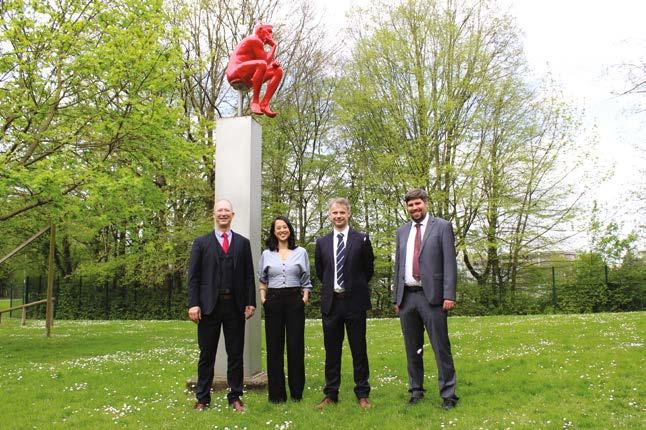
* Since February 2021, the Institute for European Studies (IES) is part of the Brussels School of Governance (BSoG) alliance. Hence, in this publication, the Institute for European Studies is sometimes referred to as Brussels School of Governance or BSoG.
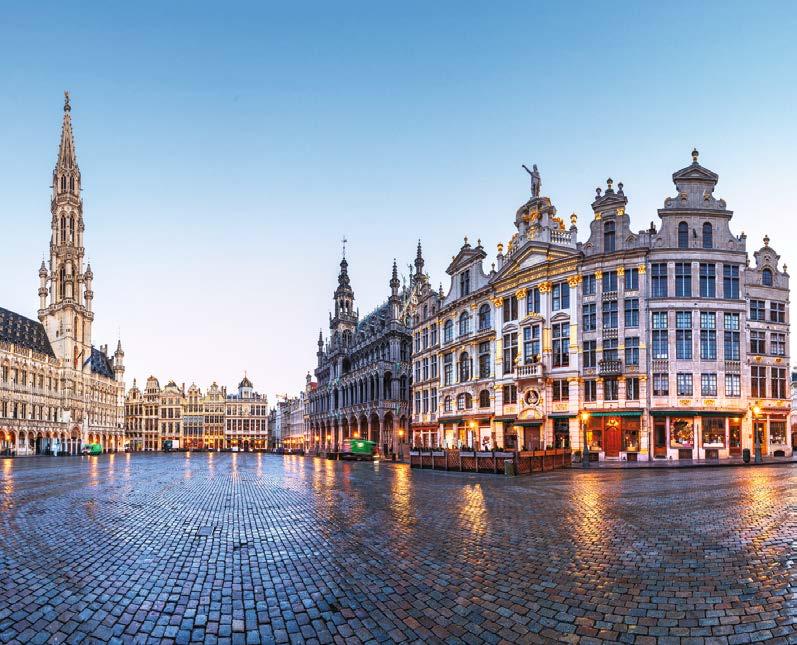
Since 8 January, the world as we know it has changed dramatically. Not that this comes as a great surprise to those that have been following global politics for a while, yet the speed at which the international liberal order and its legal framework are deteriorating is unprecedented and was not anticipated. International cooperation seems to make way for individualism and protectionism, while the trade barriers that we have been tearing down over the past eight decades seem to reinstate themselves in a seemingly effortless fashion.
And yet cooperation is what we will need if we are to cope with the effects of climate change, with solving the increasing need for energy, with finding a way to have sustainable growth. Cooperation is key in securing a peaceful Europe, in building a joint European military force, in battling disinformation and creating a safer environment. Cooperation will be much needed to deal with the migration streams that are bound to continue to head our way in view of war, climate change and economic decline.
The above describes exactly the issues that are studied at the Institute for European Studies. With three ERC grants and numerous Horizon Europe and prestigious FWO projects, the IES is delivering timely and indispensable research, not only for scholars and academics, but also for policy makers and the general public. With expertise from all over the globe, it has established itself as the excellence hub for research on security, migration, sustainable development, circular economy, and digitalisation, and has become even more relevant than the year before.
It is with great pride that I can present this annual report that gives an overview of activities of 2024 of which the range and impact cannot be overstated. With over 150 media appearances, this means that almost every second day of the year one of our scholars is reaching out to the world to communicate the results and the factual information of the nearly 100 different research projects we are currently running. With nearly 130 staff members, the Institute grew further to host a growing number of students and PhD scholars.
Sustainable growth, however, is not only a matter of world politics; it is also at the heart of our very institute. A growing number of students, research projects and output also means growing pressure and stress on existing staff, who have nevertheless been coping with these growing pains in an admirable fashion. I pay tribute to the resilience of our excellent staff who have, each in their field and capacity, been giving the best of themselves to keep everything working smoothly while relentlessly striving for excellence – a quest that has paid off in 2024 and that will continue to solidify in the years to come. In this way, I am convinced that the IES will continue to contribute to a better understanding of global issues, and thus to a better world, irrespective of the forces that seem to be wanting to change it.
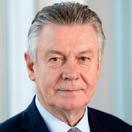
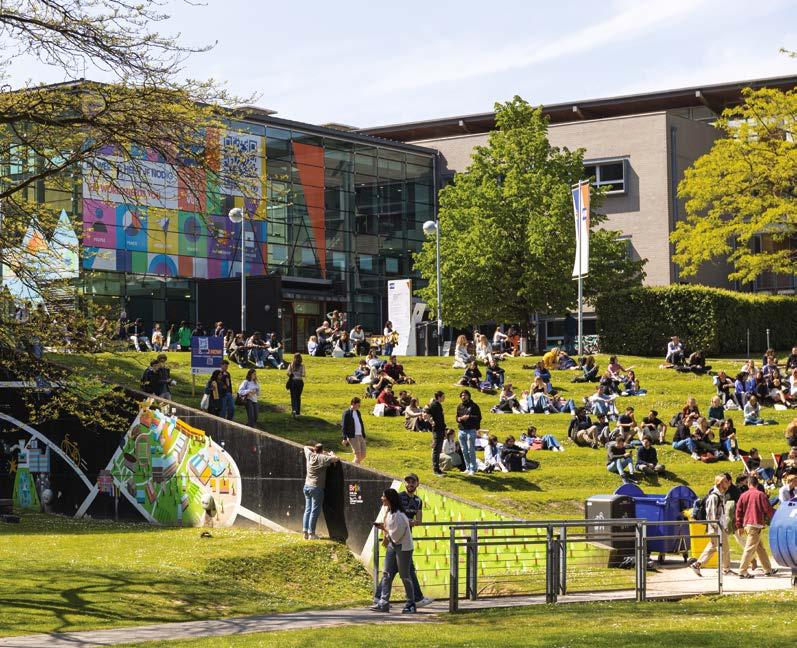

After more than 23 years, the Institute for European Studies has not only become a household name within the VUB, it has also become a valued player on the Flemish and international stage. Under the brand name ‘Brussels School of Governance’, it has raised its profile even further, especially in the past five years, and this has been very beneficial to the IES. In 2024, the Institute was awarded another prestigious ERC (European Research Council) grant, which means that the Institute is currently conducting three ERC projects. They complement the host of 94 other projects that the Institute's 127 employees are working on. The IES has once again made progress in the past year in both research and education, which has led to a very positive report from the Commission that is charged with evaluating our work in recent years for the Flemish Higher Education Agency and the Minister of Education.
The relevance of the projects the IES works on cannot be overstated. For example, the new ERC project on geopolitics and technology in the 21st century is a very sensitive political agenda item. It perfectly complements the other ERC project that started last year on the geopolitical rivalry between the EU, China and the United States – a topic that has become extremely ‘hot’ since the inauguration of a new president in the US.
But the IES is also among the top international institutes in the fields of the environment, the circular economy, digitisation and migration. The ERC mentioned in its annual report that the IES project Curiae Virides is among the most impactful and transformative studies of the past two years. Curiae Virides focuses on the transformation from humanitarian to ecocentric law and is the Institute's third ERC project. Only one other Belgian project was also honoured in the ERC report. In the field of migration, IES researchers won a prestigious and internationally recognised ‘best paper award’, while in the same field of research, our scholars were also awarded major (FWO) projects. This also applies to research into digitisation, fake news and internet governance and artificial intelligence, and in fact holds true for all policy areas in which the IES is active. It is not without reason that the VUB is listed in the top 20 of the most successful universities in obtaining European projects in the past year. The IES's contribution to this ranking is considerable.
It is also clear that research at the IES is bearing fruit in other areas. Of the 127 IES employees, there are some 44 doctoral students, and this year too, this led to several successful defences. In 2024, IES researchers Aslak Veierud Busch, Omar N Cham, Xiuling Ye and Laura Vansina obtained their doctorates. They all now bear the title of Doctor of Political Science.
In addition, the research and expertise of our staff led to more than 180 academic publications and more than 150 enquiries (almost 3 per week!) from the Flemish and international media to provide policy-relevant background information on current issues.
In the field of education, the IES can boast the biggest programme reform since its inception: the Institute's two MaNaMa (postgraduate) programmes, the LLM in International and European Law and the MSc in European Integration, together with the Postgraduate Certificate on European Policy-Making, will be structurally reformed into three interrelated and multidisciplinary programmes that will be offered as evening programmes. Some of the reforms will not take effect until the 2025-2026 academic year, but the foundations for the changes have
already been laid and some of them have already been implemented in 2024. This has led to an increased number of graduates (40 Master's degrees awarded in 2024, compared to 35 the year before). Partly due to an adjustment of the enrolment fees – which were also harmonised – this has already led to a near doubling of the total number of students for the current academic year. The collaboration with Vesalius College under the name Brussels School of Governance has also borne fruit here, as it now ensures a better flow of students, while courses and support staff can be exchanged.
On 1 January 2024, Florian Trauner became the new Dean of the Institute. He thus followed in the footsteps of Luc Soete, who had led the IES and Vesalius College for the past four years. Building on the foundations that Luc was able to lay in recent years, Florian is continuing to expand the Institute as the first elected Dean of the IES. Together with the – also elected – Vice-Dean of Education Sven Van Kerckhoven, he is in charge of the academic policy of the Institute. Perhaps partly due to this increased base of support, many innovations have been implemented.
The umbrella organisation Brussels School of Governance, under which both the Institute for European Studies and Vesalius College operate, has been in existence for 5 years. This alliance was set up to harmonise the English-language education on offer in European and International Studies and to combine the research potential of the professors from Vesalius College with that of the IES, in order to create better synergies. In addition, the alliance offered the opportunity to rationalise or at least make better use of the secretariats of both institutions. For example, the employees of the various central services work together to guarantee better and more optimised service provision. The technical aspects of this collaboration still require work: the different registration and student follow-up systems mean that complete harmonisation/optimisation is not yet possible. However, the services in the areas of HR, finance, IT, logistics, general (and research) support, events and marketing/student recruitment are fully integrated. Nevertheless, a joint board, joint management and joint secretariat contribute to a stronger service and a rationalisation of efforts and costs.
The good relationships with our other most important partners were also perpetuated in 2024: we organised joint educational or research activities with UNU-CRIS, the Diplomatic Academy in Vienna, Warwick University and the University of Southern California. Better relationships were also established with other EUTOPIA partners, such as NOVA Lisbon. The flourishing Japan Chair and Korea Chair were also continued.
IES is also doing well financially. As announced in the budget, part of the 2023 surplus will be used this year to complete current projects or start new ones. Operationally, the Institute is therefore making a small profit (although it shows a loss in the accounts due to the inclusion of these reserves). The intention is to continue to operate at breakeven in the coming years, although the now sharply increased personnel costs prevent us from developing long-term growth strategies. Although the government funding of the IES partially follows this indexation, such linkage only occurred after the largest increases during and shortly after Covid.
The IES is at a pivotal moment in 2024: the Flemish government, through the Minister of Education, will soon have to decide on the modalities for the renewal of the management agreement (which ends in 2026). To this end, a group of independent experts came to ‘visit’ the IES, resulting in a very positive final report. We are therefore looking forward to a renewed collaboration that can further strengthen the image of the IES (and consequently of Flanders) in the world.
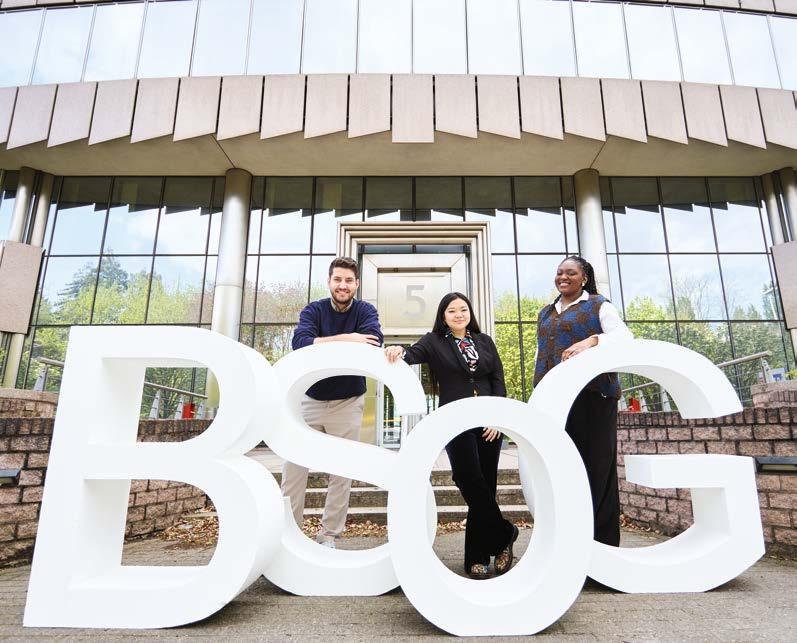
The Brussels School of Governance (BSoG) achieved one of its strongest student intakes to date in the 202425 academic year, reflecting the success of strategic reforms and sustained efforts in student recruitment. The Institute for European Studies (IES) programmes - LLM, EuroMaster, and the Postgraduate Certificate in European Policy-Making - saw a remarkable increase in enrolment. The EuroMaster welcomed 68 students (+13), while the LLM saw 35 students enrolling (+22), and the PGC 27 (+6).
This growth is largely attributed to the successful reform of the LLM programme, which transitioned to an evening format in September 2024. Additionally, the growing reputation of BSoG - established four years ago - has enhanced its visibility among prospective students. The school's continued investment in marketing and student recruitment has also played a key role in driving these positive results.
Beyond the IES programmes, Vesalius College, which is part of BSoG, saw record-breaking student numbers in both its BA and MA programmes, further reinforcing BSoG’s position as a premier educational institution in Brussels.

On 25 October 2024, the Brussels School of Governance (BSoG) underwent its five-yearly government audit, a critical evaluation assessing the Institute for European Studies' (IES) performance in education, research, and services. The audit committee's initial feedback was highly positive, recognising IES’s impressive achievements across its three core pillars. The committee praised the Institute’s strong project acquisition, its ability to swiftly adapt during the COVID-19 pandemic, and its extensive offering of academic services. The involvement of policymakers in the curriculum and the personalised, small-scale teaching approach were highlighted as particular strengths. The committee also expressed confidence in IES meeting its target of maintaining an average of 50 students per year, thanks to recent educational reforms.While acknowledging these successes, the committee also identified challenges related to managing growth, ensuring staff well-being, and fostering further cooperation between research centres. These insights provide valuable input as IES continues to evolve and prepare for the next government agreement.
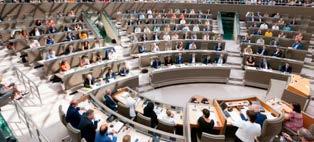
On 1 January 2024, Luc Soete handed over the Deanship of the Brussels School of Governance to his colleague Florian Trauner, the previously elected Vice-Dean for Research at the BSoG. This hand-over marked the start of a new chapter in the story of the BSoG. Luc Soete was in charge of the School, and its two constituent members Institute for European Studies and Vesalius College, since October 2019. Among his many accomplishments are the swift transition to online and later on hybrid teaching methods in the first phase of the pandemic, the creation of the Brussels School of Governance alliance in February 2021, the launch of a new Winter School, and a programme reform of the LLM. On the research front, he successfully oversaw the re-organisation of the BSoG’s research activities into four Centres, which have each grown and attracted quickly new international research talents as well as a significant number of highprofile projects, including three ERC grants.
2024 was a very fruitful year at the IES-BSoG regarding new PhD degrees. Laura Vansina, Xiuling YE, Omar N Cham and Aslak Veierud Busch all successfully submitted and defended their doctoral thesis. On 1 March 2024, Aslak Veierud Busch was the first in the year to defend his PhD thesis entitled “In Pole Position? The Construction of Regions and the EU’s Role in the Arctic”. On 11 June 2024, Omar N Cham successfully defended his PhD thesis entitled “Understanding Narratives on EU Migration Control Policies in West Africa: The Case of The Gambia”. On 10 September 2024, Xiuling YE successfully defended her PhD thesis entitled “Factors associated with prejudicial attitudes toward immigrants in China: an exploration of sociodemographic variables”. And finally, on 30 September 2024, Laura Vansina successfully defended her PhD thesis entitled “Putin’ the Past to Work: Historical narratives in Russia’s policy making (2000-2022)”.

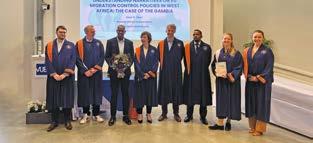
In 2024, the Brussels School of Governance (BSoG) successfully restructured its LLM in International and European Law, transitioning it into an evening programme. This strategic shift, implemented in September 2024, led to a significant increase in student enrolment by offering greater flexibility for professionals and working students. Building on this success, BSoG also finalised plans for the most ambitious educational reform in its history, set to launch in September 2025. This comprehensive overhaul will integrate and enhance all postgraduate programmes—LLM, EuroMaster, and Postgraduate Certificate in European Policy-Making—aligning them more closely with the school’s research priorities and European Union policy challenges. The reform introduces interdisciplinary specialisations, improved flexibility through online modules, and stronger connections to the professional field. These developments will ensure that BSoG remains at the forefront of policy education in Brussels, providing students with a curriculum that is both academically rigorous and professionally relevant.
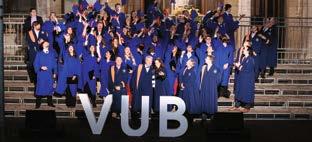
In the autumn of 2024, the Brussels School of Governance proudly announced that LLM professor Ben Smulders was appointed as a judge at the Court of Justice of the European Union. His six-year term began on 7 October 2024 and will run until 6 October 2030. Professor Smulders has been teaching International and European Competition Law in our LLM in International and European Law programme since 2007. His appointment to one of the highest judicial bodies in the EU highlights the exceptional calibre of faculty at BSoG, ensuring that our students benefit directly from the insights and expertise of leading practitioners. Learning from such top-tier professionals equips students with unparalleled real-world perspectives and a deeper understanding of the legal complexities shaping the EU landscape. Notably, BSoG’s commitment to academic excellence is further reflected in the achievements of our alumni, with Eugene Regan, a graduate of our LLM programme, currently serving as President of the Fifth Chamber of the Court of Justice of the EU.
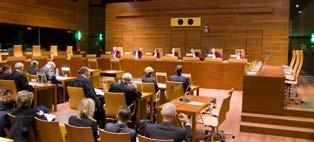
Source: Court of Justice of the European Union
On 1 January 2024, the Brussels School of Governance (BSoG) welcomed its third ERC-funded project, Competition in the Digital Era (CODE): Geopolitics and Technology in the 21st Century, led by Antonio Calcara. This project examines the strategic competition between China, the United States, and Europe in key technological sectors: semiconductors, cloud computing, and space. CODE integrates insights from international relations, political economy, and innovation studies to develop a comprehensive theory of technological competition. It employs both qualitative and quantitative methods, including market analysis, patent databases, network analysis, and machine learning. The project will run for five years and aims to establish a multidisciplinary research group to explore critical technological challenges.This marks the third ERC project hosted at BSoG, following the successful grants awarded to Liliana Lizarazo Rodriguez and Luis Simón. Their achievements across diverse research domains reinforce BSoG’s growing reputation as a dynamic research environment, attracting top-tier scholars and advancing knowledge across multiple disciplines.

The Brussels School of Governance proudly congratulates Ilke Adam and Omar N. Cham on winning the 2024 Regional Studies Association Best Paper Award for their research published in Territory, Politics, Governance. Their award-winning paper, The politicization and framing of migration in West Africa: transition to democracy as a game changer?, highlights our School’s dedication to impactful, policy-relevant research and interdisciplinary teaching.This recognition underscores the significance of their work in shedding light on migration governance in West Africa. Following their first publication, Ilke and Omar continued their research with a follow-up article in Governance, which is available in open access. This second paper delves deeper into how political actors in West Africa frame their support or opposition to cooperation on deportation, offering valuable insights into the region's perspectives on EU migration policy externalization.Their success further reinforces BSoG’s position as a leading hub for migration research, fostering critical scholarship that informs policy debates.
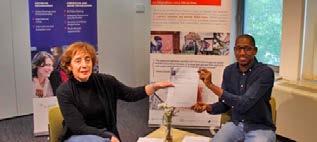
SENIOR POSTDOCTORAL FELLOW
The Brussels School of Governance (BSoG) is proud to announce that postdoctoral researcher Clément Perarnaud has been awarded the prestigious FWO senior postdoctoral fellowship for the period 2024-2027. Clément, who is based at our Centre for Digitisation, Democracy and Innovation (CD2I), will conduct a groundbreaking research project titled Negotiating states’ sovereignty over the Internet. His work will explore how new digital sovereignty policies influence the development of global Internet standards, focusing on the processes within the Internet Engineering Task Force (IETF). The FWO (Research Foundation Flanders) fellowship supports researchers in further developing their academic careers by providing financial resources and opportunities for additional training and international mobility. This achievement not only highlights Clément’s academic excellence but also enhances the learning experience of our students, who benefit from exposure to cutting-edge research conducted by top scholars.

The Brussels School of Governance’s Curiae Virides project, led by Professor Liliana Lizarazo, was one of only two projects in Belgium to receive dedicated coverage in the European Research Council’s (ERC) Mapping ERC Frontier Research report on Transformative Change for a Sustainable Future. Among the 312 ERC-funded projects awarded between 2014 and 2023, only two initiatives in Belgium received dedicated coverage. The Curiae Virides project led by Prof. Liliana Lizarazo is highlighted in Part 3.1 of the report, recognising its innovative contributions to sustainability and transformative research. Curiae Virides is a project embedded in the BSoG’s Centre for Environment, Economy and Energy (C3E). It explores the shift from human rights litigation to ecocentric litigation. It envisions activist courts bridging ecological governance gaps and offering justice to victims of transnational ecological harm. Beyond this achievement, Curiae Virides was very active in 2024, contributing to international discussions on climate litigation. The project played a key role in workshops in Bogotá and Arusha, focusing on legal strategies for environmental justice.
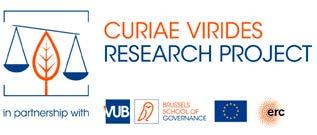

• Updating the IES research agenda around four new research centres: a Centre on Digitalisation, Democracy and Innovation; a Centre on Environment, Economy and Energy; a Centre on Migration, Diversity and Justice; and a Centre on Security, Diplomacy and Strategy.
The preparations for the creation of these four research centres, and the update of the IES research agenda around them, started in late 2020. The four new centres became operational shortly afterwards. Their public launch towards their wide range of stakeholders coincided with the launch of the Brussels School of Governance (BSoG) on 9 February 2021, which is the alliance between the Institute for European Studies and Vesalius College.
Since then, each of these centres has developed its own sub-brand, under the umbrella of the BSoG, with accompanying publication and project acquisition strategies. This has resulted in a significant expansion of the project portfolio.
• Maximising the intrinsic synergies between the educational offers of the IES and the VUB’s ES and RC faculties, Vesalius College, and the partners in the European university alliance, EUTOPIA.
The creation of the Brussels School of Governance in February 2021 has significantly increased the synergies between the educational offering of IES and Vesalius College. Various elements of both institutions’ programmes were aligned. Since then, both faculty and support staff across IES and Vesalius work as one integrated team.
As regards the VUB’s ES and RC faculties, a process of streamlining the complementarity in MA-level programmes was initiated. In 2024, we implemented a reform of the IES LLM curriculum. Also in 2024, we started preparing the a substantial reform of the EuroMaster programme (new curriculum will be rolled out as of Fall 2025). The new curriculum will bring it even closer in line with the IES research centres and will link it up more closely to the ESled MSc in European and International Governance (in which IES staff act as service providers). 2024 saw frequent collaboration with the EUtopia network, e.g. with the joint IES-Eutopia simulation exercise during the fourth edition of the IES’ Winter School in February 2024, two PhD bursaries financed by EUTOPIA, and EUTOPIA member Warwick University acting as an important partner in our EUIA conference cycle (next edition: May 2025).
• Within each research centre, the aim is to deliver one doctorate per year, and therefore to start a total of at least 20 doctoral projects over the full management period (at least 10 of which are to be launched using Flemish government funding).
In 2024, the IES delivered a total of four doctorates, two of which were delivered by the Centre for Migration, Diversity and Justice, one by the Centre for Environment, Economy and Energy, and one by the Centre for Security, Diplomacy and Strategy.
• Achieving at least one large-scale research project (e.g. ERC, Horizon Europe or Chair) per centre.
In 2024, each of the four research centres was involved in at least one, and in most cases several, large-scale research projects. Examples include an ERC-funded project on US-China rivalry and its implications for Europe, led by professor Luis Simón (CSDS); another ERC-funded project on geopolitics and technology, led by professor Antonio Calcara (CSDS); yet another ERC-funded Curiae Virides project that conceptualises the transformation of human rights litigation into ecocentric litigation, led by professor Liliana Lizarazo Rodriguez (C3E); the GreenDeal-NET project, a Jean Monnet Network about the EU’s Transition towards climate neutrality and sustainability (C3E); the Chair in Digital Sovereignty funded by Microsoft (CD2I), the Horizon Europe funded TITAN project aimed at intelligent coaching of citizens against disinformation (CD2I), the H2020-funded BRIDGES project aimed at assessing the production and impact of migration narratives (CMDJ), and the Whole-COMM project, exploring the integration of post-2014 migrants in small and medium-sized towns and rural areas in 8 EU and 2 non-EU countries from a whole of community perspective..
• Annually: publication of an average of 50 scientific publications with peer review, one to two books and 20 policy papers.
IES-affiliated scholars collectively published a total of 3 books, 90 academic journal articles and 28 book chapters - amounting to 121 peer-reviewed publications, and 39 policy reports. For a detailed overview, see our list of 2024 publications in the annex. Full and multiannual bibliographical data is stored in the researchportal.vub.be – thus permanently accessible – and automatically synced with ORCID and the FRIS Onderzoeksportaal. With our own policy report outlets (Centre-led) Policy Briefs as well as In-Depth long read formats, we ensure that our cuttingedge research findings are made available in open-access formats and tailored to a diverse audience including policymakers and media as well as academics.
CENTRE FOR DIGITALISATION, DEMOCRACY AND INNOVATION
• Competition and co-operation in digital policymaking – The EU as a global actor, Orsolya Gulyás, November 2018-September 2024
CENTRE FOR ENVIRONMENT, ECONOMY AND ENERGY
• Marta Paricio Montesinos – Corporate accountability in conflict areas, October 2024 – September 2028
CENTRE FOR MIGRATION, DIVERSITY AND JUSTICE
• Governmental Responsiveness to Black Lives Matter in Europe, Fọláṣadé Ajayi, February 2020 – March 2024
• The power to deem safe. The implementation of EU safe country policies," Gaia Romeo, October 2021-September 2025
• Borderline Justice: Effective remedies for forced migrants at Europe’s borders, Katharine Woolrych, October 2024-September 2028
CENTRE FOR SECURITY, DIPLOMACY AND STRATEGY
• Explaining military innovation in military applications of artificial intelligence, Maaike Verbruggen, November 2017 – April 2022 (project temporarily suspended)
• Great Power Competition in the Indo-Pacific: the Mekong Region, Fabio Figiaconi, October 2020 – September 2024
• The protégé rearmament dilemma: balancing between autonomy and alliance cohesion, Lotje Boswinkel, October 2022 - September 2026
• The role of the changing character of war for the US-led alliance system, Octavian Manea, October 2021September 2025 (as of October 2024)
• Competition and co-operation in digital governance: the EU as a global actor, Orsolya Gulyás, November 2018ongoing
• The relation between privacy, data protection and identity, Ana Fernandez Inguanzo, November 2019 - ongoing
• Meaningful participation in global and regional multistakeholder institutions: the case of the Internet Governance Forum, Nadia Tjahja, September 2020 – ongoing
• Prevention of securitization of contentious content through architectural interventions on online platforms, Nathalie Van Raemdonck, September 2020 – June 2025
• How do social media platforms afford content curation? Understanding user agency over their media diets. Carlos Entrena, June 2022 - May 2026 (Co-financed by European Commission Joint Research Centre)
• Human personhood in the age of automation, Samuel Johns, June 2022 – April 2024 (researcher passed away)
• Digital Democracies in peril: a post-structuralist lens on disinformation and individual agency online, Samuel Cipers, October 2022 – September 2026 (Financed by EUTOPIA)
• Digital Sovereignty: symbolic interactionist role theory and norms of (digital)-sovereignty, Sophie Hoogenboom, March 2023 - February 2027
• Causal mechanisms behind the propagation of social media narratives in the Ukraine, Dmytro Bukhanevych, October 2024 – September 2028
• Public participation in European Climate Governance, Lea Schewe, April 2024 – March 2028
• Access to Remedy in Environmental Matters: Do Victims of GVC-Related Environmental Damage Have Access to Effective Remedies? An Empirical and Comparative Analysis of the Effectiveness of Remedy Obtained through Transnational Litigation. Ludmila Cieszkowsky Elias, November 2022 - October 2026
• Theoretical and Empirical Foundations of Value Chain Due Diligence in Transnational Ecological Conflicts, Joao Teixeira de Freitas, March 2021 – February 2025
• The integration of climate and energy security objectives in the EU's external energy policy, Marco Giuli, September 2019 – August 2023 (project still ongoing in 2024)
• EU Policy Instruments on Sustainable Trade, Simon Happersberger, FWO PhD bursary, November 2022 –October 2026
• Extended Producer Responsibility for a European Circular Economy -- Antti Jukka - Joint PhD with University of Eastern Finland October 2023 – September 2027
• Analysis of stakeholder’s role in ecocentric litigation using Social Network Analysis (SNA) and Qualitative Comparative Analysis (QCA) Daniel Leguizamon Alejo (ERC Str. Grant 949690 Curiae Virides) - December 2022 - November 2026
• Product-Service Systems for the Circular Economy: Policy Implications under the WTO Law, Eleanor Mateo (various projects) December 2017 – October 2025
CENTRE FOR MIGRATION, DIVERSITY AND JUSTICE
• Governing religious diversity at the local level in Europe: moving beyond the nationalist and localist theories, Louise Hantson, FWO bursary, November 2023 - October 2027.
• Tackling the ethnic gap in Higher Education: the role of Diversity, Equity and Inclusion policies, Amalia de Roover, FWO bursary, January 2025 – January 2029.
CENTRE FOR SECURITY, DIPLOMACY AND STRATEGY
• What does China want? Technology and great power competition in Europe, Ludovica Meacci, October 2022September 2026
• Industrial Policy in the Age of Complexity: Emerging Technologies and the International Competition nin Commercial and Defence Markets, Ivan Zaccagnini, October 2022 - September 2026 (joint PhD with Luiss Guido Carli University, Rome)
• Green Ties and Iron Fists: What aims and How China Adapts to the EU’s geoeconomic push?, Hong-Cheng Hsiao, October 2023 - September 2027
• Technology Catch-Up and Power Transitions: A Network Perspective, Riccardo Bosticco, October 2024September 2028
• Spillover Weaponization: A Framework for Analyzing Technological Interdependence in International Relations, Mahmoud Javadi, October 2024 - September 2028
• Competing at Cooperation: The US-China Race to Influence Third Countries through Space Diplomacy, Thao Pham, October 2024 - September 2028
01/01/2024 - 31/12/2026
Funding organisation: VUB | OZR Grant
The ‘House of Sustainable Transitions’ is a VUB Large Research Group, involving the Mobilise Mobility and Logistics Research Group, Centre for Environment, Economy and Energy (C3E), Centre for Digitalisation, Democracy and Innovation (CD2I) and Centre for Migration, Diversity and Justice (CMDJ). The mission of HOST-LRG is to advance the transition to a green, digital and just society through a deep understanding of the processes, policies and actors involved in making change. We believe this can be achieved through a coherent, well-defined research agenda that examines interlinkages across policy fields and sectors, mobilises actors and supports policymaking. By advancing sustainability transitions, we hope to create a more just and equitable world that can meet the needs of the present without compromising the ability of future generations to meet their own needs. Our three research lines, "Analysing sustainability, mobilising people, governing the change," reflect this commitment to transition to a more sustainable society and a way to structure our research lines within the larger group. These research lines bring together the different tools and research approaches to answer the following questions: what can be called sustainable? (analysis of sustainability), how do we let people participate and engage? (mobilising people), and which policy approaches are necessary to govern the change? (governing the change). Within BSOG, Trisha Meyer leads the group’s research activities, while Basak Van Hove provides project management and
Data Management Plan (DMP) support. Stijn Van der Perre facilitates collaborative research by identifying funding opportunities and engaging potential partners to develop new projects. On research initiatives, Orsolya Gulyás (CD2I) explores the intersections of digitalization and sustainability, while Stijn Van der Perre (C3E) examines the links between sustainability and (industrial) transition policy across governance levels.
Kata Dózsa (C3E) submitted an FWO project proposal, and Omar N. Cham (CMDJ) continued the work of former CMDJ-HOST postdoc Honghui Pan, analysing the social dimensions of sustainability, particularly in relation to migration. In 2024, this project kicked off and our team across the three research centres involved focused on (1) research coordination and support, including the creation of a Data Management Plan, (2) funding and proposal development, in particular exploring EU-funded project opportunities, and (3) network engagement and communication.
October 2021 – October 2026
Funding organisation: Joint Research Centre | European Commission
The importance of science-based evidence for policy making is increasingly recognised by decision makers and finds resonance in research and academia. In order
to enhance the science-policy link, the Joint Research Centre (JRC) of the European Commission conducts collaborative doctoral partnership (CDP) schemes with higher education institutions. Vrije Universiteit Brussel replied to the call for expressions of interest in the fields of ‘digital governance' and ‘secure and sustainable supply of raw materials for strategic value chains’ and was selected by the JRC. Within this project, the Centre for Digitalisation, Democracy and Innovation (CD2I) at the Brussels School of Governance, the Centre for Studies in Media, Innovation and Technology (SMIT) and the HUMAINT project of the Digital Economy Unit, Joint Research Centre site in Sevilla co-supervise a doctoral student (Carlos Entrena) in the field of digital governance, on the topic of trustworthy artificial intelligence. The collaborative doctoral partnership is co-funded by JRC and VUB and runs for a period of five years (2021-2026). The doctoral student entered the third year of his PhD in June 2024. Carlos is in the process of publishing his first academic article, which underlines his theoretical framework—and provides an empirical analysis—on how TikTok interface shapes how users consume content on the platform. He is also collecting data for a second academic article, exploring how users consume political and social issues content on TikTok. During 2024, he has presented his ongoing work at the Social Media + Society conference and Association of Internet Researchers conference. He also returned to VUB after a half a year stay at European Commission Joint Research Centre in Sevilla. In December 2024, a second vacancy for a doctoral student within the CDP was launched.
October 2021 – March 2024
Funding organisation: European Health and Digital Executive Agency | European Commission
This project sets up a Belgian and Luxembourgish hub for research on digital media and disinformation (EDMO BELUX). It brings together an experienced and extensive network of fact-checkers, media, disinformation analysts, media literacy organisations and academics to detect, analyse and expose emerging harmful disinformation campaigns. Through rapid alerts in the network, fact checks, and investigative reporting, we reach first responders to disinformation (media, civil society, government) in order to minimize the impact of disinformation campaigns. In addition, through media literacy campaigns, EDMO BELUX raises awareness and builds resilience among citizens and media to combat disinformation. Finally, the hub embeds its disinformation monitoring, analysis, and awareness into a multidisciplinary research framework on the impact of disinformation and platform responses on democratic processes. The first iteration of the project (EDMO BELUX) concluded in March 2024, succeeded by the second round (EDMO BELUX 2.0) in May 2024.
May 2024 – October 2026
Funding organisation: European Health and Digital Executive Agency | European Commission
EDMO BELUX 2.0 is a multidisciplinary hub that brings together fact-checkers, media, disinformation analysts, media literacy organisations and academics
to monitor and mitigate disinformation in Belgium and Luxembourg. It broadens and deepens the first iteration of this multinational and multistakeholder network, building on a strong track record of detecting, analysing and exposing emerging harmful disinformation relevant to the Belgian and Luxembourgish context. Through extensive communication and community efforts, we reach first responders to disinformation (media, civil society, government) and interested audiences. With our fact-checks, investigative reports and monitoring studies, we minimise the reach and impact of disinformation. Further, EDMO BELUX media literacy campaigns, interventions and trainings raise awareness and build resilience among citizens and professionals, enhancing understanding of media processes and disinformation flows. Finally, through its analysis of the impact of disinformation and platform responses, the hub supports a multidisciplinary community seeking to safeguard democratic processes in Belgium and Luxembourg. VUB and UCLouvain share leadership in EDMO BELUX 2.0. The first months of the project in 2024 were focused on establishing co-leadership agreements, completing project management deliverables and developing an enhanced communication strategy. Recent activities included the publication of 130 factchecks, focus pieces, and educational resources, along with organising multiple events such as lunch lectures, training sessions, and networking events. Additionally, ongoing efforts in platform policy monitoring involved participation in EDMO working groups and joint research initiatives on disinformation and political advertising transparency. Two research articles were published, and three newsletters were released to inform stakeholders.
November 2022 – October 2025
Funding organisation: European Commission | Jean Monnet Module, Funding also provided by The Flemish Department of Education and Training
The Summer and Winter Schools on European Union Policy-Making are intensive two-week study programmes with a strong multidisciplinary character, developed and delivered by the Brussels School of Governance at the Vrije Universiteit Brussel, in close cooperation with the Vienna School of International Studies and the University of Vienna. The chair holder is the convener and academic coordinator of the summer and winter schools, whose passion for teaching finds a perfect outlet in these hands-on intensive study programmes and whose research on digital governance and participation intersects closely with the teaching on current challenges in today's EU. The programmes provide a ‘crash course’ in European Union PolicyMaking, with a unique topical focus. The focus area of the summer course is civil rights in today's EU, while the winter school explores digital rights. The summer school is an in-person course, in which students spend one week in Brussels and one week in Vienna. This winter programme is an online study experience with special attention to social interaction. The Jean Monnet Chair organised its Summer and Winter Schools as expected in 2024. More details can be found in the education section of the annual report.
March 2022 – February 2025
Funding organisation: European Commission | Jean Monnet Module
The Jean Monnet Module DESTINY focuses on advanced level university education in the sphere of Digital European Sovereignty. It brings together theoretical discussions on the changing digital world order and practical examples of how the EU addresses this transformation through the development of a stronger digital ambition, through engagement exercises and in-depth policy research. In 2023, this module received official approval from the university’s Education Council, and became part of the MSc in European Integration in academic year 2023-2024. In the second semester of that academic year, and for two years after this, we bring this field of research and policy to the classroom in ways that will help students specialising in European policymaking become aware of the specific challenges of Digital sovereignty for the EU, with its diversity of opinions.
September 2023 – August 2025
Funding organisation: European Commission | Jean Monnet Module HORIZON MSCA Postdoctoral Fellowships
Digital platforms, such as Facebook and Twitter, have long touted themselves as defenders of freedom of expression, yet their content moderation rules have faced global criticism, amongst others for failing to tackle authoritarian repression of dissident voices. Government trolls successfully run malicious reporting campaigns that result in the platforms’ removal of
activists’ posts and accounts. Meanwhile, civil society under authoritarianism lacks means of legal recourse and can only engage in international advocacy to urge social media companies to implement safeguards. The research has two main objectives. First, the project will build and test a theoretical model of pro-democracy platform advocacy, based on original evidence from Asian pro- democracy movements and their advocacy toward social media platforms. Second, the findings will be turned into two open-access academic articles and three applied innovations, including a best practice guide for pro-democracy activists, a set of policy recommendations for social media companies, and a digital advocacy resource for social media users. In 2024, MSCA postdoctoral fellow, Mai Van Tran, collected and conducted mixed methods analysis of 1.3 million social media posts (Facebook, TikTok, and Telegram) and expert interviews with 40 digital rights advocates and activists (representing marginalised dissidents in Myanmar, Thailand, and Cambodia, including female, LGBTQ+, ethno-religious minority, and rural activists). Beside research presentations at six academic conferences, one article was submitted to the openpublishing platform Open Research Europe and another chapter to an edited book manuscript on Asian youth activism under contract with SUNY Press. A six-month secondment with WITNESS started in October 2024.
March 2023 - February 2028
Funding organisation: European Commission | European Research Executive Agency (Horizon Europe) With an interdisciplinary approach and an innovative methodology that combines qualitative and quantitative
methods, ReMeD gathers, analyses, compares and contrasts data on professional journalists, alternative media content producers and citizens operating in technologically mediated configurations, and on the media organisations, market structures and national and international regulations that underpin media production, circulation and consumption in the contemporary media landscape. ReMeD works closely with all stakeholders involved in order to coproduce high-impact knowledge and solutions that will contribute to the creation of resilient democratic media that reinvigorate, strengthen and uphold democracy, the rule of law and fundamental human rights. A number of research activities are underway, while several presentations took place in international and national epistemic and policy making conferences and workshops and the first publications are coming up. The first advisory board and stakeholders meeting took place in February 2024 in Brussels. The second one is planned in February 2025 in Prague, with the participation of Věra Jourová, former Vice-President of the European Commission for Values and Transparency dealing with issues of democracy, rule of law, media pluralism and fight against disinformation, Matjaž GRUDEN Director of the Directorate for Democracy, Council of Europe, Lubos Kuklis, European Commission DSA Team, and other stakeholders.
S.HI.E.L.D vs Disinfo: Students’ of Higher Education critical digital Literacy Development against Disinformation
October 2022 - September 2025
Funding organisation: European Commission | ERASMUS+
The rapid recent changes in communication modes worldwide with the broad use of social media and new technologies, and the development of new strategies, means, or techniques for creating fake news, click baiting content, deep web videos, etc. have resulted in the wide spreading of disinformation by shaping it to a contemporary global phenomenon with serious and multiple consequences. This Consortium researches critical digital literacy education, generating theoretical frameworks and implementing practical solutions for new courses (new teaching/learning/training strategies, material, scenarios, activities, etc) for the European Higher Education area. In 2024, we implemented the SHIELD vs Disinfo curriculum in two Vesalius College courses: CMM234 (Dis)information Literacy and CMM251 Political Communication. Additionally, BSoG started leading WP4 – to design, curate and write an Educators e-toolkit to be launched at the concluding conference in June 2025.
SoMe4Dem: Social Media for Democracy –Understanding the Causal Mechanisms of Digital Citizenship
March 2023 - February 2026
Funding organisation: European Commission | European Research Executive Agency (Horizon Europe)
Current diagnoses that democracy is in crisis at the beginning of the 21st century share a common argumentative reference point: the (implicit) reference to the dysfunctional constitution of the political public sphere which is currently undergoing structural change. The rise of social media platforms is considered as one of its main constituents. While social media make the public arena more open and thus more responsive, these platforms also lead to new mechanisms of
fragmentation and exclusion, an erosion of norms in public debate and a loss of trust in traditional institutions. The project reconsiders the diagnoses of this crisis by (1) providing better empirical evidence for the impact of social media on society with respect to political debates, (2) understanding the main causal mechanisms of this impact and (3) developing tools that improve the capacity of social media to contribute to the functioning of the public arena in a liberal democracy, i.e., deliberation, legitimation and the self-perception of the democratic subject. Research activities in 2024 focused on methodological questions of mining narratives from textual data, as well as broader questions of how social media relate to various manifestations of digital citizenship.
January 2023 - June 2025
Funding organisation: European Commission | European Education and Culture Executive Agency (Erasmus Mundus, Sport)
Integrity is the most fundamental value to sport. Integrity threats are broad, diverse and hugely significant, they can relate directly to sports competition, such as doping, or indirectly to sport competition, such as child protection within the broader sporting environment, in addition to others such as corruption, match fixing and bribery, it is clear that sport faces a very real and tangible threat to credibility. The Sport Transparency Index has been devised to help support integrity interventions at the most fundamental level. It will help by benchmarking sport stakeholders including clubs, leagues, national associations and international governing bodies using universally applicable and appropriate criteria to evaluate, compare and contrast them against basic integrity-related transparency indicators. In 2024,
the project team from VUB together with the project consortium members submitted the results of the first findings as a journal article.
September 2022 – August 2025
Funding organisation: European Commission | Horizon Europe
TITAN delivers an open, distributed and citizen engaging ecosystem that empowers citizens to conduct effective and efficient investigations for understanding whether statements at hand are true. AI-driven, intuitive and personalised ‘question-and-response’ interaction set the attention of the investigating citizen on the logical interpretation and critical assessment of the implied reasoning and arguments in the statement at hand while directing the citizen in the appropriate use of suitable fact-checking and media literacy tools and services. Intelligent coaching conversational schemes are personalised according to the investigating citizen’s profile, digital skills, media literacy skills, possible difficulties in thinking critically as well as the linguistic characteristics of the statement under investigation. At the end of such an ‘question-and-response’ interaction cycle, the citizen will have his/her critical thinking and media literacy skills advanced so as to better detect disinformation he/she may encounter in the future at scale. In 2024, TITAN project achieved several milestones and deliverables. We conducted the second iteration of D1.4, the Ethical and Legal Impact Assessment, ensuring evaluation of the project’s legal compliance and ethical impact. Additionally, we led the Transparency Taskforce, focusing on the design and addressing key issues related to the project’s landing page and design.
Furthermore, we contributed to advancing academic discourse by participating in the writing of a collaborative article.
CoDesign4Transitions: Sustainable Transitions through Democratic Design
January 2024 – December 2027
Funding organisation: European Commission | MSCA
Doctoral Networks
CoDesign4Transitions is a Doctoral Networks scheme within the Marie Skolodwska-Curie Actions (MCSA) of the European Commission. It offers positions and training for thirteen transdisciplinary Doctoral Candidates (DCs) at the intersection of co-design, design for sustainability, service and systems design, democratic innovation and climate transitions. The network comprises eight universities and fifteen Associate Partners. The DCs carry out original research in relation to three research objectives, at the intersection of co-design, design for sustainability, service and systems design, democratic innovation and climate transitions. DCs have two secondments in at least one host organisation, at least one of which is international. In 2024 all doctoral candidates were hired after a multi round selection process. At VUB, Ollie Bream McIntosh (DC10) started with a slight (visa) delay in January 2025. His doctoral research will focus on the design and use of civic technologies in the governance of European climate ‘missions', and will begin with a literature review into the typologies and affordances of these technologies. In summer 2025, Ollie will be seconded for 3 months to the Lisbon Council, a think tank here in Brussels, where he will shift his attention to developing descriptive frameworks for the governance of climate missions, as well as the role of design in these governance processes.
Digitally Aware Elections: conversations with digital policy advisors in the run-up to the EP Elections
February 2024 – May 2024
Funding organisation: Internet Society (ISOC)
The elections to the European Parliament -which took place 6-9 June- were poised to bring a shift in the institution -new MEPs and new composition of Committees- followed by a new Commission set up during Autumn of that same year. The political families (and the sets of political parties that are under their umbrellas at the European Parliament) wrote their “manifestos” for the next legislature (2024-2029) in February and –March of 2024. During the electoral campaign, BSoG assisted ISOC in setting up and conducting a series of seven lectures delivered by each of the main political groups. BSoG also delivered a report describing the parties’ digital legislative agenda and proposals, including an analysis of where is Europe headed, digitally speaking- during the next mandate.
GREMLIN: The Contribution of ‘regional’ multistakeholders mechanisms in improving global governance
March 2022 – March 2024
Funding organisation: VUB | OZR Grant
The GREMLIN project (October 2017 - September 2024) aimed to investigate multistakeholderism in regional and global governance. It examined two different policy areas where multistakeholderism had become a defining norm: Internet and trade governance. Questions of legitimacy and effectiveness are key to debates on
multistakeholderism and thus were also central to the theoretical framework of the project. GREMLIN 2 is the continuation of Project GREMLIN, and is designed to raise the levels of expertise in UNU-CRIS in the field of Digital Governance. Over the two years of the project, it supported PhD researchers and visiting researchers in the context of UNU-CRIS activities in Digital Governance and Non-Traditional Diplomacy. In 2024, Sophie Hoogenboom, (attached to the Chair on Digital Sovereignty, continued her GREMLIN contribution as a doctoral student , while Nadia Tjahja worked on the finalisation of her doctoral studies, including publishing two peer-reviewed journal articles. Both are making good progress in their research. As part of the GREMLIN project, the team has also participated and co-organised in a number of international conferences, notably the 3rd Summit for Democracy in the Republic of Korea, GIG-ARTS 2024 in The Netherlands, the Policy & Internet Conference in Australia, Internet Governance Forum and the GigaNet Annual Symposium, both held in Saudi Arabia this year. Nadia has also provided keynote speeches at –for example- the European Parliament, EURid (the .eu internet domain registry), and worked on providing management support to the European Dialogue on Internet Governance (EuroDIG) and the UN Internet Governance Forum Youth Track.
Postdoctoral project – Negotiating Internet standards
October 2023 – September 2024
Funding organisation: VUB | OZR Grant
As part of a one-year back-up mandate from OZR, Clément Perarnaud submitted a senior FWO postdoctoral application in December 2023 (approved in May 2024), and launched his research fieldwork focused on power
plays in Internet standardisation processes (IETF). First outputs from this project were presented at an international colloquium on Big Tech and Security in April 2024, the 4S conference in Amsterdam in July 2024, and a CNRS conference in Paris in September 2024. Two articles have been accepted in the journals Policy & Internet and, New Media and Society.
October 2024 – September 2027
Funding organisation: Fonds Wetenschappelijk Onderzoek – Vlaanderen (FWO)
As part of a senior postdoctoral fellowship of the FWO, Clément Perarnaud pursues his research on the politics of the Internet Engineering Task Force (IETF). He will study the effects of states’ new digital sovereignty policies on the making of Internet standards, exploring processes of the IETF. He carried a first fieldwork stay in Dublin in November 2024 and will conduct interviews with Internet experts until June 2025.
4I-TRACTION: Innovation, Investment, Infrastructure and sector Integration: TRAnsformative policies for a ClimaTe-neutral European UnION
June 2021 – September 2024
Funding organisation: European Commission | H2020
The overall goal of 4I-TRACTION is to develop and assess transformative policy avenues for the 2020s,
and an effective governance framework to implement them, aligned with the EU’s long-term objective of climate-neutrality by 2050 as the EU’s contribution to achieving the objectives of the Paris Agreement and the implementation of the Sustainable Development Goals. 3E Centre work on the project in 2024 focused on procedural governance for a climate-neutral EU (WP 5) and the overall synthesis of the project towards its conclusion in September 2024.
CURIAE VIRIDES: How the third wave of global judicial (and social) activism is filling ecological governance
January 2021 – December 2025
Funding organisation: European Research Council
This project conceptualises the worldwide progressive transformation of human rights litigation into ecocentric litigation that, by triggering activist courts, aims at filling ecological governance gaps with the expectation to provide effective remedy to victims of transnational ecological harm. In concrete, the project investigates how do transnational ecological conflicts (TEC) transform into lawsuits, which actors appear, and which alternative options for litigation (grievance mechanisms (GM)) exist. It also assesses how ecocentric networks operate and what is the scope of case law with respect to the remedies claimed and obtained by victims. The project combines legal research methods with empirical quantitative and qualitative methods to develop the research questions. So far, the team is finalising a dataset that captures the dynamics and magnitude of the transformation of TEC into lawsuits. The team has screened 65 sites, of which 10 datasets and resource centres and 17 regional and international court repositories, arbitration and GM were exhausted.
2700 cases, out of >10.000, were included in the dataset. The scientific report was submitted in August 2023 and approved by the ERCEA.
ECOvalence: Governing the environment-economy nexus in the European Green Deal
September 2022 – August 2025
Funding organisation: European Commission | FP7
The objective of the Jean Monnet Chair ECOvalence is to provide research led teaching and raise public awareness on the governance of the two central building blocks of sustainable future: the economy and the environment. The angle of observation is the European Green Deal, which sets out the EU’s objective to build a society that is economically competitive, yet also resource efficient and without greenhouse gas emissions. Project ECOvalence creates and disseminates knowledge about the complicated environment-economy nexus, which lies at the heart of the Green Deal. ECOvalence will do so through a comprehensive combination of four research-based post-graduate courses, a doctoral research seminar in EU law and policy, as well as scientific and policy publications. In 2024, ECOvalence co- organised e.g. a Round Table Series of seven sessions on the Coherence of EU trade policy; the Expert conference on the European Union in Remaking Global Trade - Promoting Sustainability, Justice, and Circularity in the International Trading System; the 7th Trade Defense Instruments TDI Yearly conference as well as contributed to the early career workshop on 'The Greening of Trade in Times of Planetary and Geopolitical Crises’.
GreenDeal-NET: The European Green Deal: Governing the EU's Transition towards Climate Neutrality and Sustainability
September 2022 – August 2025
Funding organisation: European Commission | Jean Monnet Network
The network on “The European Green Deal: Governing the EU’s Transition towards Climate Neutrality and Sustainability” (GreenDeal-NET) focuses on one of the key European and global challenges. Its overarching objective is to provide a platform for collaboration and exchange on European climate and sustainability governance so as to (a) collect, share, discuss and advance relevant academic research/ teaching and (b) actively foster engagement and debate with policymakers and the broader public. GreenDealNET is run by a highly motivated, highly qualified, multidisciplinary and diverse team from 12 leading universities across 11 European countries. This consortium forms the nucleus of a much wider network and community with broad reach across Europe and beyond. 2024 saw the continued implementation of the planned research, teaching and debate activities and outputs, including academic and other publications; lectures, podcasts, roundtable debates, a PhD school and the MOOC; various events, and more. (see www. greendealnet.eu)
Mother Earth: The impact of environmental crimes and human induced disaster on cultural rights of indigenous and afro- indigenous peoples
January 2024 – December 2025
Funding organisation: European Commission | Jean Monnet Module HORIZON MSCA Postdoctoral Fellowships
Increasingly serious environmental crimes and largescale human-induced disasters generate harm that impacts local communities. For instance, in 2015, the Fundão Dam collapse contaminated 650 kilometres of the Doce River with toxic residues, affecting the life of 1.6 million people living in the watershed. Among them, indigenous and afro-indigenous peoples have their life and culture impacted. This project seeks to understand and conceptualise what indigenous and afro-indigenous peoples’ cultural rights are affected by environmental degradation in Brazil and Colombia. It aims to codevelop with local communities in those countries a toolbox to identify and protect their cultural rights and to claim redress for cultural losses. Ethical approval obtained as well as for the Data Management Plan. Fieldwork in Colombia and Brazil started in September
NDC ASPECTS: Assessing Sectoral Perspectives on Climate Transitions to support the Global Stocktake and subsequent NDCs
May 2021 – September 2024
Funding organisation: European Commission | H2020
The Paris Agreement on climate change includes a fiveyearly global stocktake (GST). Ending in 2023, the global situation was analysed, and the GST outcome is to inform countries in preparing new nationally determined contributions (NDCs) due in 2025. The EU-funded NDC ASPECTS project has provided inputs to the GST and supports the development of NDCs, including new NDCs for the post 2030 period. The project focuses on four key sectors: transport, energy intensive industries, buildings, and agriculture (including forestry, land-use, and interaction with the energy conversion sector). For each sector, the project formulates evidencebased narratives that can be translated into global
and national pathways. In 2024, 3E Centre work on the project continued to focus on the decarbonisation of energy intensive industries by advancing related transnational sectoral conversations under WP 1, analysing challenges and policy options across different countries under WP 4, and investigating related global governance under WP 6. WP 6 also analysed the major outputs of the GST in 2023.
February 2024 – January 2027
Funding organisation: European Commission | European Research Executive Agency (Horizon Europe)
The overall goal of the RETOOL project is to advance our understanding of how to address the twin challenges of responding to the climate imperative while strengthening and reinvigorating democratic governance. The project has four overarching objectives: (i) To conceptually and empirically deepen our understanding of the relationship between democratic governance and the climate imperative; (ii) To understand how a variety of democratic institutions across Europe are responding to the climate challenge; (iii) To contribute to reinvigorating democratic governance in Europe by developing, synthesising and disseminating new knowledge and insights on climate democracy; and (iv) To serve as a bridge between academic research on climate democracy innovations and policymakers and the wider public. 3E Centre work in 2024 focused on analytically clarifying the relationship between democratic governance and the climate imperative under Work Package 2.
October 2024 – November 2028
Funding organisation: FORMAS (Swedish Research Council for Sustainable Development)
The latest IPCC report warns of the catastrophic effects of climate change as states’ climate targets are far from sufficient to reach the 1.5°C goal of the Paris Agreement. Despite being the third largest emitter of greenhouse gases, the EU is a pioneer in climate policy. Aiming to achieve climate neutrality by 2050, the EU’s implementation of the European Green Deal, the ‘Fit for 55’ package and the 2040 climate targets is complicated by turbulence compounded by multiple crises. This project examines the efforts by the EU and three Member states (Sweden, Germany, Poland) to accelerate the transformation toward a climate-neutral society through a theoretical framework elucidating the interaction between turbulence and policy change through a mixed-methods design (document analysis, interviews, surveys). The aim of the project is to examine how the implementation of the EU’s climate policy affects its ability to achieve an effective and just climate transition under conditions of crises. The kickoff meeting of the project took place in early November 2024.
October 2023 – December 2024
Funding organisation: European Commission DG GROW and the Executive Agency for Small and Medium-sized Enterprises | Cecoforma SOLVIT Project contributes to the functioning of the heart of the European Union: the Single Market. The objective of the Project is to provide training to enhance the capacity of experts of national SOLVIT centres in the EU Member States to support businesses and
professionals operating in the Single Market. 3E Team trains national public authorities about solving disputes that arise in the context of the free movement of goods, professional qualifications and free movement of services when attempting to operate across-national borders. Four trainings were organised by 3E in the course of 2024.
Sustainability and Trade:
A European Narrative March 2022 – February 2025
Funding organisation: European Commission | H2020
The aim of this project is to facilitate an increased awareness of trade and investment agreements’ increasing focus on environmental, sustainable and societal challenges. SUSTAEN focuses strongly on the European angle, studying how the EU has approached sustainability concerns in its trade and investment agreements. SUSTAEN aims to do so by providing a specialized course targeted to advanced MA students, many of whom are international students and might not yet be experts in EU policies. The teaching approach combines conceptual modules delivered by academics with engagement with experts through modules where high-level practitioners share their ideas and approaches. The latter's contributions will also be accessible to scholars interested in these topics through the publication of an open access edited volume.
DefendBio – Biosphere defenders leveraging legal and governance tools for just sustainability transformations.
November 2024 – October 2027
Funding organisation: Biodiversa+
The BiodivNBS call invited proposals for three-year research projects to explore the tipping points, tradeoffs, and mechanisms influencing Nature-based Solutions (NbS) and their effective implementation. 3E Centre was a part of a succeful consortium consisting of the Raoul Wallenberg Institute, Lund University, Copernicus Institut from Utrecht University, Danish Center for Human Rights and Bern University.
Coherence of EU Trade Policy and WTO law with the Green Deal
June 2023 – February 2024
Funding organisation: European Climate Foundation (via BEUC)
The objective of the project was to provide a legal and policy analysis on the trade-environment nexus. The Report was commissioned by BEUC - the European Consumer Organisation to assess specifically the coherence of the EU’s bilateral trade agreements and key WTO Agreements with the European Green Deal (EGD). Focusing on three less researched issue areas within the EGD - sustainable use of natural resources, public health and animal welfare -- the Report concluded that while both EU trade agreements and WTO law are in many respects coherent with the Green Deal, the coherence is mostly weak, and there are multiple areas of incoherence. The report recommends ways how the EU may improve, for example, the impact assessments and the design of the trade agreements, as well as points to areas where WTO law could be further developed, such as a better inclusion of consumer perspectives. Its presentation in a BEUC conference in February 2024 finished the project.
Techno-economic assistance for EUROMINES in the development of a climate roadmap
May 2024 – September 2024
Funding Organisation: EUROMINES
Euromines has commissioned the BSOG Research Team to: (1) Assess and calculate how and if future supply of fossil free energy can match the future demand of the EU mining industry in the context of overall electrification of the EU economy; (2) Assess and calculate (energy) OPEX for the EU mining industry’s investments towards achieving climate neutrality; (3) Inventarise and calculate the investment needs (CAPEX) for the EU mining industry; (4) Assess the current marginal (power) pricing mechanism in the EU, including the effect of the recent power market reform; (5) Review the draft Euromines roadmap and integrate the abovementioned research into the roadmap. The report, a new Euromines roadmap, was delivered in December 2024 and presented at the European Parliament in Strassbourg.
To advance and inform EU policy and societal debate on how to concurrently further the climate transition and democratic governance in the EU
July 2024 - March 2025
Funding organisation: European Climate Foundation
The proposed initiative aims to advance and inform EU policy and societal debate on how to concurrently further the climate transition and democratic governance in the EU. Thereby the initiative foresees making a significant contribution to ECF’s unfolding work on ‘climate change and democracy’. To fulfil its aim, the proposed initiative includes three interlinked activities and outputs (further described below): (1) a policy paper on reinforcing EU climate governance and democracy; (2) a participatory
stakeholder workshop; and (3) dissemination of key findings and recommendations. Work in 2024 focused on preparing the policy paper.
Due diligence and corporate accountability in the arms value chain
February 2023 – February 2024
Funding organisation: International Peace Information Center (IPIS), Antwerp-Belgium
This project sought to provide a broad and comprehensive overview of the discussions surrounding the possibility and necessity of establishing corporate responsibility of companies active in the arms value chain, in terms of the possible negative impacts that their activities and/ or the use of their products may have on human rights, particularly in countries in situations of armed conflict. Final report was released in March 2024.
Public procurement of basic materials in the EU and the potential for green materials lead markets
March 2023 - April 2024
Funding organisation: Climate Works Foundation
This project consists of research to develop methodologies and acquire the necessary data to properly ascertain the scale of public procurement for steel and concrete in the European Union, so as to better understand the potential of these sectors in attaining the EU’s climate policy objectives. The research to obtain information on the public procurement of basic materials in the EU proceeded in two phases, a top-down macro-economic literature review and a bottom-up analysis using various tender databases and models on construction materials. The results of the analysis were finalised in spring 2024. They indicate that a shift to procuring environmentally more sustainable cement and steel would increase the cost of procurement only
marginally, by 0,5-5 %. Considering the significant CO2 reduction potential in the construction sector, green procurement thus could be used to establish lead markets for greener cement and steel, thus contributing to combatting climate change. The report was delivered in May 2024 together with a public event to present the report in June 2024.
Selected aspects of the European Union’s procedural climate governance
May 2023 – March 2024
Funding organisation: European Climate Foundation This project aimed to develop and disseminate policy-relevant insights, grounded in academia, on a comprehensive reform of the EU climate neutrality procedural governance framework and on the potential of new forms of activism to enhance public participation in shaping this. It complements the GreenDeal-NET project and network. In 2024, a draft policy paper on reforming the EU’s Governance Regulation and the European Climate Law was discussed at a workshop and subsequently published (concluding the project).
April 2023 – March 2024
Funding organisation: Center for Climate and Energy Solutions
The project focused largely on analytical work to ensure an outcome where the GST process sends clear and specific signals as to what Parties and non-Party stakeholders (NPS) should do next in order to achieve the goals of the Paris Agreement. The bulk of the work was concluded in 2023 and the project concluded in early 2024.
Industrial strategy for a competitive European non-ferrous industry toward a 2050 carbon-neutral Europe
April 2024 – January 2025
Funding organisation: Eurometaux
Eurometaux has commissioned a report from the 3E Centre addressing the following questions: Does the current (energy) crisis undermine strategic metals value chains in the EU (with perspective on the green transition and EU's climate change ambitions) and how? What are the policy options to reverse structural damage to strategic metals value chains? This report builds upon the 2019 Eurometaux-VUB report 'Metals for a Climate Neutral Europe' and the 2022 KU Leuven study 'Metals for clean energy’. The final report was delayed with final delivery expected in January 2025.
March 2020 – February 2025
Funding organisation: Belgian Directorate-General for Energy, Federal Energy Transition
Scenario studies worldwide show that Power-to-x (gas such as H2 or Methane, chemicals, liquid fuels) and Carbon Capture and Utilisation (CCU) can become crucial technologies in achieving decarbonisation of our energy system by 2050 and increasing security of supply. This project will deliver a roadmap for these novel technologies for all sectors in Belgium, giving a clear view of what steps are needed by 2030 to reach carbon neutrality by 2050. Solar fuel technology and a demonstrator for CO2 co-reduction will be explored. In 2024, the remaining substantive work of the 3E Centre on the project was limited and focused on supporting Energyville with the final development of roadmap.
EcoTrilemma
July 2023 – June 2027
Funding organisation: Vrije Universiteit Brussel | OZR4152
Consolidation of the research line: EcoTrilemma: Avenues to address the trilemma of earth preservation, globally fair energy transition, and poverty eradication in sourcing regions. EcoTrilemma seeks to consolidate a research line at VUB. The main question is how to deal with the trilemma of preserving ecosystems, promoting fair energy transitions, and fighting poverty in sourcing regions that rely on extractive and/or agricultural sectors? The project adopts an interdisciplinary approach, whose methodology will depend on the profile of the candidate(s), but it will involve legal methods in combination with empirical quantitative and qualitative data collection and processing. A researcher was appointed, who contributed to the submission of three research proposals. A new proposal will be submitted in April 2025.
EDGE: Enhancing Democratic Governance in Europe
November 2022 - October 2028
Funding organisation: Vrije Universiteit Brussel | OZR Grant. (See p.40 for the description of this project.)
StepChem
January 2020 – December 2024
Funding organisation: Vrije Universiteit Brussel
In the transition towards a climate neutral society, the chemical industry is facing huge challenges. In order to limit consequences of global climate change, it is paramount to develop new and intensified technologies that allow reduction of greenhouse gas (GHG) emissions, lower energy intensity, contribute to
carbon neutrality and allow replacement of traditional fossil-based feedstocks by renewable production pathways. Therefore, the project GreenChem aims at the valorisation of VUB’s innovative generic research in the field of sustainable chemistry and intensified separation technology through collaboration with the chemical industry. The project combines the expertise of VUB’s department of Chemical Engineering and Industrial Chemistry (CHIS) with the know-how of the 3E Centre’s team to achieve an integrated approach, which not only considers technological challenges but also the economic and legislative framework, so that feasible solutions can be proposed to meet the demands of our society and industry. The project was granted funding for a second 5-year period at the end of 2024.
BRIDGES: Assessing the production and impact of migration
March 2021 – February 2024
Funding organisation: European Commission | H2020
The project aims to understand the causes and consequences of migration narratives in a context of increasing politicisation and polarisation by focusing on six European countries: France, Germany, Hungary, Italy, Spain, and the United Kingdom. To do so, BRIDGES adopts an interdisciplinary and co-productive approach and is implemented by a diverse consortium of 12 institutions formed by universities, think tanks and research centres, cultural associations, and civil society
organisations from all over Europe.
The VUB was responsible for the Work package analysing the impact of EU-funded information campaigns on the decisions of (potential) migrants. The fieldwork took place with young people in the Gambia and Afghan refugees and migrants in Turkey. After three years of studying the production and impact of migration narratives in Europe and beyond, the final closing conference of this project was held on 1st February 2024 in Brussels, where the main findings of the project were shared with a broad range of stakeholders. The final review of the BRIDGES project took place on May 13th, 2024, and the project received positive reviews in all aspects.
INDEED: Strengthening a comprehensive approach to preventing and counteracting radicalisation based on a universal evIdeNce-based MoDEl for Evaluation of raDIcalisation prevention and mitigation
September 2021 – September 2024
Funding organisation: European Commission | H2020 INDEED aims to strengthen the knowledge, capabilities and skills of preventing violent extremism (PVE) / countering violent extremism (CVE) and deradicalisation within first-line practitioners and policymakers in designing, planning, implementing and evaluating initiatives in the field through an evidence-based approach. INDEED builds from the state-of-the-art, utilising the scientific and practical strengths of recent activities – enhancing them with complementary features to drive advancements and curb a growing rise of radical views and violent behaviour threatening security. In 2024, the VUB updated and disseminated the INDEED repository of risk and protective factors, a
platform supporting practitioners in the consultation and monitoring of research in P/CVE. The VUB, moreover, promoted the INDEED evidence-based evaluation tool to international, national and regional stakeholders, including through a podcast, video interview and presentations at LTF meetings (local taskforces on radicalisation, extremism and terrorism) in Antwerp and Ghent.
Whole-COMM: Exploring the integration of post2014 migrants in small and medium-sized towns and rural areas from a whole of community perspective January 2021 – March 2024
Funding organisation: European Commission | H2020 After 2014, the number of migrants in barely prepared small and medium-size towns and rural areas has grown, affecting local social cohesion and challenging Europe’s future integration. The EU-funded Whole-COMM project will contribute to the scientific knowledge and theorisation on the dynamics and causal mechanisms that impact the relationship between immigrant integration policy and community cohesion. The research method used by this project perceives migrant integration as a community-making process. Whole-COMM uses a cross-country and cross-locality comparative methodology comprising 8 EU and 2 nonEU countries and 40 localities, mixed methods matching qualitative and quasi-experimental approaches, and quantitative analysis on the impact of policies on social cohesion and immigrants’ integration directions.
In 2024 the Whole-COMM project was concluded. A final conference was conducted on the 7th of May 2024 at the European Committee of Regions in Brussels
entitled “Empowering small localities in the governance of asylum From crisis to community integration”. The final review of the Whole-COMM project took place on 1 October 2024 and the project was overall positively reviewed. The Belgian Whole-COMM project published its first academic article (after several reports and policy briefs) The article is entitled “Party politics across levels of governance: relational dynamics of immigrant integration policy making Belgian Cities”, and was published Open Access in Local Government studies.
October 2024 – October 2025
Funding organisation: U.S. Department of State Disinformation, especially Russian disinformation, has become a significant challenge for democratic societies. It polarizes communities, undermines trust in institutions, fuels extremism, threatens social cohesion, and promotes the propaganda of authoritarian regimes. Young people, as digital natives, are both primary targets and potential key players in the fight against disinformation. Engaging youth in this battle is essential and strategic, given their familiarity with digital platforms and innovative thinking. The "Youth vs Disinfo" project aims to address the growing threat of disinformation by actively involving the youth. This program seeks to harness the creativity, unique perspectives, and digital savviness of young people to combat the spread of disinformation. Additionally, the project will gather and present policy recommendations from youth to NATO, offering fresh perspectives and innovative ideas for effectively addressing disinformation.
The creation of a dataset on coercive EU mobility rules
April 2021 – March 2025
Funding organisation: Fonds Wetenschappelijk
Onderzoek – Vlaanderen (FWO)
The EU is interested in regulating as to where and how long migrants may remain in its territory. If deemed necessary, the EU rules regulating the mobility of migrants can be enforced by coercive means e.g. through a forcibly return procedure or a Dublin transfer of asylum seekers back to their point of entry in Europe. The ERC runner-up-project is groundbreaking by analysing and critically reflecting upon the application of these rules. It creates a unique dataset featuring country-to-country cooperation patterns on coercive mobility within Europe (on Dublin transfers) and from Europe to the rest of the world (on return cooperation) over a period of twenty-one years (19992020). Different statistical methods, first and foremost regression analyses, will allow to explain the patterns of cooperation (and non-cooperation) over time and across all regions in the world. This determines the impact of factors such as a third country’s democratic standards or administrative capabilities. The dataset on coercive EU mobility rules also assesses the extent to which incomplete or unreliable data distorts our knowledge and understanding on migration governance in Europe. Systematic comparisons of European and national data on migration are scarce, regardless of the fact that complaints about the quality of the data are frequent.
Les Pionnier.e.s de L’antiracisme en Belgique
October 2022 – September 2024
Funding organisation: Belgian Federal Government –Federal Public Service of Justice
The history of anti-racism in Belgium is not yet written or documented, especially by individuals with immigrant backgrounds. This project consists in documenting this history, with those who we designate as being the "pioneers of anti-racism". These are those who worked, from the 1970s to the 1990s, in a context marked by the rise of the far right. To better understand antiracism today, from an intersectional perspective, it is important to know the history of these struggles. For a better understanding of current structural racism, it is important to document the beginnings of the engagement of these anti-racist pioneers and to see how they prepared the ground for the mobilisations of civil society today. By duty of memory and transmission, it is crucial that the younger generations grasp the fact that anti-racism in Belgium did not start with Black Lives Matter.
By associating these pioneers at the heart of this approach, the project consists of making a documentary, writing a collective work and organising a public meeting to give voice to these anti-racist activists from the shadows, and to make them known to younger generations.
In September 2024, the project ended with the creation and launching of the ‘First Waves’ website, an open web platform that unveils the struggles for dignity of the Magrebi and Black diasporas in Belgium. In addition, the finalisation of a book chapter describing project results was also conducted.
Governing religious diversity at the local level in Europe: moving beyond the nationalist and localist theories
November 2023 - October 2027
Funding organisation: Fonds Wetenschappelijk
Onderzoek – Vlaanderen (FWO)
In this project, we will study how and why different cities accommodate minority religious practices, and we will focus on the most prominent minority religion in Europe, namely Islam. Some research has been conducted into this sub-area of research, yet it mainly focussed on states, not on cities. Moreover, the research on state accommodation of minority religious practices is relatively outdated. For this Ph.D. project, we will conduct a comparative study in four carefully selected cities with an important but varying presence of Muslim minorities: Antwerp (Belgium), Bologna (Italy), Lyon (France) and Barcelona (Spain).
In 2023, the project application was written and submitted to FWO. After the selection of the project, the candidate, a former project researcher at C-MDJ BSoG started working on the FWO project in November 2023. Fieldwork for the research project will be conducted in two phases. The first one is in Spring 2025 and the second on in the winter of 2025-2026.
October 2024 – September 2028
Funding organisation: Fonds Wetenschappelijk
Onderzoek – Vlaanderen (FWO)
The persistence of ethnic inequalities in higher education institutions (HEIs) - the 'ethnic gap'- is a major societal problem in OECD and particularly in Flanders. The gap reflects the underrepresentation, lower academic achievements, well-being, and belonging of ethnic
minority students compared to ethnic majority students. This project aims to tackle this societal problem by promoting a 'Close-the-Gap toolkit' to significantly reduce the ethnic gap and capitalise on the potential of the region's diversifying youth.
In the first phase of the project, we will generate a better understanding of the effectiveness of different types of diversity, equality, and inclusion (DEI) efforts (at the macro-, meso- and micro- level) to reduce the ethnic gap. This will be realized by means of a comprehensive and mixed- methods collection and analysis of large-scale data (a survey with 1200 students and 300 teachers, policy documents of all HEIs) and medium- and smallscale data (interviews, experiments, observations, group discussions) The research will be fully co-created with (ethnic minority) students as co-initiators of this project.
In the second phase, these insights will be integrated into a Close-the-Gap toolkit which will provide relevant actors with tailor-made tools to address the ethnic gap: from governing institutions to HEIs (and different actors therein), civil society actors, and (ethnic minority) student associations.
The project officially started on 1st October 2024 with the hiring of personnel. The first consortium meeting also took place in 2024 where the project-related surveys to be conducted by KU Leuven were finalised.
BIRMM-VUB: Brussels Interdisciplinary Research
Centre on Migration and Minorities, Vrije
Universiteit Brussel
January 2018 – October 2024
Funding organisation: Vrije Universiteit Brussel Vrije Universiteit Brussel (VUB) conducts a wide variety of research on migration and diversity, spread over many
disciplines, departments and research institutes. This interdisciplinary group was created in January 2018 and recognised by VUB in 2019 to foster interdisciplinary knowledge building among VUB researchers working on migration and minorities, valorise its research towards the local society and in international academic networks. It joins over 100 VUB researchers from 11 disciplines (including political science, law, sociology, criminology, geography, medical sciences, communication sciences, linguistics, psychology and educational sciences, philosophy, and history) working on migration and diversity-related topics and organizes research days and many outreach activities (events, a podcast series, newsletter, social media, etc.). BIRMM also actively coordinates with civil society partners. BIRMM is directed by Prof. Ilke Adam and Prof. Florian Trauner (both IES-VUB), coordinated by Dr. Hannah Vermaut, and a board of delegates with one representative per research centre or department.
In 2024, BIRMM started its fifth year of activities, continuing as before to stimulate interdisciplinary knowledge building and networking within VUB, and valorising VUB research on migration and minorities towards the local society and in international academic networks through several types of outreach activities.
November 2022 - October 2027
Funding organisation: Vrije Universiteit Brussel | OZR Grant
EDGE responds to the imperative to identify innovative solutions that deliver new ways of political decisionmaking that help both effectively tackle real-world challenges to democracy and strengthen European democracies. EDGE brings together researchers from various research groups and disciplines: POLI (the
VUB Political Science Department), BSoG (the VUB Brussels School of Governance), RHEA (Research Center on Gender, Diversity, Intersectionality), BRIO (Centre for Information, Documentation and Research on Brussels) and BIRMM (Brussels Interdisciplinary Research centre on Migration and Minorities). EDGE researchers collaborate in three complementary research areas: Climate, Sustainability, and Democratic Innovations; Enhancing Representative Relationships; and Intersectional Inequalities and Democratic Innovations. Dr. Iva Dodevska, who was hired as part of the new EDGE programme in 2023, submitted two FWO applications in 2024, one of which was recently accepted. In addition, she submitted a book proposal and several journal articles.
Brussels Interdisciplinary Research centre on Migration and Minorities (BIRMM 2.0) November 2024 – October 2029
Funding organisation: Vrije Universiteit Brussel | OZR Grant
The Brussels Interdisciplinary Research centre on Migration and Minorities (BIRMM) brings together the wide variety of interdisciplinary research expertise on migration and minorities at VUB, joining 128 VUB researchers from 11 disciplines. BIRMM is VUB's flagship on migration and minorities research, renowned both internationally and nationally, and acknowledged not only within academic circles but also by societal actors and engaged migrant and minorities communities. BIRMM has now been recognised by VUB as a ‘Network for Societal Impact through Science’ (2024-2029). It will raise the societal influence of VUB's research on migration and minorities through four strategies: the establishment of a comprehensive and multivocal board
of 22 external partners including public authorities, NGOs and grassroots organizations, cultural institutions, and media outlets; the adoption of a multilevel approach to societal impact addressing issues ranging from local governance to matters concerning the European Union; the launch of a co-created and comprehensive science popularization toolbox, employing various formats such as targeted media strategies, policy briefs, podcasts, and exhibitions; an emphasis on co-creation with stakeholders in both research endeavours and the development of science popularization tools.
SINATRA: Sino-American Competition and European Strategic Autonomy
January 2023 - December 2027
Funding organisation: European Research Council
The intensifying great power competition between the United States and China has arguably become the structuring vector in international politics. This project examines to what extent the European Union (EU) is able to autonomously make decisions regarding its relations with the United States and China. The key innovation is to present a comprehensive theory to explain to what extent and under what circumstances external or internal actors have the upper hand in informing European policy choices in Sino-American competition. SINATRA pushes back against the conventional wisdom that the EU is either poised to become an autonomous subject or condemned to the
status of mere object or battleground in Sino-American competition, by arguing that the EU will be subject and object at the same time, and unpacking the mechanics of that tension. The project draws on mixed methods research, combining quantitative analysis of European, American and Chinese voting patterns and public discourse (i.e. through the use of content analysis software and manual coding) in a variety of international organisations and debates. In 2024, the SINATRA project hired three postdoctoral researchers and one PhD researcher to contribute to the work packages. Moreover, it organised an event in May in Brussels on the links between China-European relations and economic security, and an expert roundtable in September in Taipei on the Indo-Pacific and Europe in an era of strategic competition, in addition to four closed-door seminars. The SINATRA team produced several policy briefs and three peer-reviewed articles in Journal of European Public Policy, Politics and Governance and Review of International Studies.
CODE: Competition in the Digital Era: Technology and Geopolitics in the XXI Century
January 2024 - December 2028
Funding organisation: European Research Council The Competition in the Digital Era (CODE) project investigates the competition between China, Europe and the United States (US) for access and control of three critical technological sectors: semiconductors, cloud computing and space. These sectors are, respectively, the backbone, the brain and the legs of the current wave of technological innovation and they have a fundamental impact on economic, military and geopolitical hierarchies. CODE proposes a multidisciplinary theoretical framework and an
original mixed-method approach to study technology competition in these sectors. The main hypothesis of the project is that the very technological characteristics of the industrial sectors are key to explain when and why China, Europe and the US succeed in some sectors and struggle in others. Specifically, different combinations of cycle of technological change (the speed at which technologies evolve in each industrial sector) and the degree of modularity (the possibility to divide complex technical systems into components and outsource them to external suppliers) generate different hypotheses on the ability of China and Europe to compete with the US in semiconductors, cloud and space. CODE is a high-risk project because investigates technologically complex and highly politicized sectors. Yet, it is also a high-gain project as simultaneously advances the debate on international relations (US-China geopolitical transition, Europe’s role in the world), political economy (role of the state in technology innovation, role of global value chains) and management and innovation (how technology competition unfolds in highly politicized sectors). In 2024, the CODE project recruited three PhD researchers to contribute to the work packages. It also organised two events in Brussels in May, one on the links between China-European relations and economic security, and an expert roundtable on the economic security dimensions of space in the European context. The CODE team produced several policy briefs and three peer-reviewed articles in International Studies Review, Journal of European Public Policy and Review of International Political Economy.
January 2024 – June 2027
Funding organisation: European Commission, Horizon Europe
The mission of the INPACE project is to support the implementation of the Digital Partnerships between the European Union and Japan, South Korea, Singapore, as well as the Trade and Technology Council with India, and to contribute to the deepening of the collaboration between the regions in the domain of digital technologies and their application for the well-being of the citizens in Europe and in the Indo-Pacific region. Toward this goal, INPACE work to establish regular exchanges between leading experts from Europe and the four partner countries on policies, support the digital policy dialogues on the governmental and institutional level, and to inform and involve a large community of stakeholders in Europe and in the Indo-Pacific partner countries. In 2024, the INPACE team has organised a closed-door workshop and a public event in October in Seoul on moving the EU-Republic of Korea Digital Partnership from policy to practice. Moreover, a podcast episode was published in which experts discussed the EU’s digital partnerships with countries in the Indo-Pacific.
Identifying regional policy responses towards the EU’s Indo-Pacific Strategy 2022-25
November 2022 - November 2025
Funding organisation: European Commission, Jean Monnet Network
In 2021, the EU released its Indo-Pacific strategy. However, the EU’s decision to attempt to solidify and consolidate its Indo-Pacific presence is occurring at a time of significant regional unrest and uncertainty
caused by an ongoing deterioration in Sino-American relations. This Network assesses the EU’s effectiveness in the region and has created a unique grouping of EU and Indo-Pacific partners to conduct interviews, engage in Delphi-style policy debates, and “policy sandpits” in eight Indo-Pacific locations: Australia, China, Indonesia, Japan, New Zealand, South Korea, Taiwan, Thailand. Following the kick-off meeting in Bangkok (February 2023), regular on-line meetings by the consortium are held, eight newsletters edited by the University of Canterbury/Christchurch regularly inform about progress of the project and related publications by participants. By the end of January 2025 all interviews have been conducted, and all “sandpits” been held. Michael Reiterer participated in the ones in Seoul and Tokyo. Overall results will be presented in September 2025 in Brussels.
January 2023 - March 2025
Funding organisation: NATO Science for Peace and Security
The project aims to convene a track 1.5 dialogue bringing together key decision-makers and experts from the Euro-Atlantic and Indo-Pacific to a) analyse key geopolitical and security trends in the Indo-Pacific and their possible impact on Euro-Atlantic security; and b) issue specific recommendations for NATO and its Indo-Pacific partners. CSDS has partnered with the National Institute for Defense Studies (NIDS) in Japan, the Australian Strategic Policy Institute (ASPI), and CERI at Sciences Po Paris. The kick-off meeting was held in January 2023 in Brussels with NATO officials; followed by operational meetings with experts and partners in May 2023 in Canberra; in November 2023 in Tokyo;
and in February 2024 in Paris. Moreover, two policy papers have been published on military-technological cooperation and China’s military rise in the Indo-Pacific. A closed-door workshop bringing together experts and project members to do preparatory work on a final report was organised in December 2024.
December 2022 – March 2025
Funding organisation: Australian Department of Defence, Strategic Policy Grants Program
Led by CSDS and in cooperation with the US Studies Centre of the University of Sydney (USSC) and the Center for Strategic and International Studies (CSIS) in Washington, DC, the project focuses on bringing together practitioners and experts from Europe and the Indo-Pacific to offer recommendations on how to strengthen links between NATO and US allies in the IndoPacific. Launched in January 2023 in Brussels, a second workshop was hosted in Sydney in May 2023. Both workshops helped inform and promote cross-theater strategic policy discussion among the policy-makers, academia, diplomatic community and think-tank world. At the same time, the sessions in Brussels and Sydney set the scene for the core deliverables of the project including six policy briefs on key defence and strategic policy issues such as strategic competition, evolving US strategies in the Indo-Pacific as well as the challenges to global rules, norms and institutions. An event bringing together the project members was held in December 2024 in Brussels.
October 2022 – December 2024
Funding organisation: Government of Japan
The Japan Chair was established in October 2022, as the first and only such initiative in continental Europe. The Japan Chair serves as an independent platform to advance academically rigorous discussions on geostrategic developments in Asia and the Indo-Pacific region, enhance awareness of Tokyo’s foreign and security policy, inform and shape the policy agenda confronting the Japanese and European leadership and promote political and security cooperation between Japan and Europe, focusing specifically on the EU and NATO. The conclusion of the EU-Japan Economic and Strategic Partnership Agreements in 2018 highlights the many shared interests between the two like-minded partners in the face of the increasingly volatile global strategic environment, opening the potential for closer security cooperation – which still needs to be fulfilled. At the same time, NATO’s growing attention to global security dynamics opens opportunities for furthering the partnership between the Alliance and Japan going forward. At the intersection between academia and think tanking, its research and expertise has rigor and credibility enabling a lasting impact, while at the same time a high degree of policy relevance. In 2024, several closed-door “cluster” meetings were held focusing on Japan’s economic security, Tokyo’s Middle East policy, Japan’s approach to the war on Ukraine and supply chain risks and China. In Tokyo on 15 October 2024, the Japan Chair partnered with the Keio Center for Strategy and the Konrad Adenauer Stiftung on an event on security challenges for Europe and Japan. The Chair held lectures, produced five policy briefs and published media articles. Moreover, the Chair contributed to a
support facility for the implementation of the EU-Japan Strategic Partnership Agreement and organised a press visit in November in Brussels to promote the EU-Japan security and defence partnership.
September 2017 – December 2024
Funding organisation: Korea Foundation
The KF-VUB Korea Chair is the primary contact point in Europe on policy issues related to Korea and the Korean Peninsula. The Chair plays a strategic role in furthering Europe-Korea relations. It builds links between Europe and Korea through a number of activities and partnerships, and contributes actively to increasing the possibilities for their future cooperation on bilateral, regional and global levels. The KF-VUB Korea Chair was launched in Brussels in October 2017 and in Seoul in May 2018. It acts as an independent platform in Brussels and across Europe to advance academically rigorous and informed discussions on policy questions that are of relevance to the Republic of Korea and Europe. It conducts policy research and discussions on a wide range of areas, with special focus on the security of the Korean Peninsula, EU-ROK relations and South Korea’s foreign policy. In October 2024, the Chair organised the fourth Brussels Korea Forum, the pre-eminent event bringing together highlevel Korean and European experts and policy-makers to discuss global security challenges and their impact on Korea-Europe relations. The Chair partnered with the EU Institute for Security Studies (EUISS) to hold a closed-door dialogue in Paris with Korean experts in October. Moreover, in partnership with the Asan Institute for Policy Studies, two events linked to the Bridging Allies initiative were organised in October in Seoul focusing
on cooperation between NATO and the Republic of Korea. The events informed three papers and a podcast episode with Korean and European experts zooming in on Korea-NATO perspectives on the defence industry and extended nuclear deterrence. In November, a closed-door seminar on North Korea-Russia relations was organised with the support of the Korean Ministry of Unification. The Chair also produced several policy briefs and Korea Chair Explains.
September 2024 – November 2024
Funding Organisation: European Commission On 23-24 October, Model EU simulations were organised in the UAE at the Sharjah University. It was followed by Model EU simulations in Oman at Sultan Qaboos University. Each simulation engaged about 35 students, to discuss and debate about the future of EU-GCC cooperation in new technologies. The dynamic simulated an EU Council meeting, where students played the roles of EU Commission’s representatives, Secretariat of the Council of the EU, and national ministers of the 27 EU member states.
March 2023 – December 2024
Funding organisation: DGRIS, French Ministry of the Armed Forces
With an expert from France’s Institute for Strategic Research of the Ecole Militaire, a podcast episode was published in June 2023 on how South East Asia is dealing with US-China rivalry. This was followed by a closed-door workshop in May 2024 which brought together experts and policymakers to reflect on the key security challenges in the Sahel region and how
Europe’s interests and approaches might be affected. Both activities informed an In-Depth paper published in November 2024 focusing on four brief scenarios, including policy recommendations, to assist with thinking about courses of action in the Sahel in the coming years.
January 2024 (2nd edition), December 2024 (3rd edition)
Funding organisations: Embassy of Japan to the Kingdom of Belgium and Mission to NATO, the Australian Department of Defense’s Strategic Policy Grants Program, the Taipei Representative Office in the EU and Belgium, the Embassy of India to Belgium, Luxembourg and the EU, and NATO.
The Brussels Indo-Pacific Dialogue provides a unique platform for high-level experts and policymakers to discuss Europe’s role in the Indo-Pacific and bring the Indo-Pacific security debate to the European capital. After a successful inaugural conference in November 2022, inaugurated by HR/VP Josep Borrell, the second edition took place on 30 January 2024. The flagship event welcomed about 140 participants including the Prime Minister of Belgium Alexander De Croo as a keynote speaker, with Belgium holding the rotating Presidency of the EU in 2024, as well as senior representatives from the Australian and Japanese Ministries of Foreign Affairs; European Commission and NATO; and academic institutions and think tanks.
On 3 December 2024, CSDS convened the third Brussels Indo-Pacific Dialogue. Bringing together highlevel experts and policymakers from Asia, Europe and America, the event addressed critical questions about the consolidation of adversarial geopolitical alignments which threatens to amplify economic, technological
and strategic divides, and undermine the future of the rules-based international order. In a series of panels, including a high-level panel with the foreign ministers of Canada, Latvia, and an EU representative, the question of how Europe, the US and their like-minded Indo-Pacific partners can sustain the level of cooperation they have achieved in recent years was explored. A closing keynote speech was given digitally by the NATO SACEUR.
January 2024 - April 2024
Funding organisation: Embassy of Japan to the Kingdom of Belgium and Mission to NATO CSDS and the Center for Strategic and International Studies (CSIS) convened the fourth Transatlantic Dialogue on the Indo- Pacific on 9 April 2024 in Washington D.C., bringing together high-level experts and practitioners from across the Atlantic and Japan, to provide new perspectives on transatlantic cooperation in the Indo-Pacific region. The increased focus on the implications of the war in Ukraine for security in Asia reveals the deep interconnectedness between the two theatres. Effective transatlantic cooperation and coordination with other likeminded partners in the region will play a key role in shaping the contours of future stability and prosperity across the Indo-Pacific. The Dialogue explored, in private and public sessions, how Europe and the United States can further align their respective regional strategies to manage a range of security and economic challenges with regional partners. Panel discussions featuring officials and experts addressed the Washington Summit and the Future of NATO’s China and Indo-Pacific policy.
Alliances in Contested Waters: U.S. Extended Deterrence in China’s Maritime Territorial Disputes
January 2024 – December 2027
Funding organisation: Fonds Wetenschappelijk
Onderzoek – Vlaanderen (FWO)
Do alliances promote peace or conflict? This project examines how the alliance commitments provided by the United States (or the lack thereof) have affected maritime disputes in the East and South China Seas and the Yellow Sea from 1970 to the present. More precisely, building on the theory of composite security dilemma, it investigates how the interpretations of U.S. security commitments have influenced Chinese, Japanese, Philippine, South Korean, and Vietnamese behaviours in the maritime disputes. Using the method of structured, focused comparison, the project utilizes among other sources, public and declassified government documents, survey data and elite interviews. It contributes to the literatures on (1) military alliances and extended deterrence and on (2) international maritime disputes. The project breaks new ground by adapting alliance theory to the maritime environment, which has become the central stage for Asian geopolitics, and by taking the previously overlooked impact of alliances on maritime disputes into account. The project is designed to produce insights beyond the case studies and will advance fundamental research on the role of alliances in international disputes. In 2024, the project members published a book chapter, a policy brief, and an opinion piece. They also spoke on related topics at events in Paris and Brussels, as well as recording a podcast on a related topic.
20 May 2024 - 21 June 2024
The summer school offers a dynamic learning environment where students actively engage with leading experts, academics and practitioners to develop knowledge of the EU’s foreign, security, defence and external policies. The programme ran for five weeks in May-June and hosted 16 students from the University of Southern California, the Georgian Institute of Politics, and thanks to a grant from the Flemish Higher Education Council, students from the VUB, Ghent University and KU Leuven. The curriculum included sixteen in-class lectures on a range of topics including the history of European integration, actors and institutions, migration trends, the wars in Ukraine and Middle East, European defence, hybrid threats, technological innovation, transatlantic relations, China and Asia. The programme was complemented with a cultural visit to Bruges and institutional visits to actors on the global and EUlevel, such as the NATO Headquarters, the European Parliament and the European External Action Service. Moreover, students gained professional experience by participating in part-time internships with a range of hosts, including POLITICO, Anna Lindth Foundation, the International Cooperative Alliance and Enrapture and CSDS.
The 3E Centre focuses on the international and European governance of the environmental, economic, and energy transitions and their interactions. It analyses and develops innovative legal and policy instruments and approaches to govern the transitions in the EU and beyond.
Professors Harri Kalimo and Sebastian Oberthür continued to co-direct the Centre, with Wout de Cock, Liliana LizarazoRodriguez, Max Nagel, and Sven Van Kerckhoven as professors. Kata Dozsa, Jana Gheuens, Ingmar von Homeyer, Alice Lopes Fabris, Brendan Moore, and Stijn Van der Perre served as postdoctoral researchers. Project researchers and staff included Jess Callebaut, Max Jansson, Gauri Khandekar, Manoëlle Koninckx, Jérôme Vanwelde, Tereza Maarova, Klaudia Majcher, and Tomas Wyns. The Centre also had 14 doctoral researchers, Daniel Alejo (actors in ecocentric litigations), Aslak Veierud Busch (EU in Arctic governance), Ludmila Cieszkowsky (access to justice in ecological litigation), Joao De Freitas (value chain due diligence), François Gardin (green investment), Marco Giuli (EU external energy policy), Simon Happersberger (sustainable trade agreements), Antti Jukka (Extended Producer Responsibility in Circular Economy) and Eleanor Mateo (sustainable product policy and trade law), Simon Otto (EU climate policy), Lea Schewe (climate and democratic governance), Marta Paricio Montesinos (Corporate accountability in conflict areas), Laura Peña (sustainable value chains) and Mai Nguyễn Thị Xuân (labour rights, trade agreements, and just transition).
3E (Senior) Associates : Dave Anderson, Claire Dupont, Lisanne Groen, Laura Iozzelli, Kati Kulovesi, Klaudia Majcher, Doreen Montag, Paolo Pasimeni, Joost Pauwelyn, Marc Ringel, Michael Ristaniemi, Ólöf Söebech, Carlos Soria Rodríguez, Aslak Veierud Busch and Ingmar von Homeyer. 3E hosted as visitors Amy Gomez, Vilja Johansson, Bohyun Kim, Toni Malminen, Marco Nicolo, Hang Su, Roberto Talenti. Helping as interns: Trenton DeGraffenreid, Konstantin John, Maria McCoy, Oda Grude Flekkoy, Dora Gordon, David Elaskar, Qiqi Huang, Nicholas Mallia, Joshua Stern, and Inara Yousufi.
A major achievement of the 3E Centre in 2024 was Aslak Veierud Busch’s successful defence of his PhD on the EU’s Role in the Arctic
3E staff were chairs of six courses in the IES’s LLM (‘PILC’) and EuroMaster programmes on policymaking in environmental law; sustainable development and global governance; EU climate and energy governance; the greening of the European economy; the EU internal market and competition policy and the law of the transforming EU economy. The Centre further contributed to the Vesalius College (VeCo) through Bachelor courses in Business Studies and in International and European Law on sustainable development law, strategic management, international finance, internship supervision as well as thesis writing.
3E researchers lectured in the BSoG Summer and Winter Schools and the University of Eastern Finland, and trained officials in DG GROW’s SOLVIT network in EU internal market law. 3E Professors also served as the Vice Dean Education, as Directors of the LLM and VeCo Global Business and entrepreneurship programmes.
The over 40 3E events featured several renowned speakers, including senior EU and non-EU country officials, senior staff of EU institutions and MEPs (e.g. Judge Marcoulli, General Court) as well as academics (e.g. Profs. Martti Koskenniemi and David Kennedy).
The centre members made over 100 public appearances as keynote speakers, presenters, panellists and conference participants and appeared in Flemish, national and international media, such as:
• The ERC spotlighted the Curiae Virides project in its 2024 edition of the Mapping Frontier Research report, Transformative Change for a Sustainable Future.
• Book presentation of ‘The Governance of Financialization in Latin America and East Asia’ at the Sorbonne University
• Lectures on ‘Public Governance and the Blockchain’ at the University of Malta.
• Chairing the international ‘The EU in Remaking Sustainable Trade’ conference in Brussels.
The 3E Centre was very active organising over 40 public events, including three conferences (7th Trade Defence Instruments TDI Yearly; EU and international climate governance; The EU in Remaking Sustainable Trade), two round table series (EU climate and sustainability governance; Coherence of EU Trade policy); two international workshops (actors in litigation (Bogota-Colombia); transnational climate and ecological litigation (Arusha-Tanzania)), a series of hybrid events (Curiae Virides) and of webinars ('The Greening of Trade in Times of Planetary and Geopolitical Crises’), and a virtual seminar series (Virtuosi). 3E also (co-)organised panels in various international conferences (e.g. AHRI 2024 in Lund).
In 2024, 3E worked on 33 projects that were funded externally by e.g. the European Research Council, the European Commission, Research Foundation – Flanders (FWO), the European Climate Foundation, BEUC and Eurometaux (see Section “Externally Funded Projects”).
The Research Centre on Digitalisation, Democracy and Innovation (CD2I) was created in October 2020. We critically examine the evolution of new (digital) modes of governance from an interdisciplinary perspective, specifically multistakeholder and democratic processes that involve private, public, and civil society actors, whilst paying attention to issues of power and participation.
CD2I pursues four research priorities:
• Sovereignty in a Digital Age. We question how sovereignty is performed and determined across digital policy in Europe and beyond. While considering differences between governance structures, we conceptualise and map practices in involving non-state actors across policy levels and areas for the purposes of building legitimacy and efficiency.
• Agency in Algorithmic Governance. We research how agency is negotiated in and through algorithms. We view online technologies as actors and spaces which we shape and through which we are shaped. We are interested in practices of empowerment, afforded through technical architectures, norms, governance or concerted regulation of tech platforms.
• Information Distrust and Disorder. We view disinformation as a manifestation of distrust and disorder in democracy. We analyse the topic from multiple complementary angles, including how digital tools are abused to spread illegal and harmful content, and how disinformation interacts with political trust, journalism and regulation of tech platforms. We also investigate the potential and pitfalls of artificial intelligence in this context.
• Innovation in Digital Research. We research conceptual and methodological innovations in the field of digital methods. Our focus is on methods that repurpose the affordances of social media (the so-called ‘methods of the medium’) for the study of antagonistic discourses and narratives. This research line extends the centre's expertise in web scraping, (social) network analysis, text and data mining, and data visualisation.
In 2024, CD2I grew in staff size to 27 members (14.7 FTE), including four professors (three jointly hold 1.0 ZAP status), four postdoctoral researchers, nine doctoral candidates, two project managers and seven (senior) associate researchers. One additional doctoral candidate will join on 1 January 2025 (after experiencing visa delays), while three associate fellows move on to new challenges. In April 2024, the Centre mourned the passing of Samuel Johns, who pursued his doctoral candidacy at CD2I since July 2022. We remember Samuel’s kind spirit and deep engagement with Charles Taylor.
CD2I provides substantial contributions to IES educational programmes in management and teaching functions: Jamal Shahin is Programme Director of the Advanced MSc in European Integration (EuroMaster) and teaches two courses in the programme. Trisha Meyer chairs the Jean Monnet Summer and Winter Schools on EU Policy-Making. Academic year 2023-2024 saw the launch of the Digitalisation stream in the EuroMaster, featuring two new courses in Digital Sovereignty and Platform and Algorithmic Governance in Europe. Centre members also hold teaching positions in the VUB Communication Studies programmes, Vesalius College Bachelor and Master Programmes, University of Amsterdam and UCLouvain Saint-Louis Bruxelles.
The Centre is visible through members being invited to provide commentary for the media, expert lectures, speak at and moderate policy panels, advise policy makers, act as evaluators for research proposals and are engaged with the wider academic community.
Importantly, as a centre, we jointly organise seminar series on policy and research relevant themes (2021: DSA in perspective, 2022: data sovereignty, 2023: disinformation and distrust AND digital sovereignty, 2024: EU’s digital future AND digitally aware elections).
The Centre has been highly successful in attracting external funds, averaging an external income of 2 euros for every 1 subsidised euro invested in CD2I. In 2024, the share of external income has increased further, with the Centre’s income surpassed 1 million euros, of which 660K in external income. This also implies that CD2I runs many projects simultaneously. In 2024 CD2I coordinated and contributed to thirteen externally and three internally funded projects.
2024 saw the Centre for Security, Diplomacy and Strategy (CSDS) build on its growing reputation as a leading research hub in Brussels that tackles the defining security questions of our time. During the year we continued to focus our efforts on the Indo-Pacific, European security and defence, Europe-Japan relations, Europe-South Korea relations, geopolitics and technology, diplomacy, Europe-Taiwan relations, transatlantic security, and much more.
The Centre could count on the support of 51 members, including Academic Staff, doctoral and post-doctoral Researchers, Associates and Visiting Fellows, as well as a support team. During the year, CSDS expanded its research base with new post-doctoral and doctoral researchers.
In 2024, CSDS continued to publish a range of publications through the CSDS Policy Briefs, CSDS In-Depth Papers, the CSDS-SWJ Strategy Debriefs and the Korea Chair Explains notes. Overall, CSDS published 57 individual publications. 2024 saw the introduction of a new CSDS podcast called “Strategy Speaks”. Furthermore, in 2024, CSDS researchers have published analysis in leading academic, peer-reviewed journals, including Intereconomics, the International Studies Review, the Journal of Common Market Studies, the Journal of European Integration, the Journal of European Public Policy, Politics and Governance, the Review of International Political Economy, the Review of International Studies and Survival.
In 2024, CSDS organised a total of 26 conferences, workshops and seminars. The Centre was honoured to welcome a number of high-level guests at its events. The CSDS flagship event, the “Brussels Indo-Pacific Dialogue” was organised twice in 2024. The first Dialogue in January 2024, welcomed the Belgian Prime Minister, Alexander de Croo, whereas the second dialogue in December 2024 saw contributions from the foreign ministers of Canada and Latvia, as well as the Secretary General of the EEAS and NATO’s SACEUR.
In addition, CSDS worked with partners in 2024 to organise annual meetings and dialogues, including the CSDS and CSIS fourth Transatlantic Dialogue on the Indo-Pacific in Washington, D.C. Additionally, the ERC-sponsored SINATRA and CODE projects started their activities with an event to discuss economic security and China-Europe relations. As part of the CSDS “Bridging Allies” initiative, the Centre organised events in Brussels, Tokyo and Seoul to discuss the Euro-Atlantic and Indo-Pacific regions’ shared challenges. CSDS programmes also organised a series of closeddoor and public events. Among others, the “Defence & Statecraft Forum” in April, the annual “Brussels Korea Forum”
in October, and the Japan Chair “cluster meetings” were held throughout the year. The newly created Geopolitics and Technology programme at CSDS also started to organise events and activities in 2024. In May 2024 the programme organised an expert meeting on “Economic Security and Space” in Brussels.
In 2024 CSDS organised 10 Conversations. These high-level seminars are designed to bring together leading academics, think-tankers and public policy practitioners from Europe and across the world to debate some of the most pressing security and foreign policy challenges of an international system being reshaped by the return of great power competition.
CSDS hosts two ERC-funded multi-year grants focusing on European strategic autonomy in a context of US-China competition (SINATRA, launched in January 2023) and geopolitics and technology (CODE, launched in January 2024), respectively. CSDS contributed to projects funded by the European Union, such as “INPACE” to look at digital partnerships in the Indo-Pacific and Europe, and “EUIP” which focuses on identifying regional policy responses towards the EU’s Indo-Pacific Strategy. CSDS also supported the EU’s public diplomacy efforts. In particular, it contributed to the EUPOP GCC project, funded by the EU Delegation to UAE.
CSDS continued to develop its Bridging Allies initiative supported by the Australian government and NATO SPS. The Japan Chair, supported by the Government of Japan, and the KF-VUB Korea Chair, supported by The Korea Foundation, organised activities in Brussels, Seoul and Tokyo, and launched publications on foreign and security policy and bilateral relations. A project with the French government looked at Europe’s role in Sahel. CSDS was proud to hold the 2024 editions of its flagship events “Transatlantic Dialogue” in Washington D.C. and “Brussels Indo-Pacific Dialogue” with the support of the Embassy of Japan to the European Union among others.
The Centre for Migration, Diversity, and Justice (CMDJ) focuses on the multi-level governance and politics of migration and asylum, diversity and equality, justice, and home affairs. In 2024, the Centre’s research primarily concentrated on the following sub-themes: 1) the multi-level governance and politics of EU migration and asylum governance; 2) diversity, equality, and inclusion, including immigrant integration, anti-discrimination, and anti-racism; and 3) EU justice and home affairs, including counter-radicalisation. CMDJ hosts the VUB’s Brussels Interdisciplinary Research Centre on Migration and Minorities (BIRMM), which brings together more than 100 VUB researchers from 11 disciplines. BIRMM was recently recognised by the VUB as a "Network for Societal Impact through Research”
Following the election of Prof. Florian Trauner as Dean of the Brussels School of Governance in January 2024, the CMDJ is now jointly led by Prof. Ilke Adam and Dr. Omar N. Cham. Kristin Henrard, a Professor of International Law, specialises in human rights with a focus on minorities and international courts. Dr. Max Nagel focuses on the political economy of migration. Richard Lewis, the founder of the centre, and Alison Woodward, an emeritus professor, serve as advisers. The BIRMM coordinator is Dr. Hannah Vermaut. CMDJ postdoctoral researchers include Dr. Philipp Stutz, who works on EU migration policy and cooperation with third countries (FWO); Dr. Amal Miri, the coordinator for the SBO-ENGINE project; Dr. Stephan Klose, who focuses on preventing and countering violent extremism; Dr. Iva Dodevska, who researches European liberal democracies' governance of human mobility and their racialised populations; and Dr. Omar N. Cham, who focuses on EU-Africa migration cooperation.
In 2024, Katharine Woolrych joined the centre as a doctoral researcher, focusing on how Europe’s supranational courts assess human rights compliance in the field of migration and refugee law. The centre includes five other doctoral candidates: Fọláṣhadé M. Ajayi and Gaia Romeo (BSoG scholarships), Louise Hantson (FWO), Amalia de Roover (SBO-ENGINE project), and Hanna Schneider (Associate PhD Researcher, self-funded). Additionally, it has ten associate researchers: Dr. Christina Bache, Dr. Laura Westerveen, Dr. Sibel Top, Dr. Serena D’Agostino, Dr. Tina Honghui Pan, Prof. Christof Roos, Dr. Mine Yildiz, Dr. Petra Hueck, Dr. Irina van der Vet, and Dr. Lina Vosyliute.
The CMDJ continues to contribute to the teaching and management of the IES-BSoG educational programs. In 2024, Profs. Ilke Adam and Florian Trauner jointly taught the course European Immigration Policy for the IES's EuroMaster. Additionally, Prof. Ilke Adam and Dr. Laura Westerveen were responsible for the Diversity Policies in the EU course. Prof. Kristin Henrard is the programme director of the BA in International and European Law at Vesalius College and teaches several courses in it. In the spring of 2024, she taught an LLM course on human rights protection.
Dr. Stephan Klose, Dr. Christina Bache, and Dr. Omar N. Cham also teach courses at Vesalius College. CMDJ postdoctoral and doctoral researchers regularly conduct guest lectures, provide teaching assistance, and evaluate master theses. Profs. Adam, Henrard, and Trauner have started preparing new courses for the reformed EuroMaster program.
Outside the VUB, centre members were engaged in a multitude of teaching and training activities.
CMDJ researchers continue to make their work accessible to a broader audience, including professionals, the media, journalists, policymakers, and interested citizens. In 2024, CMDJ researchers Florian Trauner, Ilke Adam, Gaia Romeo and Omar N. Cham appeared in prominent print and visual media outlets in Belgium and beyond: Le Monde, Knack, De Morgen, La Libre, Arte TV, RTBF, De Morgen, NRC, Rai News, LN24, EU Observer, Brussels Times, De Morgen, Knack, and De Telegraaf.
In the podcast Migration Talks, BIRMM researchers present and discuss migration research conducted by VUB and non-VUB scholars in accessible language.
Hosted at the CMDJ, BIRMM organised a series of public panel discussions in the context of the 2024 Belgian federal, regional, and local elections to provide evidence-based input for the debate on migration and diversity. During four widely attended events, BIRMM researchers presented state-of-the-art research on migration and di versity, engaging with policymakers, civil society, and the broader audience. BIRMM also organised several other events, including workshops on street-level bureaucracy in migration studies and on (public) space in migration research, a discussion on the pioneers of anti-racism activism, and the launch of FirstWaves.be, an open web platform highlighting the struggles of the Maghrebi and Black diasporas in Belgium. Philipp Stutz (CMDJ), together with Erlend Paasche (Institute for Social Research, Oslo) and Nicole Ostrand (University of Oslo), conducted an ECPR Joint Sessions workshop on normative approaches to EU readmission and return policy in Lüneburg, Germany. A hybrid follow-up workshop was organized with Florian Trauner in Brussels. Centre members also participated in several international conferences, such as IMISCOE, ECPR, and CES.
See “Externally funded projects” section

THE STRATEGIC PLAN 2021-2025 DESCRIBED A NUMBER OF EDUCATION OBJECTIVES:
• Maximising synergies between the educational offers of the VUB (ES and RC faculties), Vesalius College, and the IES with regard to European studies;
The creation of the Brussels School of Governance (BSoG) in February 2021 was a significant step in allowing to maximise the synergies between the educational offering of IES and Vesalius College. Since then, both faculty and support staff across IES and Vesalius work as one integrated team. Cooperation has also continued with the faculties at the VUB (in particular ES and RC). In 2024, we implemented a reformed LLM curriculum, which lead to a substantial increase in LLM student numbers (12 > 35). Also, the IES prepared a substantial overhaul of the EuroMaster programme (new curriculum as of Fall 2025), linking it up more closely with the ES-led MSc in European and International Governance, as well as with the other Master programmes of the ES faculty and the MAs of Vesalius College. The new Advanced Master in European Governance provides students with indepth knowledge on some of the most pressing European challenges, while keeping a broad interdisciplinary approach.
• Developing specialised (advanced) Master’s programmes based on the Institute’s research competences to supplement or modernise/replace the current portfolio;
The EuroMaster programme reform will enter into force in the 2025 academic year. In addition to the EuroMaster Advanced Master programme in its current shape, this reform will create five additional specialised Advanced Master programmes each linked to the core research areas of one of the four research centres of the IES-BSoG. This important change will significantly enhance the research-teaching nexus in our institution.
• Maintaining and modernising the LLM International and European Law programme to ensure that it is attractive and competitive;
Following market feedback and dropping student numbers, we decided in 2023 to perform a significant overhaul of our LLM in International and European Law programme, which took effect in the 2024-25 academic year. LLM classes are now conducted in the evenings. The updated curriculum focuses on core European and international law topics, with an added emphasis on contemporary global challenges. As a result, application and enrolment numbers almost tripled, compared to the previous intake.
• Developing a flexible learning system that enables face-to-face or online teaching, as necessary. Thorough digitisation of the existing educational package, underpinned by a high quality educational methodology and the widest possible interactivity, will form the basis for this;
The Office for Teaching and Innovation (OTLI) plays a pivotal role in the Institute’s successful efforts to develop a hybrid learning system that enables the flexibility that today’s students need. In 2024, the Institute predominantly organised on-campus classes, reducing the immediate need for technical support with regards to Canvas and hybrid teaching. The OTLI focused on a complete renovation of the audiovisual equipment in all BSoG classrooms with state-of-the-art devices, which also led to a more efficient use of space. In addition, the OTLI have made significant contributions to knowledge management, academic support for the programme reform of our advanced master and postgraduate programmes, and the professional development of both faculty and academic services staff.
• Delivering the number of post-initial degrees each year, as set out in the management contract;
In 2023-2024, 11 students graduated from our LLM programme and 29 from our EuroMaster programme (total: 40). In the academic year 2024-25, 35 students enrolled in our LLM programme and 68 in EuroMaster. Even though the numbers in recent years have been below the 50 degrees mark, there is now a clear upward trend and with the expected degrees issued at the end of 2024-2025, it looks like the IES will achieve the average of 50 per year over the entire contract period. Another objective set out in the management contract is to have at least 50% of foreign students across our programmes. This objective has been achieved in every year of the contract period.
• Offering Executive Master programmes in IES research fields, individually or in collaboration with other high-quality partners;
In 2024, plans were made to kick off two new Executive training programmes: one in the field of diplomatic studies, and one in the field of security & defence.
• Ensuring the financial viability of the programmes, with a ‘self-supporting’ principle;
In recent years, the IES has significantly restructured the financial sustainability of its programmes. As of the academic year 2021-22 onwards, they operate according to the ‘self-supporting’ principle: each programme has a number of costs allocated to it (overhead, teaching staff, marketing, etc.) as well as an income from tuition fees. The aim is that as of now, every programme reaches at least break-even.
• Keeping the courses attractive and up-to-date (through programme reviews, benchmarking with stakeholders, quality control, etc.);
The IES has a strong reputation in keeping programme content in line with the latest developments in the programmes’ focus areas. The LLM and EuroMaster reforms mentioned above are examples of this from 2024. The synergies with Vesalius College, as a long-standing educational institution, have also significantly contributed to the implementation of best practices of quality control in our programmes.
Our LLM programme has been tailored to give international postgraduate students and professionals the opportunity to combine a demanding and rewarding study programme on European and International Law with their professional activities. Lectures are organised in the evenings and the programme can be completed over either one or two years. The programme comprises 60 ECTS and starts with a core of courses focused on the essential features of European and International Law. After this, students will explore more in depth the legal frameworks dealing with global and European Law through courses focused on External Relations, Data, AI and Digitalization, Migration and Human Rights, the transforming EU economy, and sustainability. The programme ends with a thesis worth 15 ECTS, allowing the students to engage in an exciting intellectual journey on the topic of their choice, with a supervisor from the VUB. Students furthermore have a choice in High Level Lectures allowing them to link their academic journey with more practical components.
The LLM programme saw a substantial uptake in applications and registered students in 2024-2025, after the reform that took place the year before. Our students were able to continue to benefit from an excellent learning environment, facilitated by trained teachers and a solid learning platform. Moreover, they benefit from a wide array of experienced officials from the European institutions and beyond, providing more depth to the programme while ensuring the
programme’s relevance for today’s graduates.
As of next academic year, the large-scale reform process of the post-initial Master programmes at the IES, including further integration with the Advanced Master in European Governance will be finalized, ensuring the attractiveness and multidisciplinarity of the programmes.
A new strategic plan is currently being drafted to guide the LLM for the next three academic years. .
At the level of enrolment, in the academic year 20232024, 11 students graduated from the programme. For the academic year 2024-2025, 35 students enrolled.
The students come from a wide variety of countries. In the most recent cohort we observed a shift in the balance between European and non-European students: whereas in 2023-2024 we had 23% of our students from European countries, the 2024/2025 cohort showed an increase to 62% of Europeans.
The graphs on the following pages show the evolution of the programme in terms of student recruitment. Noteworthy is that after two years without any Belgian students, the 2024/2025 cohort contains 7 Belgians.
In September 2023, there were 8 female students and 5 male students. By September 2024, the female student count increased to 20, while the male student count increased to 15, meaning that the male-female ratio remained more or less the same.
The data indicates a consistent age spread, with no significant deviation in the number of students across various age groups. The average age in the most recent cohort is 29 years old and the median age is 26.
In academic year 2024-2025, the tuition fee for the LLM programme was set at 6000 EUR for the fulltime programme, and 7000 EUR if a student took the programme over two years. The difference in price is due to the 1000 EUR annual registration fee. Students therefore pay a 1000 EUR fixed registration fee per year, and 83.33 EUR per ECTs taken in each academic year. Enrolment requirements for the LLM remain the same (a minimum Law Degree of 240 ECTs or access to the Bar in your home country). Further work has been conducted with the VUB in order to streamline the application process.
Individual students do maintain contacts with the professorial corps, and some are even invited back to individual courses to participate as guest lecturers. They also participate in our recruitment activities (Open Day, webinars, fairs, etc.). Graduates of the programme have ended up in a number of organisations relevant to their studies. A recent alumni survey has shown that we have graduates from our programme working mainly in the legal and public policy sectors, in organisations and companies including the Council of the EU, EU Commission, EU Parliament, the European Securities and Markets Authority, the WHO, Carlton Fields, NautaDutilh, Sidley Austin etc. In 2024 we sent out an alumni newsletter and we also prepared for an alumni event scheduled for 2025.
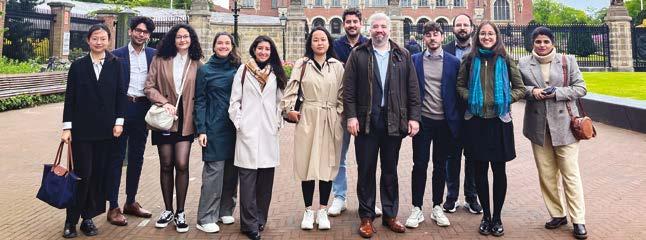
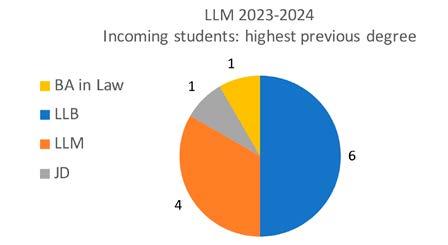
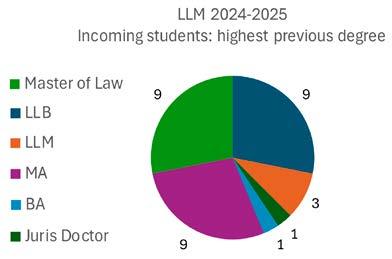
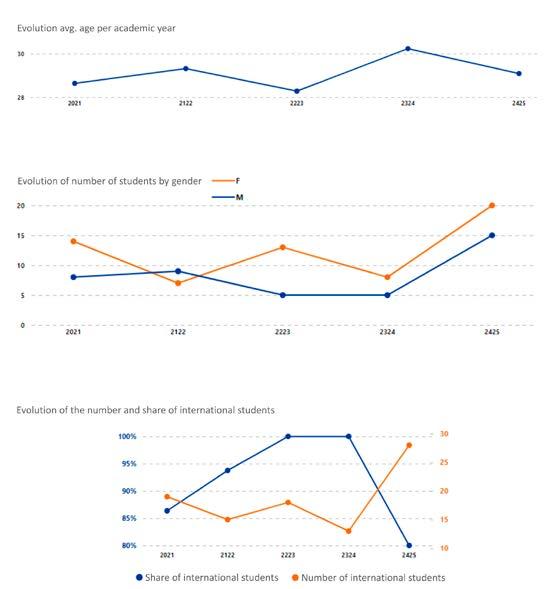
Our EuroMaster programme has been tailored to give international postgraduate students and professionals the opportunity to combine a demanding and rewarding study programme on European Integration with their professional activities. Lectures are organised in the evenings and the programme can be completed over either one or two years.
The programme comprises 60 ECTS and starts with a common core of courses on the essential features of European Integration and research skill development. After this, students can choose two options out of five specialisation streams, in Economics, Environment, Migration, Security, and Digitalisation. The digitalisation specialisation is a new offering, provided from academic year 2023-2024 onwards. The programme ends with a 15,000-word thesis worth 15 ECTS, allowing the students to engage in an exciting intellectual journey on the topic of their choice, with a supervisor from the VUB. In 20232024, students wrote theses about a wide range of topics on a number of aspects of contemporary European policymaking.
The EuroMaster programme saw an increase in student graduates in academic year 2023-2024, and a dramatic uptake of numbers of students starting the programme in 2024, which have brought us back to pre-COVID numbers.
Our students were able to continue to benefit from an excellent learning environment, facilitated by trained teachers and a solid learning platform. As during the COVID situation, we continued to fine-tune our online education infrastructure and services, so that students were able to flexibly get the most out of their ‘Euromaster’ experience. In 2024, our Programme Administrator, Sarah Konaté, continued developing connections to the VUB’s REFLEX team and to the BSoG’s Student Wellbeing offering, providing support and study advice for students with special needs, such as long-term illnesses. Whilst the EuroMaster programme has always been able to take advantage of its modest size to provide for the wellbeing of our students, we have continued efforts to improve our offering in this area in 2024.
The EuroMaster team established a trial for the establishment of an ‘excellence programme’ which is intended to provide opportunities for current students to engage with a committed team of former graduates, who have become experts in their chosen fields in 20222023. Students who have received excellent grades in the first semester, are given the opportunity to interact with former students who have expertise in specific topics. This may be in the form of additional mini-projects that will provide the current students with expertise and experience in a professional setting.
In 2024, discussions also started to establish a large-scale reform process of the post-initial Master programmes at the IES-BSoG, including further integration with the Postgraduate Certificate offered by the IES-BSoG.
The proposals developed by the IES-BSoG were accepted by the VUB’s Educational Council, and will enter into operation in academic year 2025-2026. They are intended to enhance and streamline the offering at this level, increasing the attractiveness and multidisciplinarity of the programmes.
The EuroMaster programme continues to participate in a double degree partnership with the University of Warwick (an EUTOPIA partner), which allows students to combine the Warwick Master programme in Politics with our EuroMaster programme. Students who follow the double degree track only need to submit one thesis for both degrees. In order to facilitate possibilities for students at the VUB, a similar opportunity has been negotiated for VUB students on the MA programme in European and International Governance, where students can continue to study at the VUB in the EuroMaster programme, and are only required to submit one thesis for both degrees. In academic year 2024-2025, we opened up this opportunity to MA students from all programmes in the ES Faculty at the VUB.
In academic year 2024-2025, the tuition fee for the EuroMaster programme was not increased from the previous year (6000 EUR for the full-time programme, and 7000 EUR if a student took the programme over two years). The difference in price is due to the 1000 EUR annual registration fee. Students therefore pay a 1000 EUR fixed registration fee per year, and 83.33 EUR per ECTS taken in each academic year.
In 2024, the EuroMaster programme continued to use the VUB’s registration system for application management, alongside a dedicated staff at the BSoG who manage this process. Enrolment requirements for the EuroMaster remain the same (a minimum of 240 ECTS or equivalent achieved prior to enrolment).
A total of 68 students registered for the EuroMaster programme in 2024 (either for their first or second year), and 29 graduated from the EuroMaster programme in 2024.
Foreign students (non-Belgian) comprised 92.8% of the total EuroMaster student body in the academic year 2023-2024, and 85.3% in academic year 2024-2025. The gender breakdown of incoming students in academic year 2024-2025 was 53% female and 47% male. This is in contrast to the previous academic year, where 53% of our students were male, and 47% female.
The EuroMaster Programme has always boasted a versatile, international selection of students from all around the world, and taken into account a balanced representation of geographic regions, including, when possible, support for students from developing countries. In the academic year 2024-2025, over 45% of our student cohort came from non-EEA countries.
Of the 68 students who were enrolled in the programme in September 2024, 47 were new students (of which 34 full time who will do the programme in one year and of which 13 part time who will do it in two years), and 21 students re-enrolled from previous academic years to continue their part-time studies.
The most popular combination of specialisations in 2024-2025 was Security and Migration, Environment and Security, and Environment and Digitalisation. The table highlights the breakdown of the combination of our different specialisations for the 2024-2025 academic year.
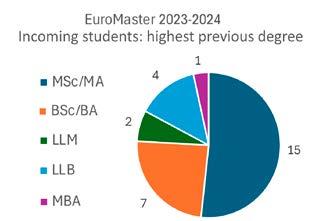
In 2024, we sent out an Alumni Newsletter. We also concretised our preparations for an alumni event which will take place in 2025. Graduates participate in our recruitment activities, including the webinars.
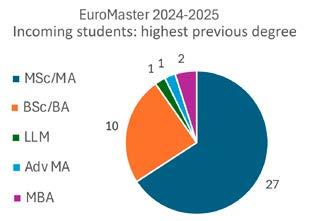
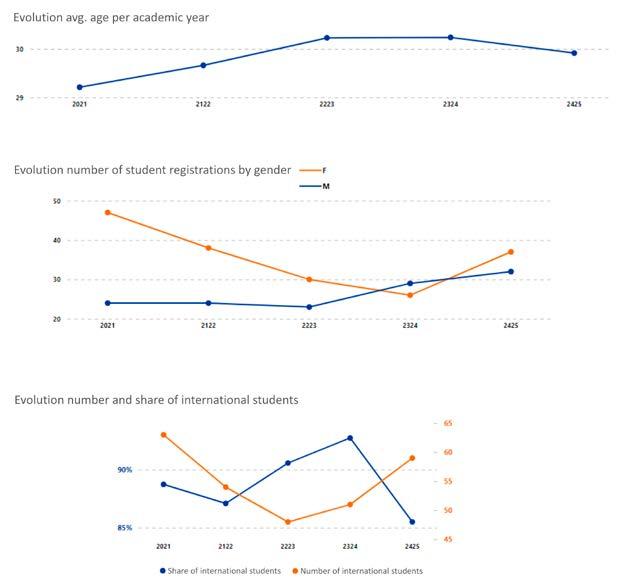
The Postgraduate Certificate (PGC) in EU Policy Making is a fully online programme, focusing on the European integration process, the European Union, its institutions, and policies. The programme is aimed at professionals as well as students with a daytime schedule. It can be taken flexibly over one academic year or two.
The PGC curriculum includes three compulsory courses: History and Theories of European Integration; EU Institutions; and EU Decision-Making and Law. Students must also take two elective courses, from a choice of four: EU Foreign Affairs; EU Justice and Home Affairs; European Public Policy Analysis; and EU Climate Policy (since the academic year 2023-2024). Finally, students also take part in the Jean Monnet Summer School or Winter School on EU Policy Making organised by the BSoG, either before, during or after completing the programme’s online courses. In total, the programme is worth 25 ECTS, as students take a total of five courses, each worth 4 ECTS, and participate in the Summer or Winter School, worth 5 ECTS.
In 2023-2024, 21 new students enrolled in the programme. The programme had a higher proportion of female students (76%) than male students (24%). On average, students were 30 years old, with a median age of 28. Non-Belgian students represented 67% of the annual cohort. In terms of highest previous qualification, 6 PGC students already hold a bachelor degree, 14 a master degree and 1 a doctorate. At the end of the 2023-2024 academic year, 18 students graduated from the programme.
In 2024-2025, 27 new students enrolled in the programme. The programme has 70% of female students and 30% male students. On average, students are 33 years old, with a median age of 29. Non-Belgian students represented 70% of the annual cohort. In terms of highest previous qualification, 9 PGC students already hold a bachelor degree, 16 a master degree and 2 a doctorate.
In terms of teaching staff, Jana Gheuens, Brendan Moore and Simon Otto created and taught a new PGC course on EU Climate Policy in 2023-2024. Regarding administrative staff, Xiangmei Shi is the new student registration officer of the programme since September 2024, taking over from Anne Sterckx.
With the support of the BSoG’s marketing and communications team, the PGC organised two info session webinars in February and June 2024, to attract candidates.
The tuition fee for the PGC depends on whether students decide to complete the programme over the course of one academic year or two. In 2023-2024 and 20242025, the total tuition fee for a student completing the PGC in one year is 3500 EUR. For a student completing the programme in two years, it is 3900 EUR. These tuition fees apply to both EU and non-EU students.
Students for the PGC are selected on the basis of the merits of their qualifications, which depend on: 1) prior degrees, as well as the grades received for them; 2) English language skills; 3) motivation for following the programme.
While a formal requirement to join the PGC is an undergraduate degree of at least 180 ECTS in social, economic or political sciences, business, law and/or contemporary history, PGC students usually already hold at least a master degree.
Proof of sufficient English language skills is required. This can be a valid language test certificate or proof that the candidate has already obtained a degree taught in English.
Finally, as the PGC is primarily aimed at working students who have to deal with competing professional or personal commitments, particular attention is paid during admissions to the motivation of prospective candidates. Candidates must thus clearly demonstrate that completing the programme would serve welldefined professional goals and/or personal interests to be selected.
In terms of process, applications are assessed by the programme director on a rolling basis throughout the academic year.
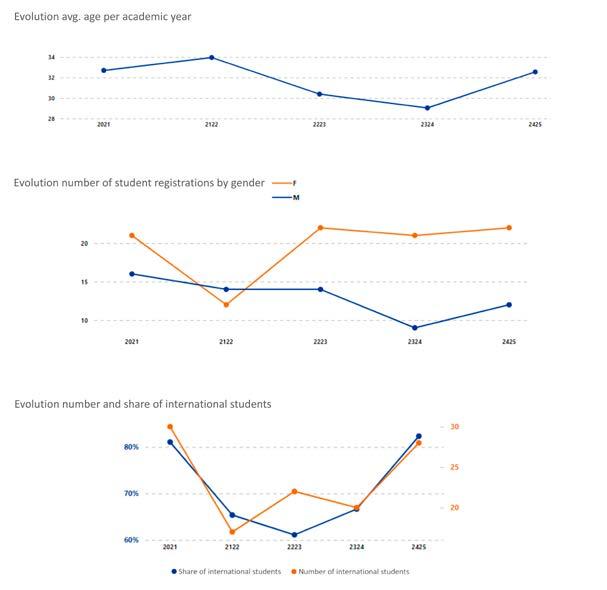
The Inter-University Summer School on EU Policy-Making is an intensive short study programme, developed and delivered by the Brussels School of Governance, the Vienna School of International Studies and the University of Vienna. Since 2013, this course is a compulsory component of the Post-Graduate Certificate for EU Policy-Making. It was also an Erasmus+ Programme Jean Monnet Module (2019-2022) and is now part of a Jean Monnet Chair (2022-2025).
The programme runs over two weeks (1-12 July 2024), the first one taking place in Brussels at the Brussels School of Governance and the second one in Vienna at the Vienna School of International Studies. Thirty participants coming from all over the world completed the 2024 edition of the summer school.
The summer school curriculum consists of lectures, workshops, a simulation game, exclusive insights with EU staff and optional social interaction moments.
During the summer school, participants first receive a general introduction to EU institutions, policy-making processes and select key policy areas, before delving into the thematic focus of the programme, which was Analysing civil rights in today’s EU. The start of weeks 1 and 2 is lecture-intensive in order to gain a lot of knowledge in a short period.
We then process the knowledge gained from the lecture series in workshops and the simulation game. In the 2024 simulation game, the students, as representatives of the European Commission, the European Parliament,
the Council of the European Union, civil society and media, negotiated several articles of the EU directive on combating violence against women and domestic violence. This simulated structured learning allows participants to apply their knowledge of substantive policy areas and policy-making rules.
We also visited the European Commission, the European Parliament and the European Council / Council of the EU in Brussels, the Organization for Security & Co-operation in Europe and the Austrian Ministry of Foreign Affairs in Vienna. During these visits, we received a guided tour, and personnel from the EU institutions shared their expertise and experience with participants.
The tuition fee for the Summer School is 1900 EUR. This fee includes attendance of the summer school, course material, access to online platform, daily lunch in Brussels and Vienna, public transport, group flight from Brussels to Vienna and study visits. VUB and EUTOPIA students are entitled to a 1000 EUR discount and can attend the full Summer School for a reduced tuition fee of 900 EUR. All students are selected on the basis of their motivation and interest in their letter of intent, with preference given to students who are (at least) in their final year of a Bachelor degree. A good level of English is also necessary.
The Summer School is partially made possible with the support of the Erasmus+ Programme of the European Union. With the subsidy from the Erasmus+ Programme (Jean Monnet Module), we were able to waive the tuition fee for one student in financial need in 2024.
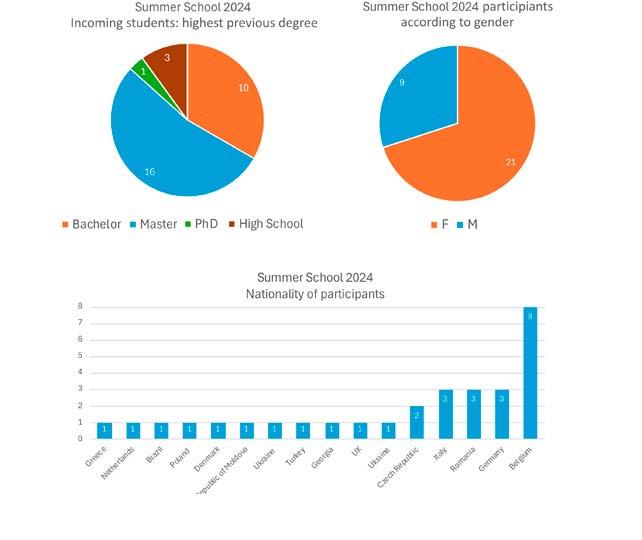
From 5 to 16 February 2024, the Brussels School of Governance organised its online Winter School on EU Policy-Making, the virtual counterpart of our longstanding Summer School on EU Policy-Making.
Twenty-two participants joined the 2024 edition of the winter school from locations across Europe and beyond. Together, they interacted in the two-week intensive online course to learn more about EU policymaking, governance and law, and its relation to other international organisations. The 2024 edition of the Winter School, themed around Analysing digital rights and diplomacy in today’s EU, allowed students to partake in a ‘crash course’ on policy discussions related to freedom of expression, data governance, artificial intelligence, disinformation resilience, platform responsibility, and digital development.
The first week of the Winter School also included a public policy panel examining the role of platforms and algorithms in elections, with representatives from the European Commission DG RTD, Meta’s Stakeholder Engagement Team and the Atlantic Council’s Digital Forensic Research Lab. To create (optional) social interaction moments and build online group cohesion, students were invited every day to participate in a challenge
A special feature of the Winter School during the second week was the simulation exercise. We invited students from our partner universities in the EUTOPIA alliance to join our exercise and simulated the EU ordinary legislative procedure for two days with twenty-six students online. The students took on alter-ego roles as leaders of European institutions,
Commissioners, national ministers, Members of the European Parliament, tech executives, civil society representatives or journalists, and enacted the European Union policy-making process with interinstitutional negotiations on the European Media Freedom Act. The exercise focused on questions around content moderation on online platforms.
Throughout the Winter School, participants also had the opportunity to gain exclusive insights from practitioners in the European Commission, the European Parliament, the European External Action Service and the European Council / Council of the EU in Brussels and the Italian Ministry of Technological Innovation and Digital Transition.
The tuition fee for the Winter School is 1.600 EUR. This fee includes attendance of the winter school, course material, access to the online platform, exclusive insight sessions with EU practitioners. VUB and EUTOPIA students are entitled to a 1.000 EUR discount and can attend the full Winter School for a reduced tuition fee of 600 EUR. Students are selected on the basis of their motivation and interest in their letter of intent, with preference given to students who are (at least) in their final year of a Bachelor degree. A good level of English is necessary.
Both the Winter School and EUTOPIA project are partially made possible with the support of the Erasmus+ Programme of the European Union. With the subsidy from the Erasmus+ Programme (Jean Monnet Module), we were able to waive the tuition fee for one student in financial need in 2024.
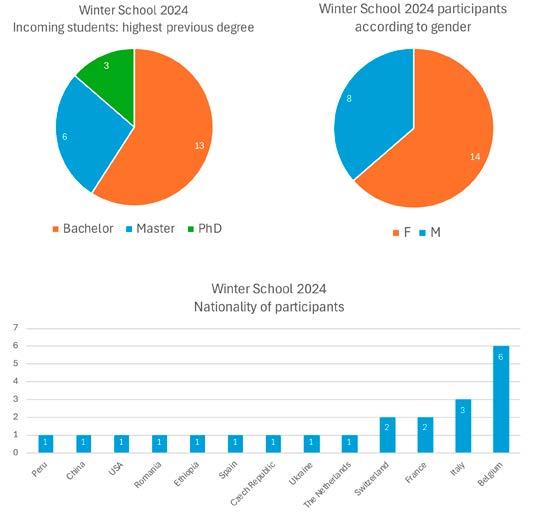
The Office for Teaching and Learning Innovation (OTLI) facilitates the further development and implementation of the Brussels School of Governance’s educational strategy. It serves as a knowledge hub - with a focus on pedagogical innovation and the use of technology to enhance learning - for students, teaching staff, researchers and management in the School.
The OTLI is directly supervised by the Vice Dean for Education and the Head of Secretariat, and in 2024 the team consisted of Rita Reis (Teaching & Learning Innovation Officer) and René Hermens (Senior Expert Teaching & Learning Innovation).
In 2024, our focus was on a complete renovation of the audiovisual equipment in all BSoG classrooms. All equipment in the classrooms, that served us well during the COVID-19 pandemic, was replaced with state-of-theart interactive screens, and the necessary audiovisual technology to allow for easy lecture streaming/recording, enabling improvements in both teaching and learning. By using the available building space more efficiently, we created additional classrooms to accommodate the organisation of a larger student cohort in the academic year 2024-2025.
In addition, we have made significant contributions to knowledge management (e.g., academic regulations and business processes), academic support for the programme reform of our advanced master and postgraduate programmes, and the professional development of both faculty and academic services staff to make better use of the student information system and learning management system.
In the following period, we plan to shift our focus to excellence instead of innovation, providing (policy) advice and educational development services, quality assurance, professional development and business processes/knowledge management to keep the school at the forefront of high-quality teaching and learning for the years to come.
On 1 March 2024, Aslak Veierud Busch successfully defended his PhD thesis entitled “In Pole Position? The Construction of Regions and the EU’s Role in the Arctic”. Aslak’s PhD promoter was Prof. Dr. Sebastian Oberthür (VUBBSoG). His PhD jury consisted of Dr. Vjosa Musliu (BSoG-VUB, chair), Dr. Stephan Klose (BSoG-VUB), Dr. Elana Wilson Rowe (NUPI/Norwegian University of Life Sciences), Prof. Dr. Caterina Carta (BSoG-VUB) and Prof. Dr. Klaus Dodds (Royal Holloway University of London).
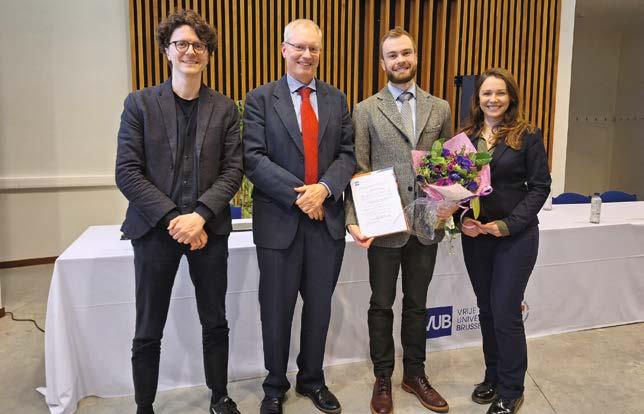
On 11 June 2024, Omar N Cham successfully defended his PhD thesis entitled “Understanding Narratives on EU Migration Control Policies in West Africa: The Case of The Gambia”. Omar’s PhD Supervisor was Prof. Dr. Ilke Adam (BSoG-VUB) and his Co-supervisor was Prof. Dr. Florian Trauner, Dean of the BSoG. Other jury members were Prof. Dr. Jamal Shahin (BSoG-VUB), who acted as a Jury Chair, Prof. Dr. Vjosa Musliu (BSoG-VUB), Dr. Katharina Natter (Leiden University), Dr. Ismaila Ceesay (University of the Gambia) and Dr. Philipp Stutz (BSoG-VUB).
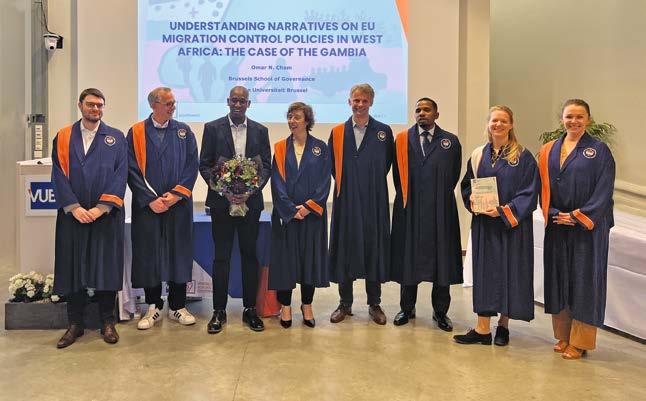
On 10 September 2024, Xiuling Ye successfully defended her PhD thesis entitled “Factors associated with prejudicial attitudes toward immigrants in China: an exploration of sociodemographic variables”. Xiuling's supervisors were Prof. Dr. Luk Van Langenhove (BSoG-VUB) and Prof. Dr. Caterina Carta (BSoG-VUB). The jury consisted of Prof. Dr. Florian Trauner (BSoG-VUB, Chair), Prof. Dr. Philippe de Lombaerde (Vrije Universiteit Brussel), Dr. Pan Honghui, PhD (BSoGVUB), Prof. Dr. Christian Kaunert (Dublin City University), and Prof. Dr. Joaquin Sarrion Esteve (UNED - Universidad Nacional de Educación a Distancia).
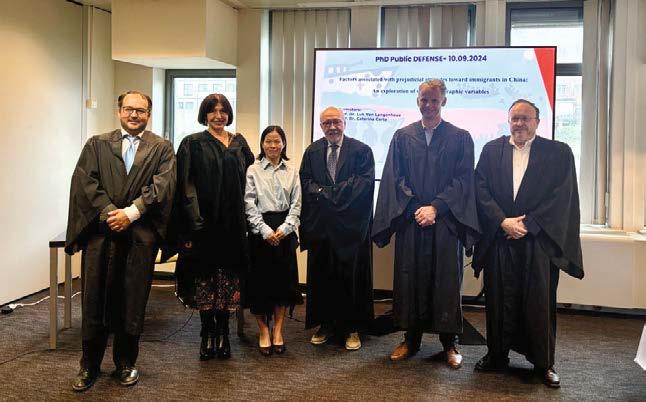
On 30 September 2024, Laura Vansina successfully defended her PhD thesis entitled “Putin’ the Past to Work: Historical narratives in Russia’s policy making (2000-2022)”. Dr. Vansina is the first EUTOPIA PhD student from the Department of Politics and International Studies (PAIS), successfully defending her thesis. She was jointly supervised by Prof. Alexander Mattelaer (BSoG-VUB) and Prof. Maria Koinova (Warwick).
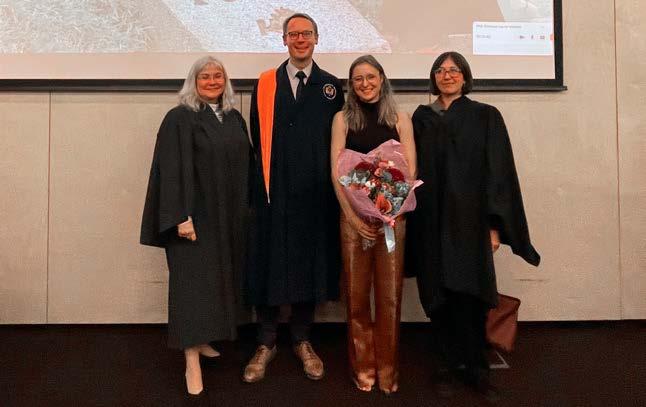
Laura Vansina celebrating her successful PhD defence
Antonios Nestoras, Alexandra Mihai, Klaudia Majcher, Laura Westerveen, Malasree Neepa Acharya
Inan Izci, Sevgi Temizisler, Zana Abdallah Kurdai, Lingyu Xu, Linde Desmaele, Laura Iozzelli
Diana Potjomkina, Jimmy Hendry Nzally, Yijia Huang, Ernesto Roessing, Sibel Top
Tudor Petru Fabian, Philipp Stutz, Maximilian Ernst, Asma Akbar, Jana Gheuens
Aslak Veierud Busch, Omar N. Cham, Ye Xiuling, Laura Vansina


Books: 3 Book chapters: 28
Journal articles: 90
Unpublished papers: 4 Policy reports: 39
Other contributions: 5
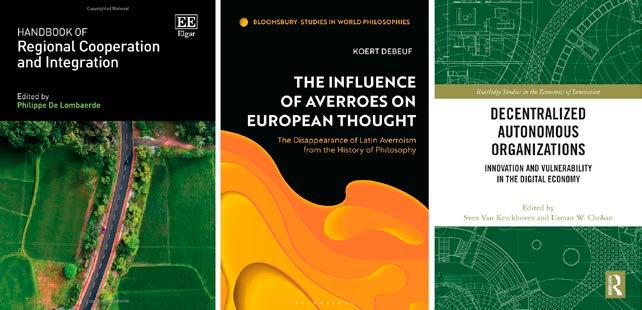
22/01/2024
06/02/2024
19/02/2024
28/02/2024
29/02/2024
29/02/2024
01/03/2024
Author(s)
CSDS Policy Brief 1 By Any Other Name? The Camp David Summit, US-JapanSouth Korea Trilateral Security Cooperation and Military Alliances Tongfi Kim
CSDS Policy Brief 2 De-Risking: How Germany's IndoPacific Deployments Support Berlin's Economic Strategy Towards China
CSDS Policy Brief 3 In Whose Interests? Regulating Europe's Defence Industry and the Politics of Exemption
CSDS Policy Brief 4 Arming Ukraine: Can Europe's Bilateral Defence Agreements Make the Difference?
Maximilian Ernst
Daniel Fiott
Lotje Boswinkel
C3E Policy Brief 1 Fostering impactful activism for inclusive EU climate governance Louisa Parks, Tereza Maarova, Sebastian Oberthür
C3E Policy Brief 2 On the Edge of Extinctions or New Life in Environmental-Economic Governance? The Integration of Biodiversity Targets and Economic Policies
CSDS Policy Brief 5 Lame Ducks? Seizing EU-UK Security Cooperation in a Period of Elections
François Gardin, Simon Happersberger, Jean Hugé and Harri Kalimo
Gesine Weber
Date
11/03/2024
15/03/2024
25/03/2024
11/04/2024
15/04/2024
23/04/2024
24/04/2024
06/05/2024
10/05/2024
CSDS Policy Brief 6 All Along the Watchtower - The EU and the Geopoliticisaiton of Migration
CSDS Policy Brief 7 Sisyphus at Work: The Japan-South Korea Rapprochement and its Implications for Europe
CSDS Policy Brief 8 Self-fulfilling Prophecy? The Consequences of America's and China's Decoupling
CSDS Policy Brief 9 Wagner Reborn? The Metastasis of Russian Mercenarism
Author(s)
Diego CaballeroVelez
Eva Pejsova
Olivier Sueur
Patrick Wouters
CSDS Policy Brief 10 Brothers in Arms? The South KoreaNATO Relationship Ramon Pacheco Pardo
CSDS Policy Brief 11 War Economy: Ukraine, the EU and the DTIB
CSDS Policy Brief 12 Germany's Last Sonderweg: How Germany Learned to Love Strategy, in its Own Way
CSDS Policy Brief 13 From Kabul to Kyiv: The Long Shadow of NATO's War in Afghanistan
Daniel Fiott
Roderick Parkes
Michael Williams
CSDS Policy Brief 14 Four In, Two Out and One in Between: European Political Parties and EU Defence Lukasz Maslanka
Date
17/05/2024
31/05/2024
10/06/2024
21/06/2024
27/06/2024
04/07/2024
16/07/2024
18/07/2024
22/07/2024
CSDS Policy Brief 15 Outer Limits? Economic Security and the European Space Sector
CSDS Policy Brief 16 Competitor, Rival but Partner No More? EU-China Economic Relations and the European Elections
CSDS Policy Brief 17 Doubly Dangerous? How Norway Copers with Security Dilemmas in the High North
CSDS Policy Brief 18 The Long Shadow? China's Military Rise in the Indo-Pacific and its Global Implications
CSDS Policy Brief 19 Two Elections, One Challenge: EU Taiwan and the EU Playbook
CSDS Policy Brief 20 Shadow War: What Estonia and Poland tell us about Russian clandestine operations
CSDS Policy Brief 21 Games of Peace and War: Olympics and International Politics
C3E Policy Brief 3 Boosting European climate policy with a resilient knowledge-sharing framework
CSDS Policy Brief 22 Progress for Power: Why the EU needs a new EU Global Strategy
Author(s)
Antonio Calcara and Giovanni Tricco
Francesco Giovanni Lizzi
Bjorn Olav Knutsen and Elisabeth Pettersen
Masayuki Masuda and Alexander Mattelaer
Giulia Tercovich and Laia Comerma
Ivan Klyszcz
Antonio Missiroli
Claire Dupont
Giovanni Grevi
Date
25/07/2024
03/09/2024
09/09/2024
25/09/2024
07/10/2024
16/10/2024
Author(s)
CSDS Policy Brief 23 Plus ca Change? France and European Defence After the Legislative Elections Gesine Weber
CSDS Policy Brief 24 Security of Supply: How can the EU Help Ensure Defence Prepardeness?
Daniel Fiott
CSDS Policy Brief 25 Is Xi Listening? The 2024 Third Plenum and its Impact on Global Economic Security Laia Comerma
CSDS Policy Brief 26 Keep it Moving: From Mobility to Logistics in European Defence
Daniel Fiott
CSDS Policy Brief 27 Financial Power Europe? The Challenges of EU Financial Assistance to Ukraine Lukas Spielberger
CSDS Policy Brief 28 Linking Europe and Asia for the Future: Time for the JUKE Grouping?
Henry Haggard
21/10/2024
28/10/2024
05/11/2024
CSDS Policy Brief 29 Sink or Swim? Revitalising NATO in European Maritime Security Piero Barlucchi
CSDS Policy Brief 30 Navigating the Indo-Pacific: Strategic Priorities for the New EU Leadership
CSDS Policy Brief 31 Uncertainty Ahead? The 2024 US Electons and What is Stake for EUNATO Cooperation
Giulia Tercovich et al
Nele Marianne Ewers-Peters
Date
12/11/2024
19/11/2024
20/11/2024
26/11/2024
28/11/2024
18/12/2024
CSDS Policy Brief 32 Losing Escalation Dominance: The US, the First Island Chain and Japan's Nuclear Outlook
CSDS Policy Brief 33 Proven Partners: Towards the Implementation of the ROK-NATO Tailored Partnership
CSDS Policy Brief 34 Bound by Uncertainty: What Future for EU-Japan Security Cooepration?
CSDS Policy Brief 35 Manufacturing Defence: Europe, the Republic of Korea and Defence Industrial Cooperation
CSDS Policy Brief 36 Nuclear Puzzles: What Can South Korea Learn from NATO's Experiences as a Nuclear Alliance?
CSDS Policy Brief 37 Mutual Defence in the EU? The Imperative of Article 42.7 in Case the US Abandons European Defence
Author(s)
Kristin Lerfald Grostad
Kim Sung-han and Ramon Pacheco Pardo
Eva Pejsova
Yang Uk & Daniel Fiott
Jian Kim and Luis Simon
Gesine Weber

Our scholars frequently appear in both local and international media outlets. They are featured in a variety of contexts, to provide expert commentary on policy related matters in our areas of expertise (migration and diversity, the digital transformation of society, climate change and green transitions in the economy, as well as diplomacy, strategy and geopolitical competition.) In total, we recorded 154 media appearances in the year 2024. Outlets where our scholars appeared in 2024, include VRT, VTM, RTBF, De Standaard, De Morgen, De Tijd, Het Nieuwsblad, Knack, Le Soir, La Libre, Bruzz, The Brussels Times, Euronews, EU Observer, Politico Europe, NRC, De Telegraaf, Le Monde, Rai News, ORF, Associated Press, Reuters, ABC News, The Wall Street Journal, CNN, The Economist, Financial Times, Asahi Shimbun, Nikkei Asia, Japan Times, Yonhap News Agency, etc.

Alison Woodward - De Afspraak ,VRT Canvas 6 November 2024
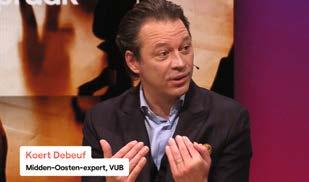
Koert Debeuf - De Afspraak, VRT Canvas 26 November 2024
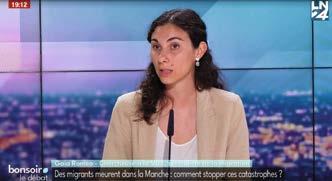
Gaia Romeo - LN24 4 September 2024
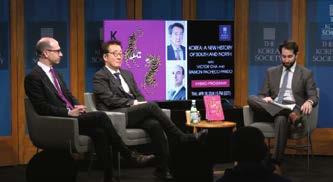
Ramon Pacheco - Pardo, The Korea Society 18 April 2024

Sebastian Oberthuer - VRT Radio 1 11 November 2024
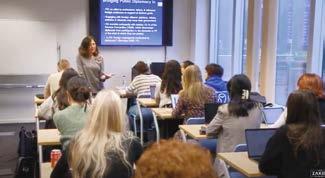
CityReport Brussels - Kanaal Z 22 February 2024
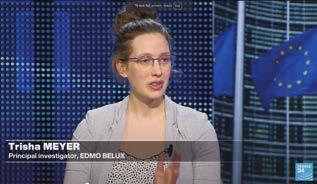
Trisha Meyer - France 24 22 March 2024

Hielke Hijmans - VRT Canvas' Terzake 22 January 2024
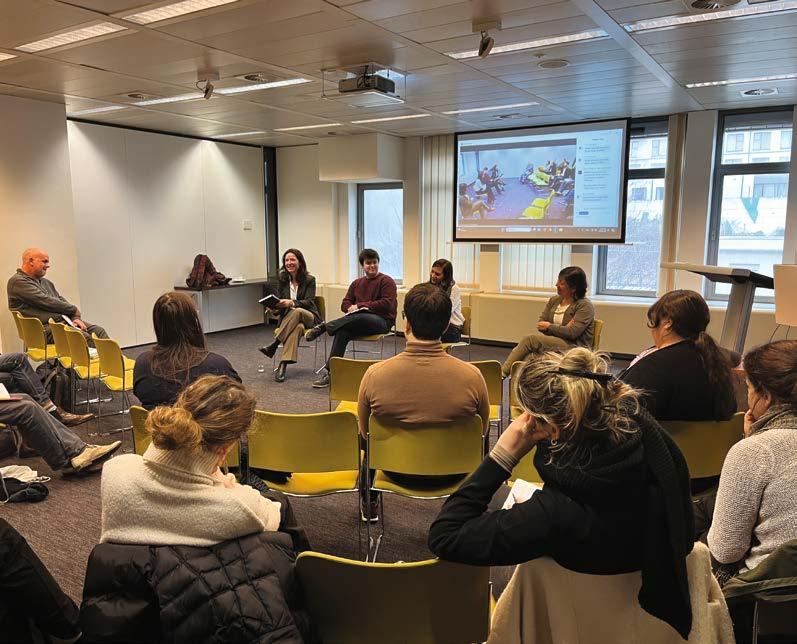
17/01/2024 Eco-social crisis and judicial activism: experiences and challenges
30/01/2024 BRIDGES Final Conference
01/02/2024 Winter School online policy panel: Examining the role of platforms and AI in elections
09/02/2024 Online info session on Postgraduate Certificate in EU policy making
29/02/2024 Public PhD defence Aslak Veierud Busch: In Pole Position? The Construction of Regions and the EU’s Role in the Arctic
01/03/2024 EU’s Digital Future Seminar #1 : Unpacking the European way to regulate the “digital”
07/03/2024 Book Launch: Children as Climate Citizens – A sociolegal approach to public participation
07/03/2024 Book Launch: Addressing Hybrid Threats
12/03/2024 Online info session on Advanced Master in European Integration
18/03/2024 Online info session on Master's programmes at the BSoG
21/03/2024 Norms of (digital)-sovereignty
26/03/2024 Transnational climate and ecological litigation: Exploring the transformative role of actors in shaping legal mechanisms
03/04/2024 Digitally Aware Elections: Fausto Matos, EPP
16/04/2024 Digitally Aware Elections: Thierry Masson, Renew Europe
17/04/2024 Transatlantic Transitions: Defence and Statecraft Forum
19/04/2024 Landmark Climate Cases at the ECHR and IACHR - BSoG-VUB Joint Event
03/05/2024 2024 EU Elections and the Future of the European Green Deal
07/05/2024 EDGE kick-off day - Enhancing democratic governance in Europe
08/05/2024 EU’s Digital Future Seminar #2: Assessing the Material Shaping of EU Digital Sovereignty in Response to the War in Ukraine
13/05/2024 Policy Forum Series 2024: Sustainable Trade & Critical Raw Materials - Coherence between Environmental Protection and Resilience
14/05/2024 Delivering the European Green Deal - towards a coherent and integrated EU ocean policy framework for offshore renewable wind energy and biodiversity
14/05/2024 Digitally Aware Elections: Arnika Zinke, Greens/EFA
16/05/2024 Policy Forum Series 2024: Sustainable Trade & Environment – Coherence and Complexities of Trade Agreements
21/05/2024 Pathways towards Sustainable Transformation in the EU: The Role of Industry
21/05/2024 Digitally Aware Elections: Inês de Matos Pinto, S&D
22/05/2024 Roundtable Event: Responsible AI in Research
29/05/2024 Ecological conflicts: judicial and non-judicial responses in Central Asia
30/05/2024 Policy Forum Series 2024: Sustainable Trade & Digitalisation – Coherence and Conflicts in the context of a global digital platform economy
05/06/2024 Policy Forum Series 2024: Sustainable Trade & Security – Coherence and De-Risking in a Geopolitizing context
05/06/2024 Digitally Aware Elections: draft report presentation
06/06/2024 Online info session on Postgraduate Certificate in EU policy making
11/06/2024 Public PhD defence Omar N Cham: Understanding Narratives on EU Migration Control Policies in West Africa: The Case of The Gambia
12/06/2024 Policy Forum Series 2024: Sustainable Trade & Migration – Coherence or Pluralism under a Trend of Deterrence?
18/06/2024 Launch of the Book ‘Land of Hope’ and `Ecotarian’ application
18/06/2024 Strategic climate litigation in practice: The Klimaatzaak (Belgium) - Guest lecture by Prof. Carole Billiet
19/06/2024 The Future of the European Green Deal
19/06/2024 Policy Forum Series 2024: Sustainable Trade & Agriculture – Coherence and Pluralism at a Politically Charged Intersection
20/06/2024 EU’s Digital Future Seminar #3: The threat of algorithmic rule by law: why the EU's regulation of public sector AI falls short of its purpose
26/06/2024 Roundtable Event: Public Procurement of Steel and Cement in Construction - Creating a Lead Market for Green Materials
26/06/2024 Policy Forum Series 2024: Sustainable Trade & Development – Coherence and Pluralism in Designing Mutually Beneficial Partnerships
01/07/2024 Jean Monnet Summer School keynote lecture: Will the EU’s new Pact solve Europe’s migration crisis?
02/07/2024 Policy Forum Series 2024: Sustainable Trade & Climate – Coherence and External Implications of the EU Carbon Border Adjustment Mechanism
08/07/2024 The Greening of Trade in Times of Planetary and Geopolitical Crises? Ideas, Institutions, and Interdependence in the Environment-Trade-Nexus. Early Career Researcher Workshop
12/07/2024 Policy recommendations workshop: The importance of evaluation for effective designing and evaluation of PVE / CVE / De-radicalisation initiatives
10/09/2024 Public Ph.D. defense of YE Xiuling: Factors associated with prejudicial attitudes toward immigrants in China: an exploration of sociodemographic variables
11/09/2024 INDEED Final Event and 2nd International Policy & Practitioners Forum
26/09/2024 Launch event for First Waves web platform
27/09/2024 Enfoques y metodologias sobre el derecho y la naturaleza: Dialogo entre proyectos (Approaches and Methodologies on Law and Nature: Dialogue between Projects)
30/09/2024 Public PhD defence of Laura Vansina: 'Putin’ the Past to Work: Historical narratives in Russia’s policy making (2000-2022)'
03/10/2024 AI in Education: Opportunities, Challenges, and Best Practices
04/10/2024 Webinar on Environmental Impact on Land and Water
16/10/2024 The sustainability transition of EU Food Systems: making progress or taking time?
18/10/2024 Joint Research Day with CESSMIR, MIGLOBA and BIRMM
07/11/2024 The Clean Industrial Deal: Decarbonizing Europe’s energy-intensive industries?
19/11/2024 Workshop Presentation and Call for Papers: Litigation And Dispute Resolution in Transnational Ecological Conflicts - The role of judicial and non-judicial mechanisms
20/11/2024 Just transition in Europe and beyond: The role of EU policies
22/11/2024 Between Making Sense of and Sensing Black Activism in Germany
04/12/2024 Reflections on and beyond COP29: Prospects of global climate governance
05/12/2024 The European Union in Remaking Global Trade - Promoting Sustainability, Justice and Circularity in the International Trading System
12/12/2024 TDI Yearly 2024: Unpacking a uniquely exciting year in trade defence
16/12/2024
EDMO BELUX Lunch lecture #3: 'Down with Neocolonialism!' The resurgence of a strategic narrative in wartime Russia
22/01/2024 Mattia Sguazzini Text as data: models and research design
05/02/2024 Simon Happersberger Reversing the Gaze in EU Trade Policy? Spatial Hierarchies in the Trade-Sustainability-Nexus
11/03/2024 Folashade Ajayi Imagining Otherwise: Black Utopia In Berlin
15/04/2024 Samuel Johns Sources of the Self and Charles Taylor: Gen Z reasserting relationality in disembodied times
22/04/2024 Nathalie Van Raemdonck
Platform-mediated social norm contestation of climate change publics on Instagram and Twitter
30/04/2024 Simon Otto External Dimension of EU Climate policy: policy reactions to the EU CBAM
07/05/2024 Samuel Cipers On how the European Union's fight against online disinformation reveals a hegemonic struggle
14/05/2024 Carlos Entrena Serrano Artifacts, practices and social arrangements in content curation on TikTok: a study on political content
04/06/2024 Louise Hantson Immigrant integration & Diversity Policies in Cities: Relational dynamics & Policy Outcomes
22/06/2024 Folashade Ajayi Between Making Sense of and Sensing Black Activism in Germany
28/11/2024 Hongcheng Hsiao Green Ties and Iron Fists: How China Whip the EU with Economic Leverage
09/12/2024 Sophie Hoogenboom Understanding Digital Sovereignty: Exploring Symbolic Interactionist Role Theory
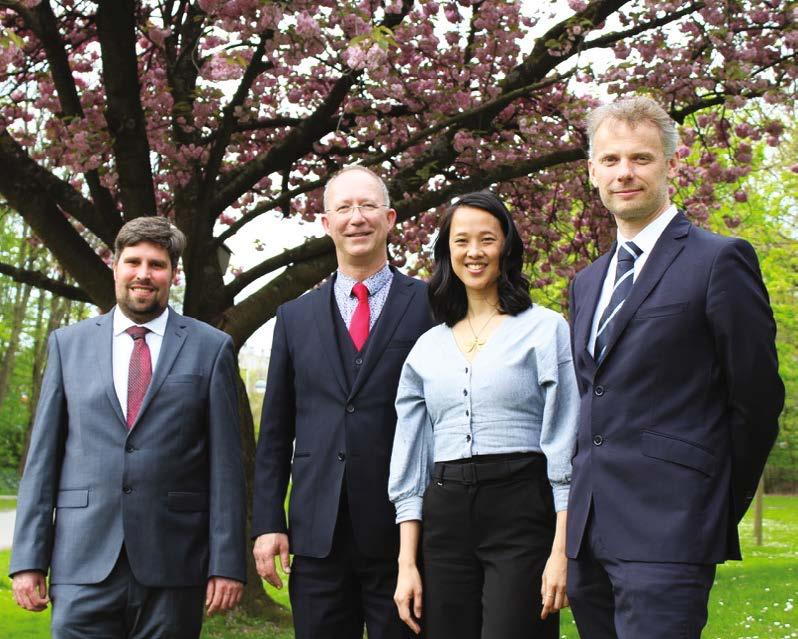
The IES is a ‘special university institute’ (Bijzonder Universitair Instituut) with functional autonomy within the VUB. Since its inception, the institute has been governed by its own Board, whose members are proposed by the Rector and appointed by the University Council, following the provisions written down in the IES statutes (Organiek Reglement) that were updated in 2019. The management structure of the Institute is described below.
The IES Board is the highest authority of the Institute and is responsible, inter alia, for approving the general strategy, policy plan, budget, and annual report. The Board also decides on research strategy and gives its final approval to the appointment of senior staff (ZAP). The Board consists of 14 members: 6 external (to the VUB), 4 ZAP members with their main assignment at the VUB, the Rector (or his/her representative), a representative of the ZAP members of the IES and two students. In addition, one member of the junior academic personnel, one member of the administrative personnel, a representative of the faculty of Economics and Social Sciences and one of the faculty of Law and Criminology, the Vice-Rector for Education and Student Affairs and the Vice-Rector for Internationalisation attend the Board meetings with a consultative vote. Members of the Executive Committee are also invited. Board members are appointed for a 4-year period. Two graduating student representatives (Wessel Miedema and Sofie Skovborg) left the Board in Summer 2024. In autumn 2024, one new student representative (Robert Farkas) joined the Board. A second position is currently vacant.
Daily management is the responsibility of the Executive Committee (ExCom): the Dean, two Vice-Deans, the Executive Director and the Head of Secretariat. The HR officer is also invited to attend the meetings. The mandate of the Dean and Vice-Deans runs for four years (similar to the mandate of Board members). Dean Luc Soete announced his resignation as of January 2024. He was replaced by the Vice-Dean for Research Florian Trauner (who assumed the research management functions within the Deanship).
Research management at the IES is primarily done through four research centres with a certain level of autonomy and led by a centre director (a ZAP member). All members of the academic staff belong to one or more centres where they report and organise their activities. There are four centres at the Institute:
· CMDJ - The Centre for Migration, Diversity and Justice (Co-Directors Ilke Adam, Florian Trauner. The latter was replaced by Omar N. Cham in October 2024)
· CD2I - The Centre for Digitalisation, Democracy and Innovation (Director Trisha Meyer)
· CSDS - The Centre for Security, Diplomacy and Strategy (Director Luis Simon, Deputy Director Giulia Tercovich)
· C3E - The Centre for Environment, Economy and Energy (Co-Directors Harri Kalimo and Sebastian Oberthür)
Under the auspices of the Vice-Dean for Research, a Research Council discusses all research-related issues at the IES. As a consultative body, it advises the ExCom and/ or the Board on all research-related matters. It consists of all ZAP members of the IES. Under the auspices of the Vice-Dean for Education, an Education Council discusses all education-related issues. It consists of the (teaching) programme directors of the IES and of Vesalius College. Similar to the Research Council, it advises the ExCom and/or the Board on education-related matters. Both councils meet on a monthly basis, yet twice per year a joint education/research council is held to discuss overarching issues.
The Executive Committee, tasked with the daily management of the IES, formulates and oversees the implementation of the technical policy. A cornerstone of this policy since the recognition as university department in 2022, is a close collaboration with VUB’s central services. This collaboration focuses primarily on ICT and infrastructure management, but also includes synergies between other departments. VUB’s central services handle a variety of essential operations on behalf of the IES, including IT network administration, classroom maintenance, and the setup and management of student accounts, email lists, and signage. Moreover, the control of access to the premises at Pleinlaan 5 is coordinated by the VUB’s InfraDesk team. An additional aspect of the collaboration is reflected in the handling of enrolment data; prospective students for the IES programmes apply via the VUB’s CaLi application platform, with enrolment
processing being shared between the VUB’s student administration and a dedicated IES student administration team. Another aspect of its technical policy is that the IES actively follows technical market developments and encourages suggestions from staff and students. These inputs are used for shaping future plans, especially concerning infrastructure improvements, ensuring that technical policy remains responsive to the evolving needs of the community.
The Executive Committee formulates and oversees the implementation of the financial policy. The Finance Department is supervised by the Executive Director, who in turn reports to the IES Board. The annual accounts as well as the IES’ financial policy and processes are audited and vetted annually by external independent auditors and ultimately by the Government Commissioner Additionally, all EU funded projects that require external auditing are thoroughly reviewed and audited upon completion and prior to submitting final reporting to the relevant authorities. The formulation of the annual budget is a collaborative effort led by the Executive Director, involving the Directors of the various Research Centres, the Dean and Vice-Dean, Programme Directors, and coordinators of the Secretariat clusters. The proposed budget is subsequently presented to the IES Board for examination and approval. Since the setup of the research centres, Centre Directors are also overseeing the Centre income and expenses.






Karel De Gucht
President
Former European Commissioner

Caroline Buts
VUB Professor

Sven Biscop
Director at Egmont Institute

Eva De Bleeker
Member of Flemish Parliament

Gloria Gonzalez Fuster
VUB Professor

Frank Hoffmeister
Head of Unit, DG Trade, EC


Tony Joris
VUB Professor
Trisha Meyer
VUB Professor
Leo Van Audenhove
VUB Professor
Nic Van Craen
Algemeen Beheerder VUB
Representative of the Rector
Wendy Van den Broeck
VUB Professor
Senior researcher imec-SMIT, VUB
Freddy Van den Spiegel
Former Bank Manager
Robert Farkas
Student

The IES communicates with the outside world by targeting the general public, Brussels-based policymakers, academics and researchers interested in the EU, as well as potential applicants (both students and professionals) for its various educational programmes.
In 2021, the IES created an alliance with Vesalius College and as of then on promoted its activities under the joint Brussels School of Governance (BSoG) brand. In 2024, the Brussels School of Governance continued to build up its followers on social media channels, being LinkedIn, Twitter, Facebook, Instagram and YouTube. At the end of 2024, these channels attracted a substantial fan base.
The number of followers across networks has grown by 5073 followers in total, which is an impressive result. From 10514 followers at the end of 2023, the number of followers has grown to 15587. The table below shows the number of followers across networks.
Average post engagement rate across these channels was at 5.82% (up from 4.25% in 2023).
A new website (www.brussels-school.be) was created for the BSoG alliance in 2021. In 2023, this website underwent a technical and functional update. Since the autumn of 2022, our Centre for Security, Diplomacy and Strategy has its own website and social media channels (see below).
The IES/BSoG sends out a monthly newsletter to a broad target audience. At the end of 2024, its newsletter mailing list comprised of 3536 recipients. 10 newsletter editions were sent out in 2024. The average open rate for all campaigns in 2024 was 37.9%. In addition, some of the IES’ research centres have their dedicated social media channels, which are also very active and are building their fan base day by day. The Centre for Security, Diplomacy and Strategy is the most prominent one in this respect with a very active X (Twitter) account that had 7,995 followers at the end of 2024, and a LinkedIn account with more than 1500 followers. The Centre for Migration, Diversity and Justice has an X (Twitter) account for its BIRMM project that ended 2024 with 826 followers, and a LinkedIn account that ended the year with some 1000 followers.
Finally, an important aspect of our outreach is the multitude of events that we organise for our wide range of stakeholders. We refer to the Public Events section of this Annual Report for more details.

In the context of its academic programmes and research activities the IES collaborates daily with universities and institutions around the world. In this section we first zoom in on our unique relationship with Vesalius College within the framework of the Brussels School of Governance. Second, we turn to our longstanding partnerships with UNU-CRIS, the EUTOPIA Network (notably with the University of Warwick and NOVA University), the Diplomatische Akademie Wien and the University of Southern California. Finally, we list a representative sample of operational collaboration with various partners in the framework of projects, publications, and events.
The Brussels School of Governance constitutes an alliance between the Institute for European Studies and Vesalius College, with the former focusing on research and postgraduate education and the latter on undergraduate and graduate education. The setup of the alliance aims to foster the advantages of cooperation (and of scale) between the two largest international and European-focused organisations that are linked to the VUB. Since its inception in 2020, the IES and VeCo share the same management and secretariat. The latter are paid jointly so that a financial win is obtained with both partners. Next to these obvious administrative and logistical benefits, the most interesting part of the partnership is the unique academic collaboration, with the academic activities of Vesalius College staff feeding into the research architecture offered by the IES.

Together with the University of Ghent, the VUB partners with the United Nations University in operating the UNU Centre for Comparative Regional Integration Studies of the United Nations University (UNU-CRIS). Based in Bruges, UNU-CRIS conducts research and provides services in the field of regional integration in general, and on regional public goods and the role of regional organisations in globalisation more specifically. As the IES team constitutes the VUB lead element in shaping this relationship, several professors and researchers are closely involved in joint projects with UNU-CRIS staff. This includes, amongst others, the Unit on NonTraditional Diplomacy (UNTRAD) that was set-up in 2021 by IES professor Luk Van Langenhove, the joint PhD projects of Diana Potjomkina on multistakeholderism in EU trade policy and Nadia Tjahja on internet governance, and the wider GREMLIN (part 2) project investigating multistakeholderism in regional and global governance . IES Prof. Dr. Jamal Shahin is leading the digital governance cluster at UNU-CRIS, and acted as Microsoft Chair in Digital Sovereignty (shared by IES and UNU-CRIS). From November 2020 onwards, UNU-CRIS director Philippe De Lombaerde joined the IES ZAP cadre as 10% research professor, hence enabling close operational collaboration between team UNU-CRIS and team IES. Executive Director Anthony Antoine acts as liaison between IES and UNU-CRIS and coordinates Brussels-based activities of the UNU centre.

Within the framework of the EUTOPIA European university alliance that VUB is part of, the IES has developed a close working relationship with the Department of Politics and International Studies (PAIS) of the University of Warwick and with the Politics Department of NOVA University Lisbon. Collaboration is built on the EUtopia co-tutelle PhD programme, of which the IES hosted two junior scholars (Laura Vansina and Samuel Cipers), a double MA degree (combining the Warwick MA trajectory with the Advanced MA in European Integration at the IES), a joint BA programme being developed between PAIS and Vesalius College, and the University of Warwick acting as an important partner in the EUIA conference, of which we will have the next edition in 2025. Furthermore, IES professors Trisha Meyer and Sven Van Kerckhoven act as learning community members in the ‘Europe in the World’ EUtopia-module set up at the University of Gothenburg. With NOVA, discussions have started to develop joint initiatives in the near future. Throughout the year, IES staff continued to monitor developments within the EUtopia alliance.

The 21st edition of the on-campus IES Summer School on EU Policy Making in co-organisation with the Diplomatic Academy of Vienna, took place in 2024. The theme of the Summer School was civil rights in today’s EU. Packed with interactive seminars, the programme focused on civil rights, touching on policy discussions related to human security, migration, anti-discrimination, and diversity. As a legacy of the COVID-era, but also due to the great success of the Summer School format, an alternative Winter School edition was introduced for the fourth time in February 2024 – however this time without partners. The online format allows for a single point of initiative, while cost-wise, this proved to be a more viable solution. However, the Winter School continues to be a platform for students from our partner universities in the EUTOPIA alliance to join our online simulation exercise on the EU ordinary legislative procedure.

For many years now, the IES-BSoG has organised the Brussels Programme on European Foreign Policy, a programme in collaboration with long-standing partner University of Southern California (USC). The 2024 edition of this Programme took place from 20 May until 21 June. It featured an extensive combination of academic lectures covering EU foreign and external policies, complemented by part-time internships for practical experience. The curriculum included sixteen in-class lectures on a range of topics including the history of European integration, actors and institutions, migration trends, the wars in Ukraine and Middle East, European defence, hybrid threats, technological innovation, transatlantic relations, China and Asia. The programme was complemented with a number of institutional and cultural visits. Students gained professional experience by participating in part-time internships with a range of hosts, including POLITICO and the Anna Lindth Foundation.

IES researchers continued to engage with colleagues in a wide variety of international networks in various projects, publications, and events. Noteworthy highlights include the organisation of the Brussels Indo-Pacific Dialogue twice in 2024, with keynote speakers including the Belgian Prime Minister and the foreign ministers of Canada and Latvia, the fourth Transatlantic Dialogue on the Indo-Pacific in Washington (with partner CSIS) organised by our CSDS team, the Bridging Allies initiative with events organised in Brussels, Tokyo and Seoul; the GreenDeal-NET project, a Jean Monnet Network involving 12 European universities from 11 European countries and led by our C3E team; two international workshops in Tanzania and Colombia on transnational ecological litigation; the EDMO Belux project coordinated by our CD2I Centre, with a network of more than 100 disinformation experts that is part of the European Digital Media Observatory, and finally the H2020 Bridges project in which researchers from our CMDJ team engage in the analysis of migration narratives as part of a 12-member strong consortium led by the Barcelona Centre for International Affairs (CIDOB).
Name partner Country Collaboration* Comments
Bern University Switzerland R Biodiversa + Defendbio
C2ES U.S. R Global Stocktake under the Paris Agreement
CICERO Norway R CONNECT
Copernicus Institute for Sustainable Development, Utrecht Netherlands R Biodiversa + Defendbio
Dublin City University Ireland B GreenDeal-NET
Ecologic Institute Germany R Several projects, incl. 4I-TRACTION
Energyville Belgium R Industrial decarbonisation
European Climate Foundation Belgium/EU R Industrial decarbonisation
Fridtjof Nansen Institute Norway R EU/international climate policy
Ghent University Belgium R GreenDeal-NET/FWO
Instituto Universitário de Lisboa Portugal B GreenDeal-NET
LSE U.K. R ReTool project
Lund University Sweden R Circular Economy
Maastricht University Netherlands B GreenDeal-NET
Masaryk University Czechia B GreenDeal-NET
Name partner Country Collaboration* Comments
Queen Mary University at London U.K. R MSC Postdoctoral grant Mother Earth
Raoul Wallenberg Institute Sweden R Curiae Virides and Biodiversa + Defendbio
Tampere University Finland E EU law; human rights
Universidad de los Andes Colombia Columbia R Curiae Virides and MSC Mother Earth
University of East Anglia U.K. R GreenDeal-NET
University of Antwerp Belgium R Corporate sustainability due diligence in Belgium
University of Eastern Finland Finland B Climate, trade, energy; GreenDeal-NET / NDC ASPECTS/4I-TRACTION ; Joint PhDs
University of Heidelberg Germany B GreenDeal-NET
University of Helsinki Finland R Joint PhD project
University of Natural Resources and Applied Life Sciences Austria B GreenDeal-NET
University of Oslo Norway R GreenDeal-NET and general
University of Trento Italy B GreenDeal-NET
University of Turku Finland R EU and international economic law
Utrecht University Netherlands B ECONDIS
Wuppertal Institute Germany R NDC ASPECTS
Yale University U.S. R Circular Economy; Industrial ecology
Name partner Country Collaboration* Comments
AFP France
AJP Belgium
Partner in EDMO BELUX project
Partner in EDMO BELUX project
ATC Greece R Partner in EDMO BELUX and Shield vs. Disinfo projects
Cergy Paris University France
CSEM Belgium
Coordinator of Shield vs. Disinfo project
Associated Partner in EDMO BELUX project
DPA Germany R Partner in EDMO BELUX project
Engineering Italy B Coordinator of TITAN project
EU Disinfolab Belgium R Partner in EDMO BELUX project
European Commission Joint Research Centre Spain R Carlos Entrena pursues PhD as part of JRC Collaborative Doctoral Fellowship agreement
imec-SMIT Belgium R Tom Willaert and Nathalie Van Raemdonck hold joint positions, partner in EDMO BELUX and Horizon Europe projects
Lie Detectors Belgium B Partner in EDMO BELUX project
Max Planck Institute for Mathematics in the Sciences Germany
Média Animation Belgium
Coordinator of SoMe4Dem project
Partner in EDMO BELUX project
Politecnico Milano Italy
RTBF Belgium
Coordinator of CoD4T project
Partner in EDMO BELUX project
Name partner Country Collaboration* Comments
RTL Luxembourg Luxembourg B Partner in EDMO BELUX projec
SIGA U.K. R Coordinator of Sport T-Index project
UCLouvain Saint-Louis Belgium R Georgios Terzis is visiting professor, partner in EDMO BELUX project
University of Amsterdam Netherlands B Jamal Shahin holds assistant professor position, partner in Horizon Europe project
University of Navarra Spain R Coordinator of ReMeD project
University of Vienna Austria E Partner in Jean Monnet Winter/Summer School on EU Policy-Making
University of Warwick U.K.
B Samuel Cipers pursues joint PhD as EUTOPIA Co-Tutelle PhD Fellow, PAIS hosts a double degree agreement with Euromaster
UNU-CRIS Belgium R CD2I members are research and professorial fellows
Vesalius College Belgium B CD2I members hold professorial positions
Vienna School of International Studies Austria
E Partner in Jean Monnet Winter/Summer School on EU Policy-Making
Name partner Country Collaboration* Comments
Asan Institute for Policy Studies
Australian Strategic Policy Institute (ASPI)
South Korea
R
Australia
CSIS U.S.
Egmont - Royal Institute for International Relations
European Union Institute for Security Studies (EUISS)
Georgian Institute of Politics (GIP)
Konrad Adenauer Stiftung (KAS) and Keio Center for Strategy
Korea Economic Institute of America (KEI) and Korea Institute for International Economic Policy (KIEP)
Belgium
France
Georgia
Japan
South Korea and U.S.
Private and public event in Seoul under the Bridging Allies initiative [16-17 October]. Publication of x3 policy briefs in the framework of this cooperation [available in CSDS website]
R Partner in a NATO Sciences for Peace and Security (SPS) project
R CSDS and CSIS co-organise the annual Transatlantic Dialogue on the Indo-Pacific in Washington DC (private roundtable and public conference)
R CSDS partnered with the Egmont Institute and the Belgian Delegation to NATO to organise an event at NATO headquarters on the NATO Washington Summit
R CSDS and the EUISS co-organised a closed-door meeting on Europe-Korea relations in October
E Summer School on EU Foreign Policy
R The three centers co-organised a public symposium at Keio University in Tokyo on ‘Navigating in a World of Uncertainty: Challenges for Japan and Europe’ (15 October 2024)
R The three centers co-organised a public seminar in Brussels on ‘Potential for Trilateral Trade and Economic Security Cooperation Among the EU, Korea and United States’ in June
Name partner Country Collaboration* Comments
National Chengchi University (NCCU)
Taiwan
NIDS Japan
Sciences Po France
United States Studies Centre (University of Sydney)
Australia
University of Warwick U.K.
USC U.S.
War on the Rocks U.S.
R CSDS co-organised a public conference in Taipei on ‘Reordering of International Relations: the Indo-Pacific and Europe in an Era of Strategic Competition’ which took place in September
R Partner in a NATO Sciences for Peace and Security (SPS) project
R Partner in a NATO Sciences for Peace and Security (SPS) project
R Partner in an Australian Department of Defence funded project
R In the context of CSDS two ERC’s projects (SINATRA and CODE), CSDS partnered with the European Hub for Contemporary China (EuroHub4Sino) to organize a research workshop
E Summer School on EU Foreign Policy
R Agreement on the publication of several policy papers withing the Bridging Allies initiative
Name partner Country Collaboration* Comments
Center for Security Studies (KEMEA) Greece R H2020 Project INDEED
CIDOB Spain R H2020 Project BRIDGES
College of Europe Poland
COLLEGIO CARLO ALBERTO – Turin Italy
Erasmus University of Rotterdam Netherlands
H2020 Project WHOLE-COMM
Whole-com project & joint publications
Institute for Social Research Norway R H2020 Project BRIDGES
Instituto Affari Internazionali (IAI) Italy
H2020 Project BRIDGES
KU Leuven Belgium R SBO-ENGINE
Migration Policy Group (MPG) & Barcelona Centre for International Affairs (CIDOB)
Belgium & Spain R REGIN Project - https://reginproject.eu/about/ data collection on Belgium’s regions
Sheffield Hallam University (CENTRIC) U.K. R H2020 Project INDEED
U of California Santa Barbara U.S. R Anti-Racism (jointly edited book)
UAntwerp / UGent Belgium R Co-organization IMISCOE PhD school and BIRMM Research Day
Université de Montréal Canada Joint publications
University of Cologne Germany
University of Hasselt Belgium
Joint publication
SBO-ENGINE
Name partner Country Collaboration* Comments
University of Helsinki Finland R H2020 Project INDEED
University of Liège Belgium R Co-organization IMISCOE PhD school & IMISCOE Network
Vesalius College Belgium B
Vienna Centre for Societal Security (VICESSE) Austria R H2020 Project INDEED
Warwick – PAIS U.K. B Member of EUtopia network
* Collaboration in research (R), education (E), or both (B)
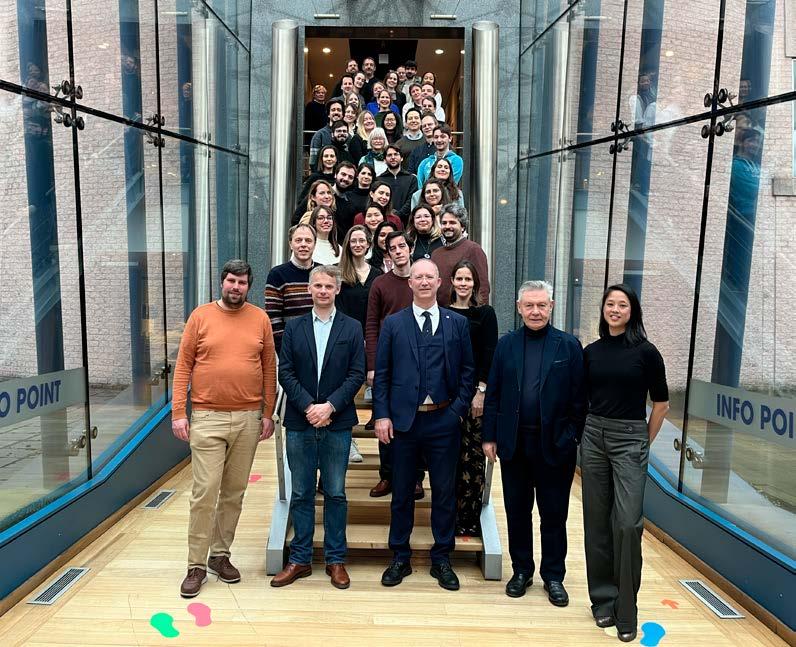
The Board is responsible for the appointment of all staff at the Institute of European Studies (IES). However, substantial ZAP appointments and tenure must be confirmed by the Academic Board of the university. Appointments of administrative staff are undertaken by daily management (the ExCom).
The total number of people on the IES payroll in 2024 amounted to 127 (64.44 full-time equivalents, as opposed to 58.5 FTE the year before). There were 61 men (or 48%) and 66 women (or 52%). Additionally, we also seconded 2.63 FTE to UNU-CRIS.
An additional 65 people were associated with the Institute (47 as an associate fellow, 15 as a visiting fellow, one Advisor, one Senior Researcher and our President). 17 different job students helped with basic research tasks and administration, and we welcomed 12 interns. During the year, 9 people left the Institute, while 19 new people joined the IES staff.
The Institute is headed by a Dean who is assisted by a vice-Dean (for education), an Executive Director and a Head of Secretariat.
Junior academic staff members are managed by their supervisors (in the case of PhD researchers) and/or by the project coordinators (in the case of project researchers). Progress and functioning of PhD researchers on the IES budget are presented annually and scrutinised by the Board. Other PhD researchers follow the procedures of the VUB and are assessed by their respective faculties.
The management of the Secretariat falls under the authority of the Executive Director and the Head of Secretariat. Benchmarks are set for all secretariat personnel and an evaluation is conducted every year. Secretariat cluster coordinators serve as intermediaries between IES management and staff.
The following people left the Institute in 2024:
• Olesya Tkacheva – 29 February 2024
• Patrizia Cogo Morales – 26 April 2024
• Jón Jónsson – 2 May 2024
• Marleen Van Impe – 31 May 2024 (retired)
• Marianna Lovato – 31 July 2024
• Xiuling Ye – 10 September 2024
• Anne Sterckx – 30 September 2024
• Joeri Daman – 14 October 2024
• Ludmila Cieszkowsky – 8 November 2024
• The Centre for Environment, Economy and Energy welcomed Kata Dózsa as a Postdoctoral Researcher.
• Manoëlle Koninckx started in March as a Project Researcher at the Centre for Environment, Economy and Energy.
• In March, the Centre for Environment, Economy and Energy also welcomed Jérôme Vanwelde as a Project Researcher.
• Ferruccio Barazzutti joined the Research Centre for Digitalisation, Democracy and Innovation as a Project Manager.
• From April onwards, Basak Van Hove joined the Centre for Digitalisation, Democracy and Innovation as a Project Coordinator.
• April also saw the arrival of Piero Barlucchi, who joined the Centre for Security, Diplomacy and Strategy as a Project Officer.
• Lea Schewe started as a PhD Researcher at the Centre for Environment, Economy and Energy.
• In September, Lukas Spielberger joined the Research Centre for Security, Diplomacy and Strategy as a Postdoctoral Researcher.
• Riccardo Bosticco joined the Security, Diplomacy and Strategy Research Centre as a PhD Researcher.
• September also saw the arrival of Thao Pham who joined the Centre for Security, Diplomacy and Strategy as a PhD Researcher.
• Salih Işık Bora joined the Research Centre for Security, Diplomacy and Strategy as a Postdoctoral Researcher.
• Marta Montesinos started as a PhD Researcher at the Centre for Environment, Economy and Energy.
• Mahmoud Javadi joined the Security, Diplomacy and Strategy Research Centre as a PhD Researcher.
• October also saw the arrival of PhD Resarcher Katharine Woolrych at the Centre for Migration, Diversity and Justice.
• The Centre for Migration, Diversity and Justice also welcomed Amal Miri as a Postdoctoral Researcher.
The institute also attracted a number of new self-funded PhD students
• Joris Teer
• Giancarlo Altieri
• Domenico Farinelli
• Mai Nguyễn
• Laura Peña
Since 2020 the IES works in close collaboration with VeCo under the name Brussels School of Governance (BSoG) where a number of synergies on secretariat level have been carried out. As such, several secretarial tasks are now done jointly. Through timesheets/ functional differentiation each organisation (IES, VeCo) is built for its receptive share.
• In October, the Centre for Security, Diplomacy and Strategy also welcomed Ivan Zaccagnini as a PhD Researcher.
In 2024, the following people were paid on IES payroll, but shared between IES and VeCo:
• HR: Laura De Decker
• Marketing, Communication & Recruitment: Jurgen Smet, Maja Kovacevic and Charlotte Marie Dooms
• Education: René Hermens and Sarah Konaté
• Events: Isabelle Tenaerts
• Info: Melissa Bax
• IT: Peter Menke
• Research Project Officer: Corinna Karlsen
Conversely, the following people were paid on VeCo payroll, but worked for both institutes:
• Finance: Jérôme Playoult
• Events : Marina Sousa Ornelas
• Education : Rita Silva Reis, Heidi Martin, Constanza Fernanda Vargas Gomez, Zarine Momin and Xiangmei Shi
• Marketing, Communication & Recruitment: Juan Carlos Ruiz Coll
• Management Assistant : Joeri Daman*
The IES is also employing/managing the administrative staff based at UNU-CRIS in Bruges: Noël Neven, Andrew Dunn and Ajsela Masovic. Moreover, the IES admin staff also counts five coordinators embedded in one of its research centres: Jessica Callebaut, Paula Cantero Dieguez, Patrizia Cogo Morales, Tereza Maarova, Natalia Martin.
Since 2020, management costs are also shared between the IES and VeCo:
• President: Karel De Gucht
• Dean: Florian Trauner
• Vice Dean for Education: Sven Van Kerckhoven
• Executive Director: Anthony Antoine
• Head of Secretariat: Jacintha Liem (ad interim Laura De Decker until April 2024 following maternity leave)
• Alexander Mattelaer
• Andreea Budeanu
• Ben Smulders
• Brendan Moore
• Caroline Buts
• Caterina Carta
• Clément Perarnaud
• Daniel Fiott
• Demir Murat Seyrek
• Dirk Arts
• Florian Trauner
• Frank Hoffmeister
• Hannah Vermaut
• Harri Kalimo
• Hielke Hijmans
• Honghui Pan
• Ilke Adam
• Ingmar Von Homeyer
• Irina Van Der Vet
• Iva Dodevska
• Jamal Shahin
• Johan Verbeke
• Jonas Lefevere
• Joris Van Hoboken
• Karel De Gucht
• Kata Dózsa
• Koert Debeuf
• Laura Westerveen
• Leo van Hove
• Liliana Lizarazo Rodriguez
• Luis Simon
• Luk Van Langenhove
• Lukas Spielberger
• Mai Van Tran
• Marianna Lovato*
• Max Nagel
• Munira Aminova
• Olesya Tkacheva*
• Philipp Stutz
• Philippe De Lombaerde
• Raluca Csernatoni
• Salih Işık Bora
• Sean O’Dubhghaill
• Sebastian Oberthür
• Stefaan Van Der Jeught
• Stephan Klose
• Stijn Van der Perre
• Sven Van Kerckhoven
• Tom Willaert
• Tongfi Kim
• Tony Joris
• Trisha Meyer
• Youri Devuyst
• Ana Fernandez Inguanzo
• Antti Jukka
• Aslak Busch
• Carlos Alejandro Entrena Serrano
• Daniel Alejo
• Domenico Farinelli
• Eleanor Mateo
• Elene Metreveli
• Elie Perot
• Fabio Figiaconi
• Folashade Ajayi
• François Gardin
• Gabriel Heyl
• Gaia Romeo
• Gauri Khandekar
• Giancarlo Altieri
• Hanna Schneider
• Ivan Zaccagnini
• Jana Gheuens
• Jérôme Vanwelde
• Jihye Kang
• João Daniel Teixeira de Freitas
• Jón Jónsson*
• Joris Teer
• Laura Peña
• Laura Vansina
• Lea Schewe
• Lina Kirjazovaite
• Lotje Boswinkel
• Louise Hantson
• Ludmila Cieszkowsky*
• Ludovica Meacci
• Maaike Verbruggen
• Mahmoud Javadi
• Mai Nguyễn
• Manoëlle Koninckx
• Marta Montesinos
• Matilda Axelson
• Nadia Tjahja
• Nathalie Van Raemdonck
• Octavian Manea
• Omar Cham
• Orsolya Gulyas
• Riccardo Bosticco
• Samuel Cipers
• Samuel Johns (passed away in 2024)
• Simon Happersberger**
• Simon Otto
• Sophie Hoogenboom
• Thao Pham
• Tomas Wyns
• Xiu Ling Ye*
In 2024, the IES also employed/managed the administrative staff based at UNU-CRIS in Bruges. UNU-CRIS has started taking over these contracts, so that as of 2026 the secondment of personnel of IES to UNU-CRIS will end.
• Noël Neven
• Andrew Dunn*
• Ajsela Masovic*
* left the institute in the course of 2024 ** funded through FWO

Quality control is measured ex ante as well as ex post at various levels and in different formats. In terms of attracting academic staff and administrative personnel, the IES applies the highest standards through a quality control procedure. The IES Board, the Research Council, the Education Council, and the Executive Committee safeguard the overall quality of their respective areas, at various moments assisted by the different quality control mechanisms of the university at large. In its financial management, the IES implements both internal and external control; equally in its services, the IES delivers the best possible services and tries to improve them through feedback from its clients.
Quality is aimed for through competitive, open and international recruitment procedures and through a monitoring system of benchmark meetings and student feedback (for the academic staff) and performance reviews (for the administrative staff).
The selection of senior academic staff is done on the basis of interviews and selection by an independent committee that also includes external experts. Potential teaching staff who will be in front of a class for the first time must also give a test lecture that is assessed by both colleagues and students. Teaching staff are further assessed by the Academic Council of the university before a final appointment is made. Candidates for professorships (ZAP) also follow VUB university appointment procedures.
For research, special attention is paid to the recruitment of doctoral students. Every year, the IES makes a competitive selection in which the best projects (coupled with excellent CVs of potential researchers) are chosen. Doctoral students are primarily monitored by their promoter and the doctoral committee, but the (doctoral) research is also structurally embedded into one of the Institute's research centres. In addition, periodic research colloquiums are organised (mandatory for doctoral researchers), in which the researcher is subjected to peer review. Professor Caterina Carta has been appointed PhD Director, to further improve and structure the guidance provided to our PhD researchers.
In 2024, the IES launched five PhD calls, two on IES funding and three on project funding. After interviews with the most promising candidates by the research centre directors and a team of scholars and staff, eventually five PhD researchers were appointed by the IES Board and awarded a scholarship for a maximum duration of four years. A sixth PhD call was launched late 2024.
The quality of personnel is further monitored through periodical evaluations. For IES ZAP professors, individual benchmark meetings are conducted every two years with the Dean. In 2024, a schedule for these meetings has been set up, while the university has also opened a new position of Academic Director, for which elections will be held in January 2025. Whereas the Dean is to make contractual decisions (in conjunction with the Board), the new Academic Director is to coach professors to advance them in their respective careers.
PhD researchers meet their promoter and supervisory committee at least twice a year, while all other academic personnel are assessed on a yearly basis. At Secretariat level, administrative staff are evaluated through the VUB’s TEO assessment procedure. In 2024, the individual meetings took place in November and December.
In addition, sustainability is achieved by efforts to retain excellent staff. Attention is paid not only to the possibility of promotion, but also to flexibility alternatives (such as teleworking). In the framework of lifelong learning, a modest budget foresees support for individual or collective training sessions and/or extra courses. In addition, IES staff has access to VUB’s LRN system, which offers a variety of trainings on both soft and hard skills.
PhD and senior researchers are appointed after a thorough selection procedure involving an international call for applications, including external scrutiny and interviews (see above). Research progress of PhD students is monitored continuously by the promoter, the doctoral committee (twice per year), the responsible senior IES researcher, the Vice-Dean for Research, and the PhD Director, in accordance with IES PhD Guidelines (incorporated in the Guidelines for Academic Staff). In the process of this quality control, junior researchers present a state of affairs of their findings at least once per year at research colloquiums (held biweekly). There is a close collaboration with the Doctoral School in Social Sciences, organised by the university as a whole.
Teaching staff are recruited through international vacancy announcements, subject to external scrutiny, interviews and trial lectures. Students annually assess the quality of the teachers / courses through feedback forms. The Dean, the Vice-Dean for Education, as well as the Programme Directors of the respective programmes oversee the follow-up of programme questions relating to teaching, learning and the overall learning objectives of both modules and programmes. In addition, by monitoring a central database, the VUB ensures quality control when entering course descriptions, exam methodology, and student guidance.
The IES ensures a strict selection of students, with a high level of student intake. Student selection is monitored and analysed by Programme Directors and the respective programme boards. In addition, its educational programmes are accredited and subject to periodical VUB and student evaluations.
Students in the Advanced Master programmes, the Postgraduate programmes and in the IES Summer and Winter Schools are carefully selected, based on their study background and results, their command of English, their suitability and motivation, as well as the contact details of referees who are available for feedback on the candidate. Applicants for the Advanced Master programmes need to have a Master's degree before starting their studies at the IES. Exceptionally, highly motivated BA students are admitted, but only if they have a study background of at least 240 ECTS (which equals a Belgian Master programme).
The IES monitors the quality of its services (events) through a combination of research centre processes, by measuring marketing efforts, and by conducting post-event evaluations. For all relevant major physical or digital activities organised at the IES, an evaluation (by form, email, or phone conversation) is done after the event to assess the quality of the service. Based on this feedback and experience, regular internal reviews are carried out where strengths and weaknesses are assessed in order to identify potential for improvement. In terms of quality and maintenance of our equipment, the technical team carries out checks prior to the event. An important update that happened in 2024 in the area of technical equipment is the renovation of all audiovisual equipment in our classrooms and meeting rooms, which led to the IES having now the most advanced equipment of the entire VUB. For catering services, the IES works with ‘green’ suppliers that comply with standard hygiene and service regulations and that pay special attention to using sustainable materials. Extensive online and social media evaluations of all major activities lead to optimal analysis of the impact of events on different target groups. This monitoring process is currently assessing visibility of research, societal relevance, and knowledge transfer.
The Finance Department is supervised by the Executive Director, who in turn reports to the IES Board. The annual accounts as well as the IES’ financial policy and processes are audited and vetted annually by external independent auditors and are ultimately also checked by the office of the Government Commissioner. Additionally, all EU funded projects that require external auditing are thoroughly reviewed and audited upon completion and prior to submitting final reporting to the relevant authorities.

As budgeted, the IES breaks even at the end of its financial year. Although a very small loss was calculated in the budget, the Institute has a modest positive result (+44K EUR) on a total turnover of 7.8 million EUR. The positive results can be attributed to the growth in the number of externally funded projects and to several positive financial operations. Now that the Institute has managed to capitalise on a third ERC project and is also working on more than 27 European projects, the income stream from externally funded projects has risen even further from 3.2 million EUR to 3.5 million EUR. The increase in turnover is also the result of an intensified collaboration with Vesalius College, which makes use of a number of IES services (and vice versa). Since the Institute was recognised as a service within the VUB, the financial flows between the parent institution and the IES have changed. They have been simplified and fit better into the overall financial architecture of the VUB. The IES pays a fixed sum for the use of the infrastructure and central services, while the projects provide for an overhead payment of 20% (except for older projects where it is 17%). In addition, the IES also pays a contribution per student. All of this means that the IES, in addition to its research, education and reputation, also contributes financially to the operation of the university, for a total of 613K EUR.
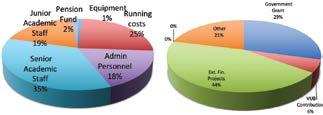
Conversely, the IES can also rely on the services of the VUB and on academic contributions from the Faculty of Economics and Social Sciences, with which a Service Level Agreement has been concluded. This stipulates that the faculty provides scientific staff to the IES (since October 2024 accounting for 0.7 FTE or provisionally 36K EUR on an annual basis). In exchange, the IES also provides services to the ES faculty, creating a win-win situation.
After several loss-making years in the past (in which the loss could be absorbed by reserves), the IES has had a positive final result since 2023. The further restructuring of the education portfolio, which began in 2023, and the resulting increase in student numbers will also lead to positive results in the future, meaning that the financial situation of the IES can be considered healthy. The current project reserves are sufficient to finish the ongoing projects and to maintain the current research base. The only point of attention is the free reserves for the possible start-up of new initiatives or the absorption of crises. These are currently limited, but the intention is to increase them to an acceptable level in the future. The synergies with Vesalius College within the Brussels School of Governance alliance are a first key to this. If the VUB can also carry out the infrastructure upgrades promised in 2019 next year, the Institute will be able to realise its further growth ambitions.
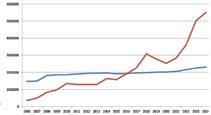
• De Lombaerde, P. (Ed.), Lietaert, I., Pécoud, A., Casalin, D., Hoogenboom, S., Shahin, J., Soete, L., Lesage, D., Rayp, G., Standaert, S., Debray, A., & Lizarazo-Rodriguez, L. (2024). Handbook of Regional Cooperation and Integration. Edward Elgar Publishing Limited. https://doi.org/10.4337/9781800373747
• Debeuf, K. (2024). The Influence of Averroes on European Thought: The Disappearance of Latin Averroism form the History of Philosophy. (Bloomsbury Series on World Philosophy). Bloomsbury.
• Van Kerckhoven, S., & Chohan, U. (2024). Decentralized Autonomous Organizations: Innovation and Vulnerability in the Digital Economy. (Routledge Studies in the Economics of Innovation). Routledge.
• Adam, I., & Xhardez, C. (2024). How sub-state nationalism and immigrant integration policies entwine over time: a spotlight on Flanders. In M. Samers, & J. Rydrgren (Eds.), Migration and Nationalism: Theoretical and Empirical Perspectives (pp. 174–196). Edward Elgar. https://doi.org/10.4337/9781839100765.00015
• Cepparulo, A., & Pasimeni, P. (2024). Trends in Defence Spending in the European Union. In F. Cerniglia, & F. Saraceno (Eds.), European Public Investment Outlook 2024 - Investing in the Structural Transformation (pp. 149168). Open Book Publishers. https://doi.org/10.11647/obp.0434.10
• Chohan, U., & Van Kerckhoven, S. (2024). Conclusion. In S. Van Kerckhoven, & U. Chohan (Eds.), Decentralized Autonomous Organizations: Innovation and Vulnerability in the Digital Economy (pp. 175-179). Routledge.
• De Lombaerde, P. (2024). Build Your Own Regional Integration Indicator System. In P. De Lombaerde (Ed.), Handbook of Regional Cooperation and Integration (pp. 460-489). Edward Elgar Publishing Limited. https://doi. org/10.4337/9781800373747.00031
• De Lombaerde, P. (2024). Introduction to the Handbook of Regional Cooperation and Integration: Why, where, and so what? In Handbook of Regional Cooperation and Integration (pp. 1-20). Edward Elgar Publishing Ltd.. https://doi.org/10.4337/9781800373747.00007
• Fabris, A. L. (2024). Protecting Cultural Heritage during an Occupation. In International Courts versus NonCompliance Mechanisms (pp. 445-470). (International Courts versus Non-Compliance Mechanisms). Cambridge University Press. https://doi.org/10.1017/9781009373913.028
• Figiaconi, F. (2024). La riconfigurazione delle catene globali del valore tra Cina e ASEAN: quadro attuale e scenari futuri. In Osservatorio di Politica Internazionale: Cina e Indo-Pacifico (Vol. 6, pp. 32-37). Istituto per gli Studi di Politica Internazionale
• Fiott, D. (2024). Article 173 TFUE – L’industrie européenne de la défense. In E. Bernard, S. Rodrigues, & Q. Loiez (Eds.), L'Union européenne de la défense: Commentaire article par article (1st ed., pp. 559-577). Bruylant / Larcier. https://www.larcier-intersentia.com/fr/l-union-europeenne-defense-9782802772774.html#product.info. tab.description
• Fiott, D. (2024). Defence as a Core Pillar of European Integration. In C. Colomina, S. Russack, H. Sanchez Margalef, & I. Toygur (Eds.), European Elections 2024: A Turning Point for EU Integration? (2024 ed., Vol. 88, pp. 55-59). Barcelona Centre For International Affairs (CIDOB). https://www.cidob.org/en/publications/publication_ series/monographs/monographs/european_elections_2024_a_turning_point_for_eu_integration
• Fiott, D. (2024). Militärische Angriffe und die Europäische Union. In Risikobild 2024: Welt aus den Fugen (Vol. 2024, pp. 185-189). Bundesministerium für Landesverteidigung. https://www.bmlv.gv.at/pdf_pool/ publikationen/risikobild2024.pdf
• Gilli, A., Gilli, M., & Zaccagnini, I. (2024). Exploring the Benefits of a New Force Enabler: Defense AI in Italy. In Contributions to Security and Defence Studies (pp. 283-304). Springer. https://doi.org/10.1007/978-3-03158649-1_13
• Hantson, L., & Westerveen, L. (2024). De decentralisatie van integratiebeleid: coördinatie en samenwerkingsverbanden voor een geslaagde lokale aanpak. In G. Briels , & H. Grymonprez (Eds.), Bouwen aan een breed sociaal beleid: Cahier 11. Inclusief samenleven: lokale besturen als spil bij integratie en inburgering (Vol. 11). Politeia.
• Henrard, K. (2024). Visions of Legal and Substantive Citizenship and the League of Nations’ Minority Treaties. In S. Bober (Ed.), Post-World War One Plebiscites and Their Legacies (pp. 99-117). Central European University Press.
• Hijmans, H., & Van Brakel, R. E. (2024). Article 43 General conditions for the members of the supervisory authority. In E. Kosta, & F. Boehm (Eds.), The Law Enforcement Directive - A Commentary (pp. 637-646). Oxford University Press.
• Hijmans, H., & Van Brakel, R. E. (2024). Article 44 Rules on the establishment of the supervisory authority. In E. Kosta, & F. Boehm (Eds.), The Law Enforcement Directive - A Commentary Oxford University Press.
• Hoogenboom, S., Shahin, J., Morais, C., & Santaniello, M. (2024). Chapter 4 Regional Digital Governance. In P. De Lombaerde (Ed.), Handbook on Regional Cooperation and Integration (pp. 108-122). Edward Elgar.
• Javadi, M. (2024). Heavy Thunder, No Rain: Defense AI in Iran. In H. Borchert, T. Schütz, & J. Verbovszky (Eds.), The Very Long Game: 25 Case Studies on the Global State of Defense AI (pp. 421–444). (Contributions to Security and Defence Studies (CSDS) ). Springer. https://doi.org/10.1007/978-3-031-58649-1_19, https://doi. org/10.1007/978-3-031-58649-1_19
• Kim, T., & Liss, C. (2024). Pirates, Illegal Fishing, and Other Illicit Activities in the South China Sea. In H. Hensel (Ed.), Security Dynamics in the South China Sea: Contemporary Challenges and Opportunities (1 ed., pp. 127145). Routlegde. https://doi.org/10.4324/9781032657493-9
• Lefevere, J., & Verwee, A. (2024). De politieke voorkeuren van Vlaamse ouderen: Politieke attitudes in het licht van de verkiezingen van 2024 . In D. Verté, J. Vranken, P. De Decker, & R. Crivit (Eds.), Recht op grijs: Bouwen aan ouderenbeleid Gompel&Svacina.
• Lizarazo-Rodriguez, L., & Casalin, D. (2024). Regional protection of human rights and the environment. In P. De Lombaerde (Ed.), Handbook of Regional Cooperation and Integration (pp. 197-222). Edward Elgar Publishing Ltd.. https://doi.org/10.4337/9781800373747.00017
• Mattelaer, A. (2024). A Nuclear Alliance. In J. A. Olsen (Ed.), Routledge Handbook of NATO (pp. 93-105). Routledge. https://doi.org/10.4324/9781003364108-10
• Qiao-Franco, G., & Javadi, M. (2024). Bridging the Gap between the North and South in the Governance of Dual-Use Artificial Intelligence Technologies. In L. Belli, & W. Gaspar (Eds.), AI from the Global Majority: Official Outcome of the UN IGF Data and Artificial Intelligence Governance Coalition (First ed., pp. 191-201). FGVDireito Rio. https://www.intgovforum.org/en/filedepot_download/279/28447
• Romeo, G. (2024). The safe country of origin (SCO) concept: a source of inequality in the treatment of asylum seekers in the EU. In Inequality and the European Union : New Frontiers in Political Science and Law (pp. 84-96). Routledge.
• Schneegans, S., & Soete, L. (2024). Regional science and innovation policies. In P. De Lombaerde (Ed.), Handbook of Regional Cooperation and Integration (pp. 326-350). Edward Elgar. https://doi. org/10.4337/9781800373747.00023
• Van Kerckhoven, S. (2024). The Emergence of DAOs in Public Policy. In S. Van Kerckhoven, & U. Chohan (Eds.), Decentralized Autonomous Organizations: Innovation and Vulnerability in the Digital Economy (pp. 13-22). Routledge. https://doi.org/10.4324/9781003449607-2
• Van Kerckhoven, S., & Chohan, U. (2024). Introduction. In S. Van Kerckhoven, & U. Chohan (Eds.), Decentralized Autonomous Organizations: Innovation and Vulnerability in the Digital Economy (pp. 1-11). Routledge.
• Van Raemdonck, N., & Meyer, T. (2024). Why Disinformation is Here to Stay. A Socio-technical Analysis of Disinformation as a Hybrid Threat. In L. Lonardo (Ed.), Addressing Hybrid Threats: European Law and Policies (pp. 57-83). Edward Elgar. https://doi.org/10.4337/9781802207408.00009
• Verhaert, P., Anrijs, S., Van Audenhove, L., & Ponnet, K. (2024). Digitale inclusie op de lokale beleidsagenda: hoe ontwikkelen vlaamse lokale besturen digitale-inclusiebeleid? In Bouwen aan een breed lokaal sociaal beleid (Cahier 13): Digitale inclusie: lokale besturen aan zet (Vol. 13, pp. 47-70). Politeia. https://www.politeia. be/shop/bouwen-aan-een-breed-lokaal-sociaal-beleid-cahier-13-digitale-inclusie-lokale-besturen-aan-zet16407#attr=1122
• Ahunov, M., & Van Hove, L. (Accepted/In press). Does mobile payment adoption really increase online shopping expenditure in China? Yang et al. revisited. Econ Journal Watch.
• Barlucchi, P. (2024). Dall'altra parte dello Stretto: le elezioni a Taiwan - Dialogo con Lorenzo Lamperti. Opinio Juris, 2024(1), 28-35.
• Barlucchi, P. (2024). From Atalanta to Aspides: Old and New Challenges for EU Maritime Operations. IAI Commentaries, 24(12).
• Barlucchi, P. (2024). La proiezione cinese nello scacchiere del Mar Cinese Meridionale. Opinio Juris in Comparatione , 2024(1), 28-35.
• Barlucchi, P. (2024). Sailing through dangerous waves: the EU’s expanding toolbox at sea. European Policy Review, 7(1), 89-99. https://esthinktank.com/epr-volume-7/
• Bora, S. I. (2024). Neoliberal means to dirigiste ends: explaining the French government’s use of Heroic Industrial Policy Discourse (HIPD) in EU politics. French Politics.
• Bora, S. I., & Schramm, L. (2024). Intergovernmentalism in a supranational field: France, Germany, and EU competition policy reform. West European Politics. https://doi.org/10.1080/01402382.2024.2355812
• Bosticco, R., & Herranz-Surrallés, A. (2024). Industrial Alliances for the Energy Transition: Harnessing Business Power in the Era of Geoeconomics. Politics and Governance, 12, [8221]. https://doi.org/10.17645/pag.8221
• Boswinkel, L. (2024). Forever Bound? Japan’s Road to Self-defence and the US Alliance. Survival: Global Politics and Strategy, 66(3), 105-128. https://doi.org/10.1080/00396338.2024.2357483
• Bui, T. T. L., Dewitte, R., Happersberger, S., Nagabhatla, N., & Rayp, G. (2024). Environmental Impact Assessments of Trade Agreements: Towards a Systematic and Comprehensive Application. G20 Brasil 2024. T20 Policy Brief. https://t20brasil.org/media/documentos/arquivos/TF04_ST_02_Environmental_ Impac6700210677843.pdf
• Buts, C., & Vandendriessche, R. (2024). Buitenlandse subsidies die de interne markt verstoren. Tijdschrift voor Staatssteun , 2024(3), 118-123. https://denhollander.info/artikel/18396
• Buts, C., Agnieszka Cyndecka, M., De Cock, W., Ølykke, G., & Segura, M. (2024). Review of EU Case Law on State Aid - 2023 Part Two. European State Aid Law Quarterly, 23(3), 294-338. https://doi.org/10.21552/estal/2024/3/8
• Buts, C., Cyndecka, M., De Cock, W., Ølykke, G., & Segura, M. (2024). Review of EU Case Law on State Aid – 2023: Part I: Notion of Aid. European State Aid Law Quarterly, 23(2), 173-199. https://doi.org/10.21552/ estal/2024/2/10
• Buts, C., Langenus, M., Maes, S., & Vonck, I. (2024). The End of the Block Exemption for Liner Shipping. Journal of European Competition Law and Practice, 15(5), 323-329. https://doi.org/10.1093/jeclap/lpae044
• Calcara, A. (2024). Governments and Markets in the Digital Age. International Studies Review, 26(1), [viae007]. https://doi.org/10.1093/isr/viae007
• Calcara, A., & Simón, L. (Accepted/In press). Face to face: France, Germany and the future of the European defence industry. Journal of European Public Policy. https://doi.org/10.1080/13501763.2024.2358112
• Cham, O. N. (2024). “Even if I am going to die, I must go”: Understanding the influence of predestination thinking on migration decision-making in the Gambia. International Migration, 62(6), 45-58. [N/A]. https://doi. org/10.1111/imig.13317
• Christie, E. H., Buts, C., & Du Bois, C. (2024). Exploring the speed of change: European defence budgets in an age of danger. Defense & Security Analysis, 40(3), 319-340. https://doi.org/10.1080/14751798.2024.2361513
• Christou, G., Meyer, T., & Fanni, R. (2024). The European union: assessing global leadership through actorness in artificial intelligence. Journal of European Integration. https://doi.org/10.1080/07036337.2024.2377200
• Cipers, S., & Meyer, T. (2024). Free Speech is Not Free Reach: How Platforms Self-regulate Misinformation, Political Ads and Election Campaigns. Politique Européenne, 81(3), 110-121. [81]. https://www.cairn.info/revuepolitique-europeenne-2023-3-page-110
• Comerma, L. (2024). The Normative Influence of the Belt and Road Initiative in Europe. Journal of Current Chinese Affairs, 0(0), 1-14. https://doi.org/10.1177/18681026241277215
• De Beule, F., De Lombaerde, P., & Zhang, H. (2024). The Chinese Belt and Road Initiative: strategic responses of governments and multinational companies. Asia Pacific Business Review, 30(2), 209-219. https://doi.org/10.10 80/13602381.2022.2093529
• De Lombaerde, P., Moldashev, K., Qoraboyev, I., & Taghon, S. (2024). Strategic responses of regional economic organizations to the Chinese Belt and Road Initiative: the cases of ASEAN, EAEU, and EU. Asia Pacific Business Review, 30(2), 399-419. https://doi.org/10.1080/13602381.2022.2093526
• Devroe, R., & Wauters, B. (2024). Gendered Divides: Exploring How Politicians’ Gender Intersects with Vertical Affective Polarisation. Politics of the Low Countries, 144-165. https://doi.org/10.5553/PLC/.000082
• Dodevska, I. (2024). Boundary integrationism and its subject: shifts and continuities in the EU framework on migrant integration. Journal of Ethnic and Migration Studies, 50(4), 748-771. https://doi.org/10.1080/136918 3X.2023.2247170
• Dodevska, I. (2024). The production of “evidence” for migrant integration policy in the European Union. Migration Studies, 12(4), [mnae032]. https://doi.org/10.1093/migration/mnae032
• Dodevska, I., & Nimer, M. (2024). Towards Reflexivity in the Study of Mobility and Diversity: Theories, Positionality and The Political Economy of Knowledge Production (Introduction to Special Issue). Migration Studies.
• Doppen, F., Calcara, A., & De Bièvre, D. (2024). Balancing security and economics: domestic state-firm relations and investment screening mechanisms in Europe. Review of International Political Economy, 31(6), 1637-1661. https://doi.org/10.1080/09692290.2024.2368601
• Dupont, C., Moore, B., Boasson, E. L., Gravey, V., Jordan, A., Kivimaa, P., Kulovesi, K., Kuzemko, C., Oberthur, S., Panchuk, D., Rosamond, J., Torney, D., Tosun, J., & Von Homeyer, I. (2024). Three decades of EU climate policy: Racing toward climate neutrality? Wiley Interdisciplinary Reviews: Climate Change, 15(1), 1-12. [e863]. https:// doi.org/10.1002/wcc.863
• Figiaconi, F. (2024). Punching Above Their Weight: EU Small Powers and the Indo-Pacific. 9DashLine. https:// www.9dashline.com/article/punching-above-their-weight-eu-small-powers-and-the-indo-pacific
• Figiaconi, F. (2024). The Intensification of Sino-Cambodian Relations: Geostrategy Beyond Infrastructural Development? ISPI-Italian Institute for International Political Studies. https://www.ispionline.it/en/publication/ the-intensification-of-sino-cambodian-relations-geostrategy-beyond-infrastructural-development-167910
• Fiott, D. (2024). From Liberalisation to Industrial Policy: Towards a Geoeconomic Turn in the European Defence Market? JCMS: Journal of Common Market Studies, 62(4), 1012-1027. https://doi.org/10.1111/jcms.13600
• Fiott, D. (2024). The Challenges of Defence Spending in Europe. Intereconomics, 59(4), 189-192. https://doi. org/10.2478/ie-2024-0039
• Fiott, D. (2024). The Turning Tide? A European Agenda for the Washington Summit. CSDS In-Depth Papers, 9(2024), 1-14.
• Freitas, J. T. D. (2024). Prioritisation under Value Chain Due Diligence. European Journal of Risk Regulation, 15(4), 985-998. https://doi.org/10.1017/err.2024.19
• Gheuens, J. (2024). Context Matters: Variation in the Shortsightedness of European Climate Policy. JCMS: Journal of Common Market Studies, 1-19. https://doi.org/10.1111/jcms.13644
• Hantson, L., Westerveen, L., & Adam, I. (2024). Party politics across levels of governance: relational dynamics of immigrant integration policy making in Belgian cities. Local Government Studies, 1-20. https://doi.org/10.1080/ 03003930.2024.2382213
• Hodson, D., Howarth, D., Mugnai, I., & Spielberger, L. (2024). Accountability in pan-European borrowing: mind the gap. West European Politics, 48(3), 696-722. https://doi.org/10.1080/01402382.2024.2321559
• Kim, T., & Lee, D. Y. (2024). Continuity and changes: the effects of Russia’s war against Ukraine on Japanese and South Korean nuclear-weapons discourse. The Nonproliferation Review, 30(4-6), 265-284. https://doi.org/10.10 80/10736700.2024.2435143
• Kleczka, M., Vandercruysse, L., Buts, C., & Du Bois, C. (2024). The Spectrum of Strategic Autonomy in EU Defence Supply Chains. Defence and Peace Economics, 35(4), 427-447. https://doi.org/10.1080/10242694.202 3.2180588
• Klose, S. (2024). Re-defining evidence-based policing. Policing, 18, [paad095]. https://doi.org/10.1093/police/ paad095
• Kulovesi, K., Oberthur, S., van Asselt, H., & Savaresi, A. (2024). The European Climate Law: Strengthening EU Procedural Climate Governance? Journal of Environmental Law, 36(1), 23-42. https://doi.org/10.1093/jel/ eqad034
• Lizarazo-Rodríguez, L., Lombaerde, P. D., Carrera, M. A. L., & Londono, C. (2024). Investment Projects and the Protection of Indigenous Peoples and Territories in Colombia. Latin American Policy , 15(2), 288-319. https://doi. org/10.1111/lamp.12339
• Lizarazo-Rodriguez, L., Lopes Fabris, A., & Montag, D. (2024). Indigenous Peoples as Trustees of Forests: A Bio-Socio-Cultural Approach to International Law. International Environmental Agreements: Politics, Law and Economics. https://doi.org/10.1007/s10784-024-09654-w
• Lopes Fabris, A. (2024). A prática dos estados asiáticos na implementação do princípio de proteção de monumentos e obras de arte antes da Primeira Guerra Mundial. Revista Brasileira de História & Ciências Sociais, 16(32), 139-158. https://doi.org/10.14295/rbhcs.v16i32.16429
• Maes, S., Buts, C., & Jegers, M. (Accepted/In press). The Impact of Dawn Raids, Cartel Decisions and Appeals on Stock Prices. Journal of Industry, Competition and Trade, 25. https://doi.org/10.1007/s10842-024-00432-7
• Meyer, T., & Vetulani-Cęgiel, A. (2024). Transparency as an empty signifier? Assessing transparency in EU and platform initiatives on online political advertising and actors. Policy & Internet. https://doi.org/10.1002/poi3.417
• Michel, E., Feitosa, F., Lefevere, J., Pilet, J-B., Erkel, P. V., & Haute, E. V. (2024). Studying dimensions of representation: introducing the Belgian RepResent panel (2019–2021). European Political Science, 23(2), 199217. https://doi.org/10.1057/s41304-023-00430-z
• Moore, B., Geese, L., Kenny, J., Dudley, H., Jordan, A., Pascual, A. P., Lorenzoni, I., Schaub, S., Enguer, J., & Tosun, J. (2024). Politicians and climate change: A systematic review of the literature. Wiley Interdisciplinary Reviews: Climate Change, 15(6), 1-17. [e908]. https://doi.org/10.1002/wcc.908
• Mountjoy, M., Verhelle, H., Finnoff, J. T., Murray, A., Paynter, A., Pigozzi, F., Tooth, C., Verhagen, E., & Vertommen, T. (2024). Infographic. Medical management of harassment and abuse in sports. #WhatWouldYouDo? British Journal of Sports Medicine, 58(22), 1377-1378. https://doi.org/10.1136/bjsports-2024-108876
• Mountjoy, M., Verhelle, H., Finnoff, J. T., Murray, A., Paynter, A., Pigozzi, F., Tooth, C., Verhagen, E., & Vertommen, T. (2024). #WhatWouldYouDo? A cross-sectional study of sports medicine physicians assessing their competency in managing harassment and abuse in sports. British Journal of Sports Medicine, 58(22), 13531359. https://doi.org/10.1136/bjsports-2024-108210
• Nzally, J. (2024). Tackling irregular migration in a youth and civil society-led democratic change: Senegal’s new regime. Routed Magazine and iDiaspora, (25). https://www.routedmagazine.com/post/tackling-irregularmigration-in-a-youth-and-civil-society-led-democratic-change-senegal-s-new-regim
• Nzally, J. H. (2024). A Historical Perspective on Political Culture in Contemporary African Politics. Afrika Focus, 37(2), 292–314. https://doi.org/10.1163/2031356x-20240205
• Otto, S., & Oberthur, S. (2024). International cooperation for the decarbonization of energy-intensive industries: unlocking the full potential. Climate Policy, 1-17. https://doi.org/10.1080/14693062.2024.2397437
• Paricio Montesinos, M. (2024). Corporate Due Diligence in post-conflict settings: the role of civil society and victims in advancing environmental and human rights protection in Colombia. Revista española de empresas y derechos humanos, 2, 47-63. https://revistadeempresasyderechoshumanos.colex.es/wp-content/ uploads/2024/02/2.3.pdf
• Perot, E. (2024). The European Union’s nascent role in the field of collective defense: between deliberate and emergent strategy. Journal of European Integration, 46(1), 1-23. https://doi.org/10.1080/07036337.2023.22376
• Radu, R., Nanni, R., & Shahin, J. (2024). New challenges in Internet governance: Power shifts and contestation from “within”. Telecommunications Policy, 48(5), 1-5. [102740]. https://doi.org/10.1016/j.telpol.2024.102740
• Reiterer, M. (2024). NATO and the Republic of Korea: The AP4 in the Indo-Pacific. 38 North. https:// www.38north.org/2024/04/nato-and-the-republic-of-korea-the-ap4-in-the-indo-pacific/
• Roos, C., Nagel, M., & Seeliger, M. (2024). Theorising the effects of EU emigration for origin countries: win-win, dependency or agency? East European Politics, 40(4), 728-747. https://doi.org/10.1080/21599165.2024.23770 97
• Rothe, F-F., Van Audenhove, L., & Frantz, J. (2024). Digital Inequalities & the Post-2030 Development Goals: ‘Leaving No-One Behind’ in the Digital Context of the Next SDGs. Forum for Development Studies. https://doi.org /10.1080/08039410.2024.2443674
• Ryan, M., Tran, M. V., & Htut, S. Y. (2024). Strange Bedfellows or Trusted Comrades? Digital Solidarity Building among Myanmar’s Revolutionaries. Journal of Contemporary Asia, 54(5), 887-912. https://doi.org/10.1080/004 72336.2024.2330933
• Schneider, H. E. (2024). Intentions, Strategies, and Actions: How Refugees Exert Agency in the Resettlement and Humanitarian Admission Process from Jordan and Turkey to Germany. Refuge, 40(2), 1-17. https://doi. org/10.25071/1920-7336.41213
• Shahin, J. (2024). Dancing to the same tune? EU and US approaches to standards setting in the global digital sector. Journal of European Integration, 46(7), 1111-1131. https://doi.org/10.1080/07036337.2024.2398430
• Simón, L., & Figiaconi, F. (2024). Better safe than sorry: Why great powers accommodate high-value hedgers. Review of International Studies, 1-19. https://doi.org/10.1017/S0260210524000652
• Spielberger, L. (2024). EIB policy entrepreneurship and the EU’s regulation of Green Bonds. Journal of Economic Policy Reform. https://doi.org/10.1080/17487870.2024.2356810
• Spielberger, L., Hodson, D., Howarth, D., & Mugnai, I. (2024). Building a European Union ‘Treasury’: Explaining the European Commission's New Approach to Debt Issuance and Management. JCMS: Journal of Common Market Studies. https://doi.org/10.1111/jcms.13696
• Spinelli, G., Gastaldi, L., Van Hove, L., & Van Droogenbroeck, E. (2024). Can cluster analysis enrich the Innovation Resistance Theory? The case of mobile payment usage in Italy. Technology in Society, 79, 1-14. [102729]. https://doi.org/10.1016/j.techsoc.2024.102729
• Spinelli, G., Gastaldi, L., Van Hove, L., & Van Droogenbroeck, E. (2024). Can tax evasion be reduced by fostering cashless payments? A systematic literature review. The Journal of Financial Market Infrastructures, 11(4), 6593. https://doi.org/10.21314/JFMI.2024.009
• Stegen, H., Duppen, D., Savieri, P., Stas, L., Pan, H., Aartsen, M., Callewaert, H., Dierckx, E., & De Donder, L. (2024). Loneliness prevalence of community-dwelling older adults and the impact of the mode of measurement, data collection, and country: A systematic review and meta-analysis. International Psychogeriatrics, 36(9), 747-761. https://doi.org/10.1017/S1041610224000425
• Stutz, P., & Trauner, F. (2024). Democracy Matters (To Some Extent): Autocracies, Democracies and the Forced Return of Migrants from the EU. Geopolitics, 1-26. https://doi.org/10.1080/14650045.2024.2382460
• Tjahja, N. (2024). An agent of change: Youth meta-participation at the Internet Governance Forum. Telecommunications Policy, 48(5), [102758]. https://doi.org/10.1016/j.telpol.2024.102758
• Tjahja, N. (2024). The dynamics of meaningful youth participation: Mapping the purpose of participation of Youth Dialogue on Internet Governance participants. Policy & Internet. https://doi.org/10.1002/poi3.415
• Trauner, F., Brekke, J-P., Adam, I., Cham, O. N., & Thorbjørnsrud, K. (2024). “It’s not about the information, it’s about the situation”: Understanding the misalignment between EU deterrence messaging and migrants’ narratives. Journal of Ethnic and Migration studies, 50(14), 3379-3395. https://doi.org/10.1080/136918 3X.2024.2333865
• Tuters, M., Devries, M., De Zeeuw, D., Venturini, T., & Willaert, T. (2024). Reactionary sensemaking: Mapping the micropolitics of online oppositional subcultures. Big Data & Society, 11(1), 1-6. https://doi. org/10.1177/20539517241235879
• Van der Leene, A., & Van Audenhove, L. (2024). Wat is de mogelijke rol van de lokale politie met betrekking tot mediawijsheid? Voorlichting en preventie op het vlak van cybersecurity door de lokale politie in Vlaanderen en Brussel. Cahiers Politiestudies, (70), 173-184.
• Van Hove, L. (2024). Quantifying the economic value of customers' social networks: does Metcalfe's law apply? Frontiers in Communication, 9, [1365707]. https://doi.org/10.3389/fcomm.2024.1365707
• Van Hove, L., & Ahunov, M. (2024). Financial literacy: different indicator, different insights? Cogent Economics & Finance, 12(1), [2437005]. https://doi.org/10.1080/23322039.2024.2437005
• Van Hove, L., & Ahunov, M. (2024). How reliable are financial-literacy country rankings? Economics Bulletin, 44(4), 1457-1463. http://www.accessecon.com/Pubs/EB/2024/Volume44/EB-24-V44-I4-P115.pdf
• Van Hove, L., & Verbraecken, R. (2024). Gender roles and inflation expectations: D’Acunto et al. revisited. Review of Economics of the Household. https://doi.org/10.1007/s11150-024-09743-4
• Van Hove, L., Polasik, M., & Kotkowski, R. (2024). Revenues of network platforms: can they be expected to follow a growth ‘law’? Technology in Society, 78, [102645]. https://doi.org/10.1016/j.techsoc.2024.102645
• Vandendriessche, R., & Buts, C. (2024). Closing the Regulatory Gap? A Case Study on the Acquisition of a Semiconductor Producer under the EU Foreign Subsidies Regulation. Journal of European Competition Law and Practice, 15(2), 123-140. https://doi.org/10.1093/jeclap/lpae016
• Vandendriessche, R., & Buts, C. (2024). Examining data-related theories of harm in EU merger assessments: a systematic review of the decisional practice. Journal of European Competition Law and Practice, 15(6), 368378. https://doi.org/10.1093/jeclap/lpae046
• Vandendriessche, R., Maes, S., & Buts, C. (2024). Google's Antitrust Quandary: Data Ecosystem Building. European Data Protection Law Review, 10(1), 124-130. https://doi.org/10.21552/edpl/2024/1/18
• Vandercruysse, L., Dooms, M., & Buts, C. (2024). Public procurement of smart city services: An exploration of data protection related ex ante transaction costs. Digital Policy, Regulation and Governance, 26(6), 617-639. https://doi.org/10.1108/DPRG-11-2023-0159
• Verstraete, W. (2024). Anticipating Europe’s Nuclear Futures. The Washington Quarterly, 47(1), 85-100. https:// doi.org/10.1080/0163660X.2024.2327821
• Verstraete, W. (2024). Making Sense of European Disunity on Nuclear Weapon Questions. European Foreign Affairs Review, 29(3), 361-378. https://doi.org/10.54648/eerr2024016
• Verstraete, W. (2024). Strengthening the Political Credibility of NATO Extended Nuclear Deterrence. Egmont Policy Brief, 332, 1-6. https://www.egmontinstitute.be/strengthening-the-political-credibility-of-nato-extendednuclear-deterrence/
• Willaert, T., & Meyer, T. (2024). Knowledge refracted. A bibliometric analysis of conspiracy texts on Telegram. Radices , 4(1), 36-51. https://doi.org/10.21825/radices.91992
• Xu, L. (2024). The Evolution of China’s Foreign Talent Policy: the Case Study of Beijing. Chinese Political Science Review, 9(2), 200-221. https://doi.org/10.1007/s41111-023-00239-7
• Bosticco, R. (2024). EU Elections 2024: What do party manifestos say on key policy issues? European Policy Centre, 3-21. https://www.epc.eu/content/EU_elec.pdf
• Bosticco, R. (2024). Support for Ukraine epitomizes what we want our future to look like. European Policy Centre. https://www.epc.eu/content/Youth_Compendium_v6.pdf
• Bosticco, R. (2024). The Apulia G7 Summit – effective multilateralism or the last of its kind? European Policy Centre. https://www.epc.eu/en/publications/The-Apulia-G7-Summit-effective-multilateralism-or-the-last-of-itski~5bd9ac
• Boswinkel, L. (2024). Trump-Proofing NATO: 2% Won’t Cut It. Royal United Services Institute (RUSI). https:// www.rusi.org/explore-our-research/publications/commentary/trump-proofing-nato-2-wont-cut-it
• Boswinkel, L., Simón, L., Lanoszka, A., & Meijer, H. (2024). Alliance Networking in Europe and the Indo-Pacific. War on The Rocks. https://warontherocks.com/2024/12/alliance-networking-in-europe-and-the-indo-pacific/
• Fiott, D. (2024). Strategic Domains: Developing the EU’s Capabilities and Enablers for a Free and Secure Global Order. Future Europe journal, 2024(5), 1-4. https://feu-journal.eu/issues/issue-5/strategic-domains-developingthe-eus-capabilities-and-enablers-for-a-free-and-secure-global-order/
• Javadi, M. (2024). Future-Proofing AI Arms Control. Atlantisch Perspectief. https://www.atlcom.nl/artikelatlantisch-perspectief/future-proofing-ai-arms-control/
• Javadi, M. (2024). Two Paths Towards A Nuclear-Free Middle East. Carnegie Endowment for International Peace. https://carnegieendowment.org/sada/2024/02/nuclear-weapons-and-non-proliferation-in-the-middleeast?lang=en
• Kim, T. (2024). Partners in crime. IPS-Journal. https://www.ips-journal.eu/topics/foreign-and-security-policy/ partners-in-crime-7952/
• Mattelaer, A. (2024). Une ombre immense ? La montée en puissance militaire de la Chine en Indo-Pacifique et ses implications à l’échelle mondiale. Le Rubicon. https://lerubicon.org/une-ombre-immense-la-montee-enpuissance-militaire-de-la-chine-en-indo-pacifique-et-ses-implications-a-lechelle-mondiale/
• Qiao-Franco, G., & Javadi, M. (2024). Navigating the Governance of Dual-Use Artificial Intelligence Technologies in Times of Geopolitical Rivalries. Opinio Juris. https://opiniojuris.org/2024/04/03/symposium-on-military-aiand-the-law-of-armed-conflict-navigating-the-governance-of-dual-use-artificial-intelligence-technologies-intimes-of-geopolitical-rivalries/
• Simón, L., & Boswinkel, L. (2024). Ukraine, Europe, and the Art of the Deal. War on The Rocks. https:// warontherocks.com/2024/11/ukraine-europe-and-the-art-of-the-deal/
• Fernandez Inguanzo, A., & Meyer, T. (2024). Assessing the Assessments: Challenges and Recommendations for Ethical and Legal Impact Assessments from an applied perspective. Paper presented at IAMCR 2024, Christchurch, New Zealand.
• Fieremans, M., Erzeel, S., & Lefevere, J. (2024). Explaining politicians’ ambiguous communication: the role of gender and issue type. Paper presented at European Conference on Politics & Gender, Ghent, Belgium.
• Javadi, M. (2024). Prerequisites to a Resilient EU Defense Integration. Young Security Conference. https://www. youngsecurityconference.com/publications-and-media/prerequisites-to-a-resilient-eu-defense-integration
• Javadi, M. (2024). The Role of European Democratic Multilateralism in Shaping Global Military AI Governance. In O. Gill, & T. Street (Eds.), Pugwash UK (pp. 9-11). British Pugwash. https://britishpugwash.org/ai-implications-forpeace-and-security-articles-from-the-syp-conference-2024/
• Barlucchi, P. (2024). Sink or Swim? Revitalising NATO in European Maritime Security. CSDS Policy Brief, online version without clearcut number of pages.
• Boswinkel, L. (2024). Arming Ukraine: Can Europe’s Bilateral Defence Agreements Make The Difference? CSDS Policy Brief, (04/2024). https://csds.vub.be/publication/arming-ukraine-can-europes-bilateral-defenceagreements-make-the-difference/
• Calcara, A., Tricco, G. (2024). Outer Limits? Economic Security and the European Space Sector. CSDS Policy Brief (15/2024).
• Cornerma, L., Tercovich, G. (2024). Two Elections, One Challenge: EU Taiwan and the EU Playbook. CSDS Policy Brief (19/2024)
• Creutz, K., Javadi, M., Onderco, M., & Sinkkonen, V. (2024). The EU and military AI governance: Forging valuebased coalitions in an age of strategic competition. (137 ed.) Finnish Institute of International Affairs (FIIA).
• Dupont, C. (2024). Boosting European climate policy with a resilient knowledge-sharing framework. C3E Policy Brief, (03/2024)
• Ernst, M. (2024). De-Risking: How Germany’s Indo-Pacific Deployments Support Berlin’s Economic Strategy Towards China. CSDS Policy Brief, 2024(2). https://csds.vub.be/publication/de-risking-how-germanys-indopacific-deployments-support-berlins-economic-strategy-towards-china/
• Fiott, D. (2024). Keep it Moving: From Mobility to Logistics in European Defence. CSDS Policy Brief, 2024(26), 1-4. https://csds.vub.be/publication/keep-it-moving-from-mobility-to-logistics-in-european-defence/
• Fiott, D. (2024). Security of Supply: How Can the EU Help Ensure Defence Preparedness? CSDS Policy Brief, 2024(24), 1-4. https://csds.vub.be/publication/security-of-supply-how-can-the-eu-help-ensure-defencepreparedness/
• Fiott, D. (2024). War Economy: Ukraine, the EU and the DTIB. CSDS Policy Brief (11/2024), 1-4.
• Gardin, F., Happersberger, S., Hugé, J, Kalimo, H. (2024). On the Edge of Extinctions or New Life in Environmental-Economic Governance? The Integration of Biodiversity Targets and Economic Policies. C3E Policy Brief, (02/2024)
• Grevi, G. (2024). Progress for Power: Why the EU needs a new EU Global Strategy. CSDS Policy Brief (22/2024).
• Javadi, M. (2024). Heavy Thunder, No Rain: Defense AI in Iran. Defense AI Observatory. https://defenseai.eu/wpcontent/uploads/2024/03/daio_study2425_heavy_thunder_no_rain_mahmoud_javadi.pdf
• Kalimo, H., Mateo, E., Happersberger, S., Jansson, M., & Majcher, K. (2024). Treading the environment- trade nexus: coherence of EU trade agreements and WTO law with the European Green Deal. Brussels School of Governance.
• Kattel, R., & Soete, L. (2024). European security in a changing geo-political context: From the European Research Area to the European Defence Research and Innovation Area and from Cohesion to European territorial security policy.
• Kim, J., Simon, L. (2024). Nuclear Puzzles: What Can South Korea Learn from NATO's Experiences as a Nuclear Alliance? CSDS Policy Brief (36/2024).
• Kim, S., Pacheco Parco, R. (2024). Proven Partners: Towards the Implementation of the ROK-NATO Tailored Partnership. CSDS Policy Brief (33/2024)
• Kim, T. (2024). By Any Other Name? The Camp David Summit, US-Japan-South Korea Trilateral Security Cooperation and Military Alliances. CSDS Policy Brief (01/2024). https://csds.vub.be/publication/by-any-othername-the-camp-david-summit-us-japan-south-korea-trilateral-security-cooperation-and-military-alliances/
• Lizarazo-Rodríguez, L., & Fahlbusch, M. (2024). Due diligence and corporate accountability in the arms value chain. International Peace Institute Service IPIS.
• Marien, I., Van Audenhove, L., van Leeuwen, C., Duelen, A., Verhaert, P., Rothe, F-F., Buyck, E., & Verlinden, G. (2024). Click-Call-Connect: Modellen voor een digitaal inclusief klantenproces bij dienstverleners in België . Séverine Waterbley. file:///Users/alineduelen/Downloads/Click-Call-Connect-Modellen-voor-een-digitaalinclusief-klantenproces-bij-dienstverleners-in-Belgie.pdf
• Mattelaer, A. (2024). Re-Empowering Belgian Foreign Policy. (Egmont Policy Briefs; No. 354). Egmont - Royal Institute for International Relations. https://www.egmontinstitute.be/app/uploads/2024/09/AlexanderMattelaer_Policy_Brief_354_vFinal.pdf
• Mattelaer, A., & Masuda, M. (2024). The Long Shadow? China’s Military Rise in the Indo-Pacific and its Global Implications. (18/2024 ed.) (CSDS Policy Briefs). Centre for Security, Diplomacy and Strategy (CSDS). https:// csds.vub.be/publication/the-long-shadow-chinas-military-rise-in-the-indo-pacific-and-its-global-implications/
• Missiroli, A. (2024). Games of Peace and War: Olympics and International Politics. CSDS Policy Brief (21/2024)
• Ortiz, W., Bonet, M. C., Hermwille, L., Pérez Català, A., Torres Gunfaus, M., Xia-Bauer, C., Filippidou, F., Khandekar, G. A., Otto, S., & Briand, Y. (2024). Report on Sectoral Conversations Methodology (NDC Aspects Deliverable 1.1). NDC ASPECTS. https://ndc-aspects.eu/sites/default/files/2024-06/NDC ASPECTS_D1-2-Report on SC approach-240603.pdf
• Pacheco Pardo, R. (2024). Brothers in Arms? The South Korea - NATO Relationship? CSDS Policy Brief (10/2024).
• Parks, L., Maarova, T, Oberthür, S. (2024). Fostering impactful activism for inclusive EU climate governance. C3E Policy Brief, (01/2024)
• Pejsova, E. (2024). Bound by Uncertainty: What Future for EU-Japan Security Cooepration?. CSDS Policy Brief (34/2024).
• Pejsova, E. (2024). Sisyphus at Work: The Japan-South Korea Rapprochement and its Implications for Europe. CSDS Policy Brief (07/2024).
• Rothe, F-F., Verhaert, P., Anrijs, S., van Leeuwen, C., Van Audenhove, L., & Ponnet, K. (2024). Digitale inclusie en digitale transformatie: Een multidimensionale benadering van inclusieve digitale dienstverlening. imec-SMIT, Vrije Universiteit Brussel. https://assets.vlaanderen.be/image/upload/v1723813326/ABB-ID_BVO3_digitale_ inclusie_en_digitale_transformatie_s2fozl.pdf
• Serger, S. S., & Soete, L. (2024). Changing innovation policies for territorial transformation: A synthesis of the work of the Partnerships for Regional Innovation (PRI) Scientific Committee. https://doi.org/10.2760/874552
• Spielberger, L. (2024). Financial Power Europe? The Challenges of EU Financial Assistance to Ukraine. CSDS Policy Brief (27/2024)
• Tercovich, G. et al. Navigating the Indo-Pacific: Strategic Priorities for the New EU Leadership. CSDS Policy Brief (30/2024)
• Trippl, M., Soete, L., Serger, S. S., Koundouri, P., & Pontikakis, D. (2024). Addressing the regional dimension of open strategic autonomy and European green industrial policy: New perspectives and pathways for impact. https://doi.org/10.2760/141776
• Uk, Y., Fiott, D. (2024). Manufacturing Defence: Europe, the Republic of Korea and Defence Industrial Cooperation. CSDS Policy Brief (35/2024).
• Verhaert, P., Anrijs, S., Rothe, F-F., Van Audenhove, L., & Ponnet, K. (2024). De toekomst van digitale inclusie op lokaal niveau: Aanbevelingen op basis van het Onderzoek Iedereen Digitaal. imec-SMIT, Vrije Universiteit Brussel. https://assets.vlaanderen.be/image/upload/v1718979846/ABB-ID_Aanbevelingen_v3_rc514e.pdf
• Verhaert, P., Anrijs, S., Van Audenhove, L., Rothe, F-F., & Ponnet, K. (2024). Leerlessen uit de digitaleinclusiewerking voor Oekraïense vluchtelingen in twee Vlaamse nooddorpen. imec-SMIT, Vrije Universiteit Brussel. https://assets.vlaanderen.be/image/upload/v1723813329/ABB-ID_PC_lokalen_nooddorpen_ Oekra%C3%AFense_vluchtelingen_phw4q7.pdf
• Verhaert, P., Van Audenhove, L., Anrijs, S., & Ponnet, K. (2024). Jaarlijkse stand van zaken van het digitaleinclusiebeleid in België. imec-SMIT, Vrije Universiteit Brussel. https://assets.vlaanderen.be/image/upload/ v1708005734/Jaarlijkse_stand_van_zaken_van_het_digitale-inclusiebeleid_in_Belgi%C3%AB_i4u7fo.pdf
• Verhaert, P., Van Audenhove, L., Rothe, F-F., Anrijs, S., & Ponnet, K. (2024). De opkomst van digitale-inclusiebeleid in België tussen 2020 en 2024. imec-SMIT, Vrije Universiteit Brussel. https://assets.vlaanderen.be/image/ upload/v1736166727/repositories-prd/Rapport_De_opkomst_van_digitale-inclusiebeleid_in_Belgi%C3%AB_ tussen_2020_en_2024_nuh37d.pdf
• Wouters, P. (2024). Wagner Reborn? The Metastasis of Russian Mercenarism. CSDS Policy Brief (09/2024). https://csds.vub.be/publication/wagner-reborn-the-metastasis-of-russian-mercenarism/
• De Lombaerde, P., & Piaget, E. (2024). Laboratories and City Halls: The Science Diplomacy-Paradiplomacy Nexus. United Nations University Institute on Comparative Regional Integration Studies (UNU-CRIS) . https://doi. org/https://cris.unu.edu/sites/cris.unu.edu/files/IB2402%20-%20EP%20%26%20PDL.pdf
• Gheuens, J. (2024, Jul 16). Variation in the Shortsightedness of European Climate Policy.
• Gheuens, J., & Görlach, B. (2024, Jul). Elements of a Transformative Climate Governance for the EU. 4i-TRACTION.
• Gheuens, J., & Moore, B. (2024). Lessons for procedural climate governance in the European Union. https:// www.4i-traction.eu/outputs/lessons-procedural-climate-governance-european-union
• Lizarazo-Rodriguez, L., Roa Garcia, M. C., Ituarte-Lima, C., Murcia, D., & Rodriguez, A. (2024, Nov 13). Litigios ecológicos y climáticos transnacionales: el papel transformador de los actores en la configuración de los mecanismos legales. https://www.curiaevirides.eu/post/litigios-ecol%C3%B3gicos-y-clim%C3%A1ticostransnacionales-el-papel-transformador-de-los-actores-en-la-config
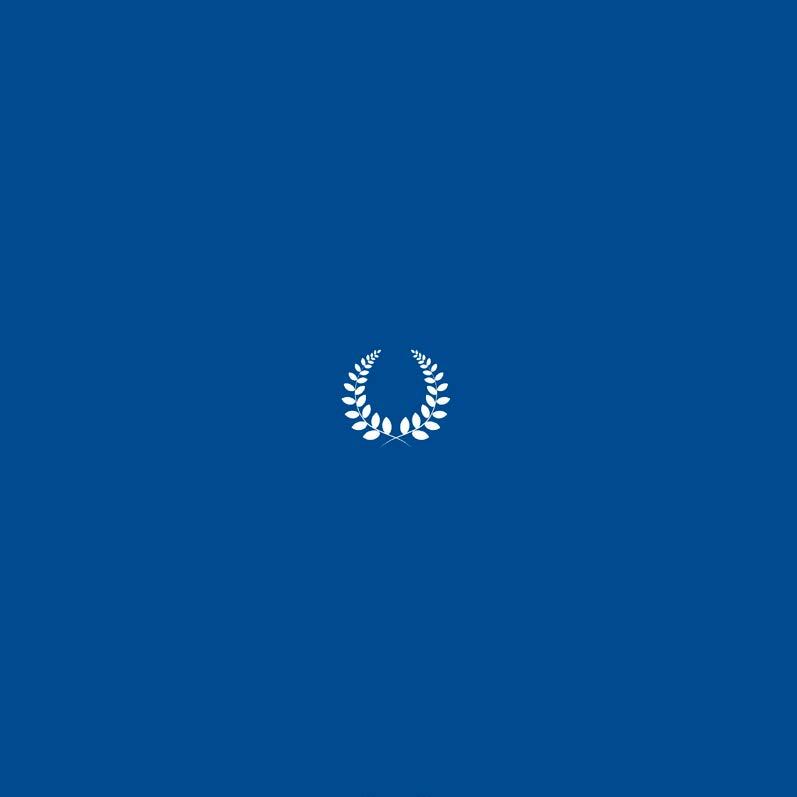
Institute for European Studies
2024 Activity Report
Published by: Prof. Karel De Gucht, IES President
Compiled and edited by Anthony Antoine, Jurgen Smet and Maja Kovacevic
With the kind assistance of all the researchers and secretariat staff at the IES.
All pictures courtesy of IES and VUB.